The effectiveness of social media platforms (Facebook and Twitter) in promoting marketing strategies of an organization: A case study of JW Marriott Hotels & Resorts
VerifiedAdded on 2023/04/25
|36
|9480
|172
AI Summary
This dissertation focuses on the effectiveness of social media platforms in promoting marketing strategies of an organization, with a case study of JW Marriott Hotels & Resorts. The aim is to analyze the impact of social media platforms on the marketing strategies of the hotel chain and how they utilize Facebook and Twitter to improve their relations with customers.
Contribute Materials
Your contribution can guide someone’s learning journey. Share your
documents today.
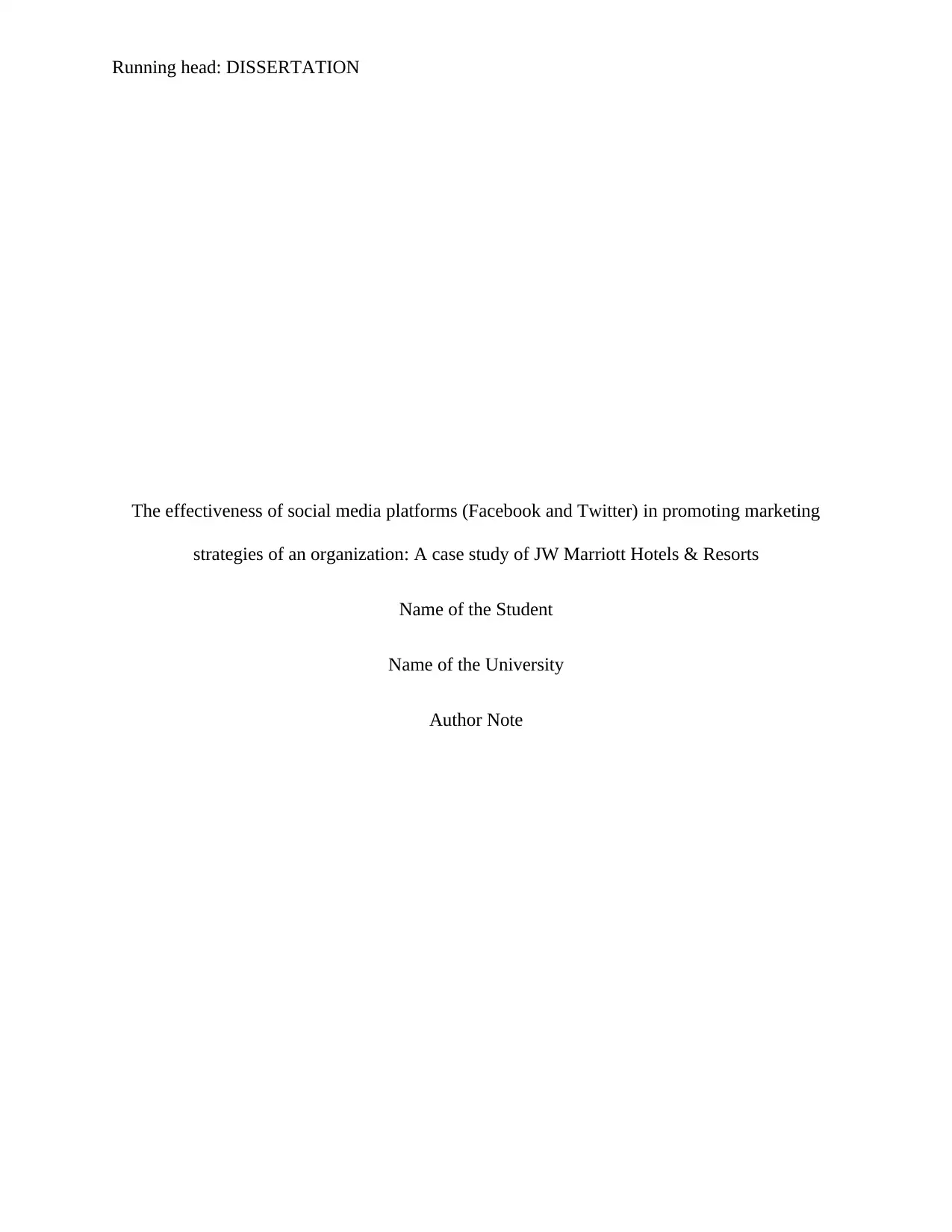
Running head: DISSERTATION
The effectiveness of social media platforms (Facebook and Twitter) in promoting marketing
strategies of an organization: A case study of JW Marriott Hotels & Resorts
Name of the Student
Name of the University
Author Note
The effectiveness of social media platforms (Facebook and Twitter) in promoting marketing
strategies of an organization: A case study of JW Marriott Hotels & Resorts
Name of the Student
Name of the University
Author Note
Secure Best Marks with AI Grader
Need help grading? Try our AI Grader for instant feedback on your assignments.
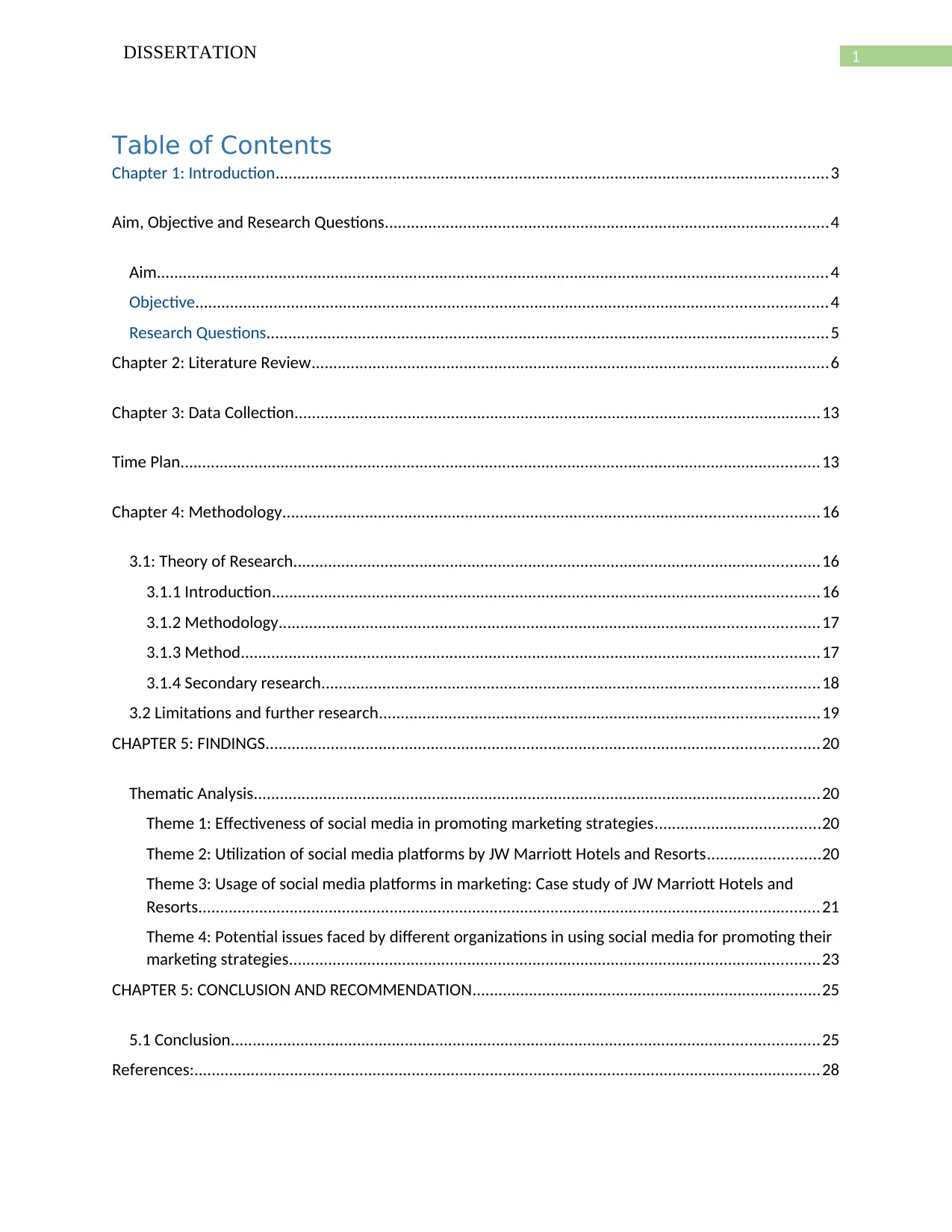
1DISSERTATION
Table of Contents
Chapter 1: Introduction...............................................................................................................................3
Aim, Objective and Research Questions......................................................................................................4
Aim..........................................................................................................................................................4
Objective.................................................................................................................................................4
Research Questions.................................................................................................................................5
Chapter 2: Literature Review.......................................................................................................................6
Chapter 3: Data Collection.........................................................................................................................13
Time Plan...................................................................................................................................................13
Chapter 4: Methodology...........................................................................................................................16
3.1: Theory of Research.........................................................................................................................16
3.1.1 Introduction..............................................................................................................................16
3.1.2 Methodology............................................................................................................................17
3.1.3 Method.....................................................................................................................................17
3.1.4 Secondary research..................................................................................................................18
3.2 Limitations and further research.....................................................................................................19
CHAPTER 5: FINDINGS...............................................................................................................................20
Thematic Analysis..................................................................................................................................20
Theme 1: Effectiveness of social media in promoting marketing strategies......................................20
Theme 2: Utilization of social media platforms by JW Marriott Hotels and Resorts..........................20
Theme 3: Usage of social media platforms in marketing: Case study of JW Marriott Hotels and
Resorts...............................................................................................................................................21
Theme 4: Potential issues faced by different organizations in using social media for promoting their
marketing strategies..........................................................................................................................23
CHAPTER 5: CONCLUSION AND RECOMMENDATION................................................................................25
5.1 Conclusion.......................................................................................................................................25
References:................................................................................................................................................28
Table of Contents
Chapter 1: Introduction...............................................................................................................................3
Aim, Objective and Research Questions......................................................................................................4
Aim..........................................................................................................................................................4
Objective.................................................................................................................................................4
Research Questions.................................................................................................................................5
Chapter 2: Literature Review.......................................................................................................................6
Chapter 3: Data Collection.........................................................................................................................13
Time Plan...................................................................................................................................................13
Chapter 4: Methodology...........................................................................................................................16
3.1: Theory of Research.........................................................................................................................16
3.1.1 Introduction..............................................................................................................................16
3.1.2 Methodology............................................................................................................................17
3.1.3 Method.....................................................................................................................................17
3.1.4 Secondary research..................................................................................................................18
3.2 Limitations and further research.....................................................................................................19
CHAPTER 5: FINDINGS...............................................................................................................................20
Thematic Analysis..................................................................................................................................20
Theme 1: Effectiveness of social media in promoting marketing strategies......................................20
Theme 2: Utilization of social media platforms by JW Marriott Hotels and Resorts..........................20
Theme 3: Usage of social media platforms in marketing: Case study of JW Marriott Hotels and
Resorts...............................................................................................................................................21
Theme 4: Potential issues faced by different organizations in using social media for promoting their
marketing strategies..........................................................................................................................23
CHAPTER 5: CONCLUSION AND RECOMMENDATION................................................................................25
5.1 Conclusion.......................................................................................................................................25
References:................................................................................................................................................28
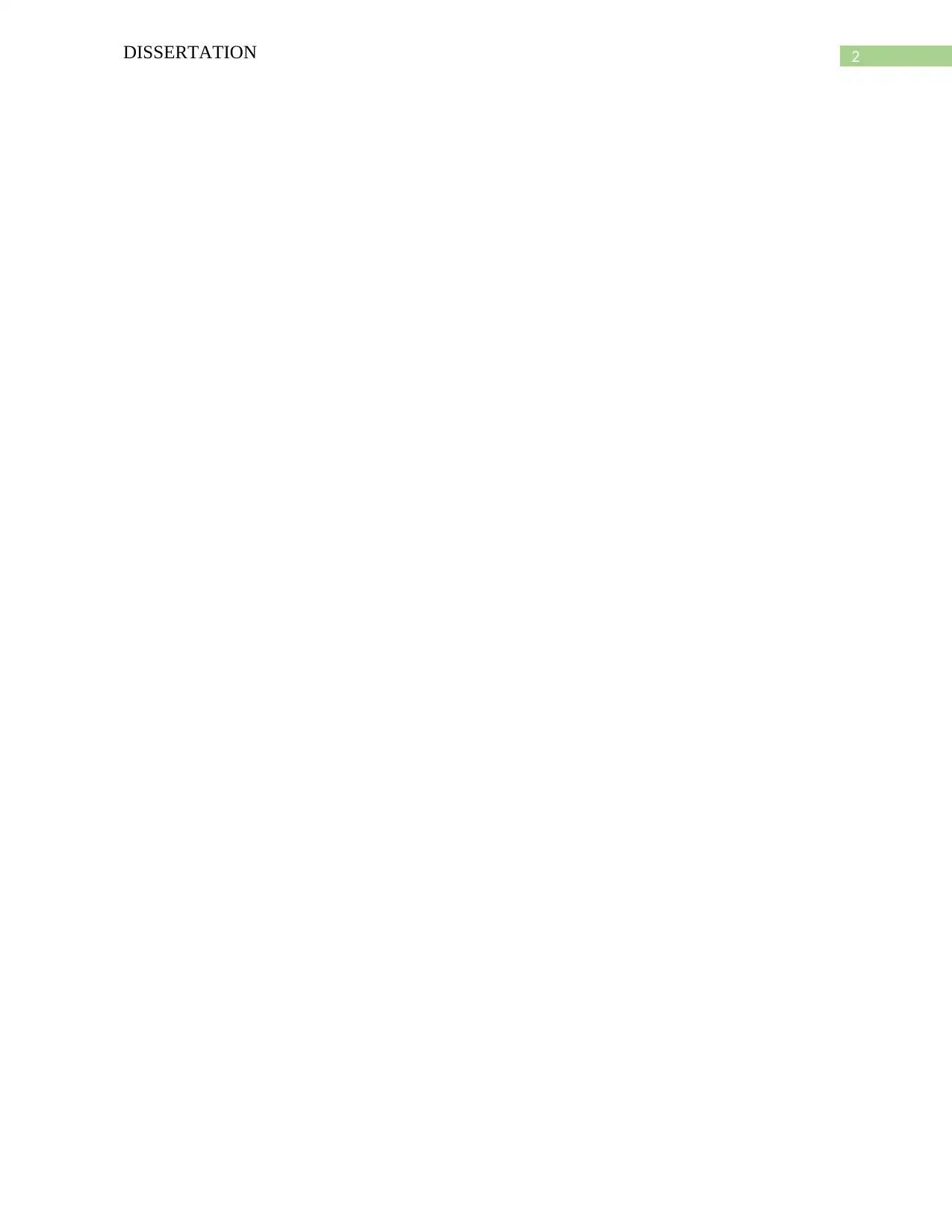
2DISSERTATION
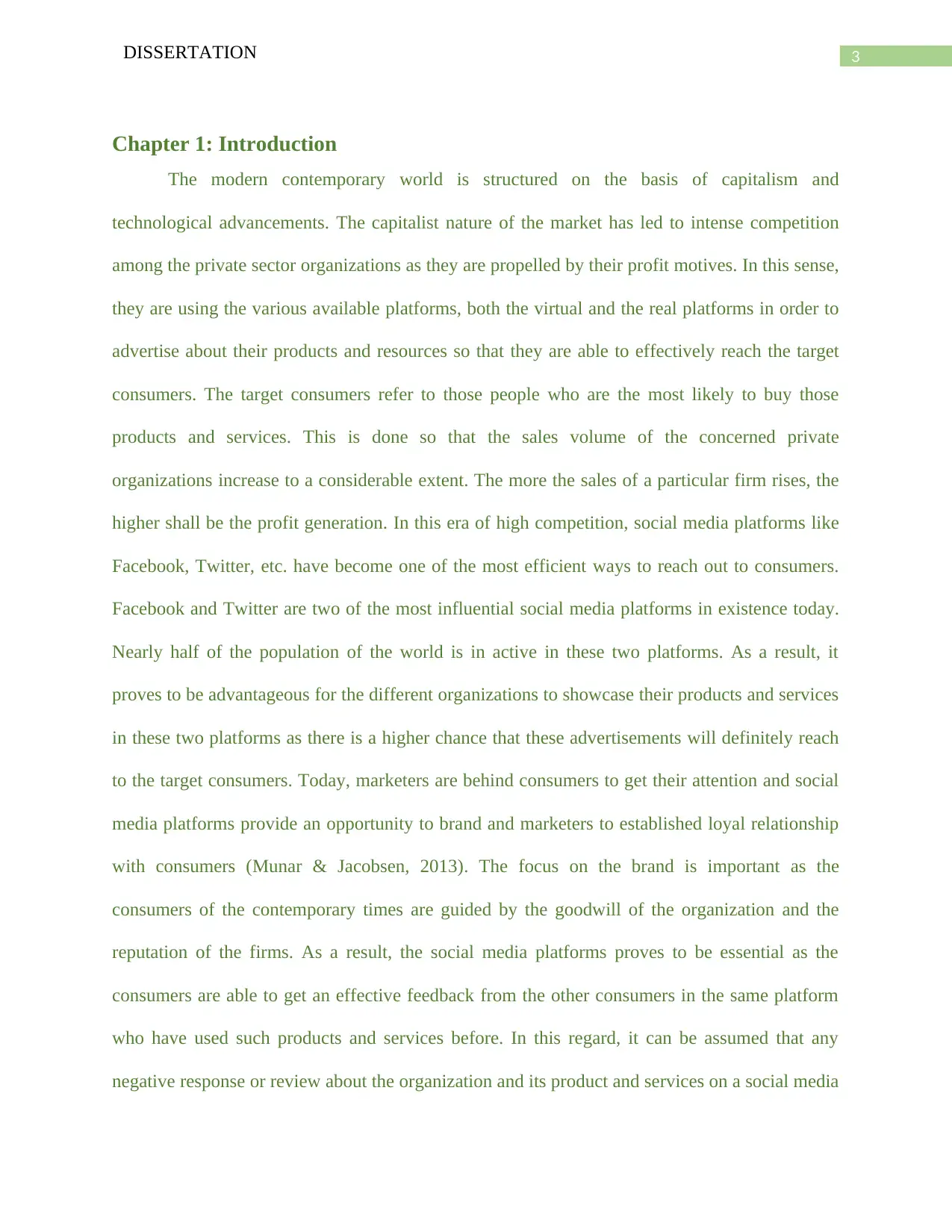
3DISSERTATION
Chapter 1: Introduction
The modern contemporary world is structured on the basis of capitalism and
technological advancements. The capitalist nature of the market has led to intense competition
among the private sector organizations as they are propelled by their profit motives. In this sense,
they are using the various available platforms, both the virtual and the real platforms in order to
advertise about their products and resources so that they are able to effectively reach the target
consumers. The target consumers refer to those people who are the most likely to buy those
products and services. This is done so that the sales volume of the concerned private
organizations increase to a considerable extent. The more the sales of a particular firm rises, the
higher shall be the profit generation. In this era of high competition, social media platforms like
Facebook, Twitter, etc. have become one of the most efficient ways to reach out to consumers.
Facebook and Twitter are two of the most influential social media platforms in existence today.
Nearly half of the population of the world is in active in these two platforms. As a result, it
proves to be advantageous for the different organizations to showcase their products and services
in these two platforms as there is a higher chance that these advertisements will definitely reach
to the target consumers. Today, marketers are behind consumers to get their attention and social
media platforms provide an opportunity to brand and marketers to established loyal relationship
with consumers (Munar & Jacobsen, 2013). The focus on the brand is important as the
consumers of the contemporary times are guided by the goodwill of the organization and the
reputation of the firms. As a result, the social media platforms proves to be essential as the
consumers are able to get an effective feedback from the other consumers in the same platform
who have used such products and services before. In this regard, it can be assumed that any
negative response or review about the organization and its product and services on a social media
Chapter 1: Introduction
The modern contemporary world is structured on the basis of capitalism and
technological advancements. The capitalist nature of the market has led to intense competition
among the private sector organizations as they are propelled by their profit motives. In this sense,
they are using the various available platforms, both the virtual and the real platforms in order to
advertise about their products and resources so that they are able to effectively reach the target
consumers. The target consumers refer to those people who are the most likely to buy those
products and services. This is done so that the sales volume of the concerned private
organizations increase to a considerable extent. The more the sales of a particular firm rises, the
higher shall be the profit generation. In this era of high competition, social media platforms like
Facebook, Twitter, etc. have become one of the most efficient ways to reach out to consumers.
Facebook and Twitter are two of the most influential social media platforms in existence today.
Nearly half of the population of the world is in active in these two platforms. As a result, it
proves to be advantageous for the different organizations to showcase their products and services
in these two platforms as there is a higher chance that these advertisements will definitely reach
to the target consumers. Today, marketers are behind consumers to get their attention and social
media platforms provide an opportunity to brand and marketers to established loyal relationship
with consumers (Munar & Jacobsen, 2013). The focus on the brand is important as the
consumers of the contemporary times are guided by the goodwill of the organization and the
reputation of the firms. As a result, the social media platforms proves to be essential as the
consumers are able to get an effective feedback from the other consumers in the same platform
who have used such products and services before. In this regard, it can be assumed that any
negative response or review about the organization and its product and services on a social media
Secure Best Marks with AI Grader
Need help grading? Try our AI Grader for instant feedback on your assignments.
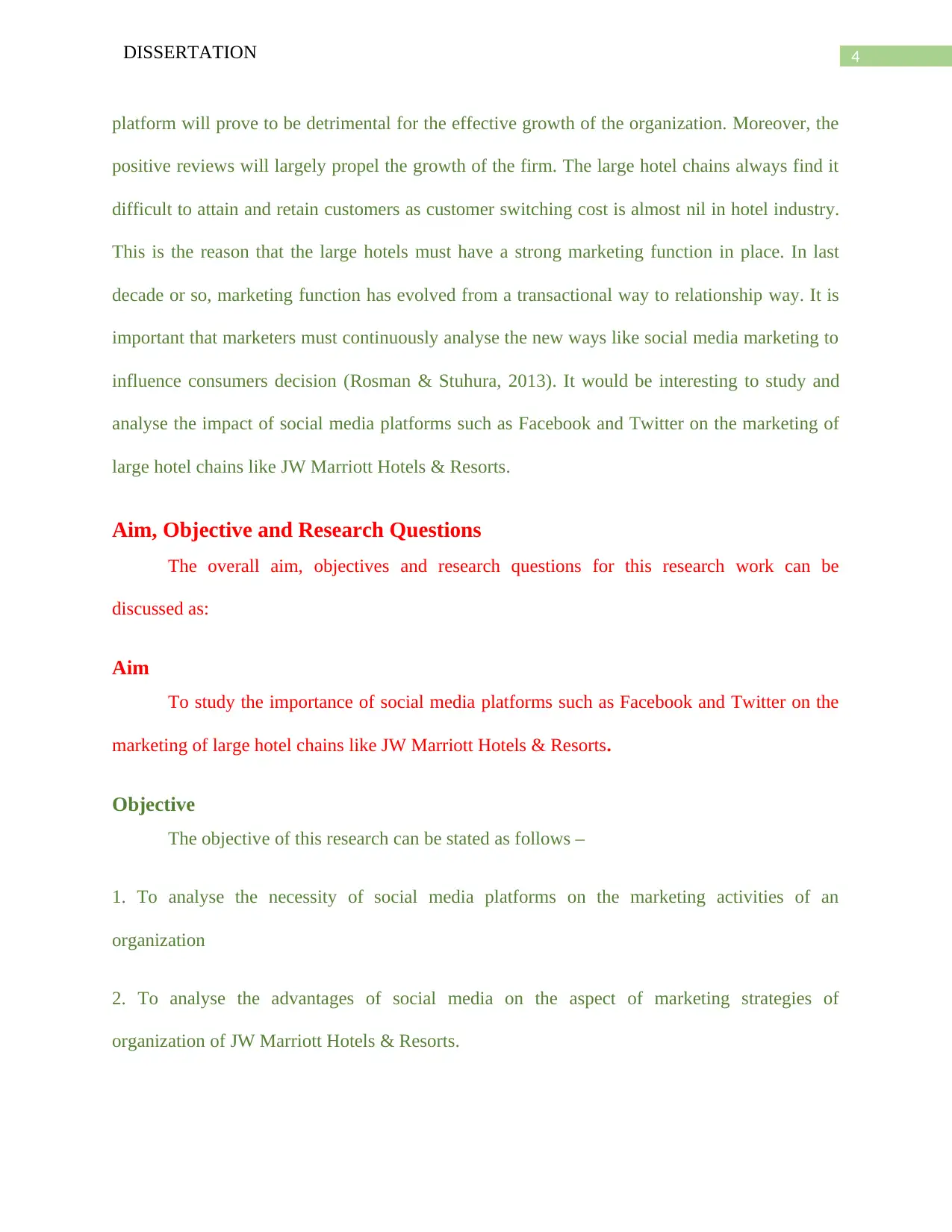
4DISSERTATION
platform will prove to be detrimental for the effective growth of the organization. Moreover, the
positive reviews will largely propel the growth of the firm. The large hotel chains always find it
difficult to attain and retain customers as customer switching cost is almost nil in hotel industry.
This is the reason that the large hotels must have a strong marketing function in place. In last
decade or so, marketing function has evolved from a transactional way to relationship way. It is
important that marketers must continuously analyse the new ways like social media marketing to
influence consumers decision (Rosman & Stuhura, 2013). It would be interesting to study and
analyse the impact of social media platforms such as Facebook and Twitter on the marketing of
large hotel chains like JW Marriott Hotels & Resorts.
Aim, Objective and Research Questions
The overall aim, objectives and research questions for this research work can be
discussed as:
Aim
To study the importance of social media platforms such as Facebook and Twitter on the
marketing of large hotel chains like JW Marriott Hotels & Resorts.
Objective
The objective of this research can be stated as follows –
1. To analyse the necessity of social media platforms on the marketing activities of an
organization
2. To analyse the advantages of social media on the aspect of marketing strategies of
organization of JW Marriott Hotels & Resorts.
platform will prove to be detrimental for the effective growth of the organization. Moreover, the
positive reviews will largely propel the growth of the firm. The large hotel chains always find it
difficult to attain and retain customers as customer switching cost is almost nil in hotel industry.
This is the reason that the large hotels must have a strong marketing function in place. In last
decade or so, marketing function has evolved from a transactional way to relationship way. It is
important that marketers must continuously analyse the new ways like social media marketing to
influence consumers decision (Rosman & Stuhura, 2013). It would be interesting to study and
analyse the impact of social media platforms such as Facebook and Twitter on the marketing of
large hotel chains like JW Marriott Hotels & Resorts.
Aim, Objective and Research Questions
The overall aim, objectives and research questions for this research work can be
discussed as:
Aim
To study the importance of social media platforms such as Facebook and Twitter on the
marketing of large hotel chains like JW Marriott Hotels & Resorts.
Objective
The objective of this research can be stated as follows –
1. To analyse the necessity of social media platforms on the marketing activities of an
organization
2. To analyse the advantages of social media on the aspect of marketing strategies of
organization of JW Marriott Hotels & Resorts.
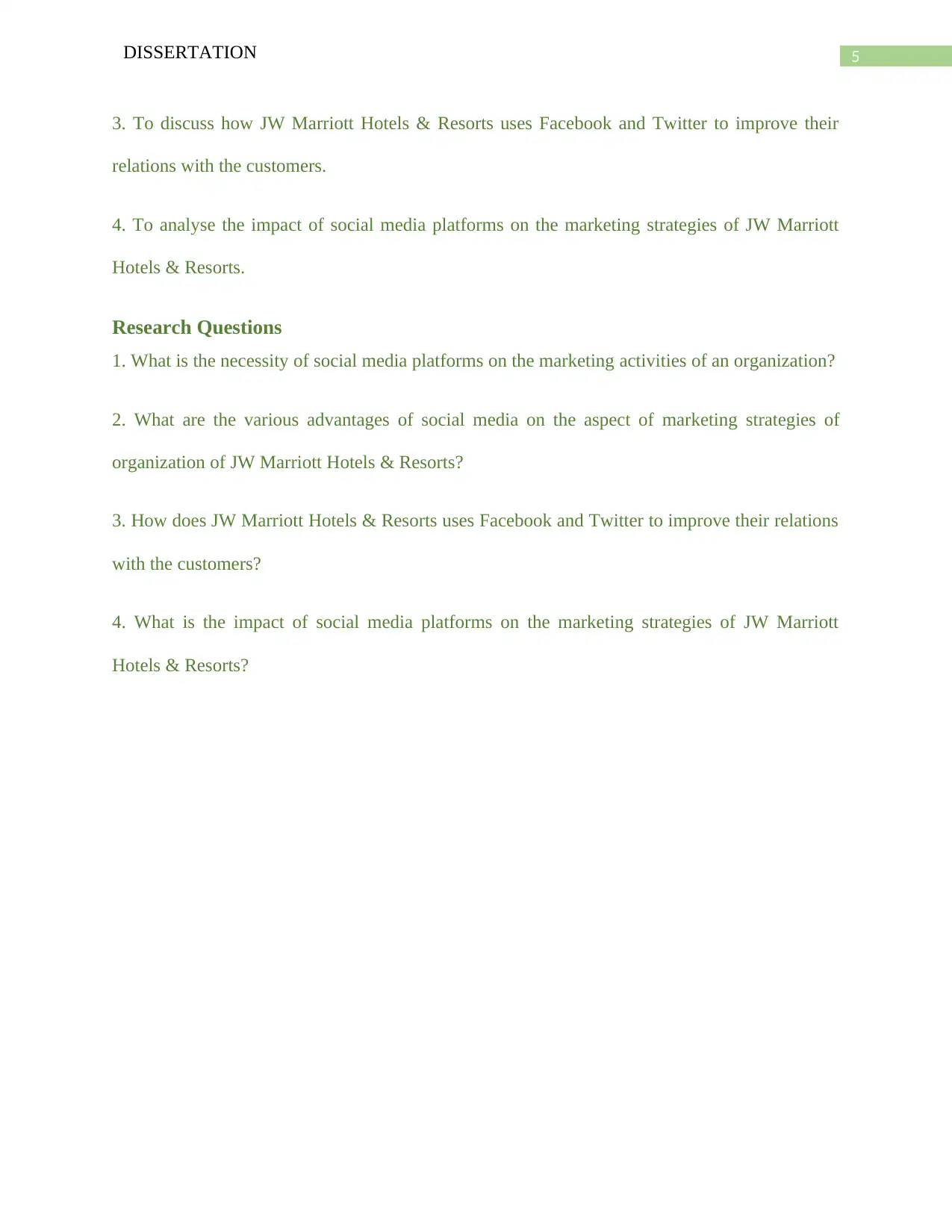
5DISSERTATION
3. To discuss how JW Marriott Hotels & Resorts uses Facebook and Twitter to improve their
relations with the customers.
4. To analyse the impact of social media platforms on the marketing strategies of JW Marriott
Hotels & Resorts.
Research Questions
1. What is the necessity of social media platforms on the marketing activities of an organization?
2. What are the various advantages of social media on the aspect of marketing strategies of
organization of JW Marriott Hotels & Resorts?
3. How does JW Marriott Hotels & Resorts uses Facebook and Twitter to improve their relations
with the customers?
4. What is the impact of social media platforms on the marketing strategies of JW Marriott
Hotels & Resorts?
3. To discuss how JW Marriott Hotels & Resorts uses Facebook and Twitter to improve their
relations with the customers.
4. To analyse the impact of social media platforms on the marketing strategies of JW Marriott
Hotels & Resorts.
Research Questions
1. What is the necessity of social media platforms on the marketing activities of an organization?
2. What are the various advantages of social media on the aspect of marketing strategies of
organization of JW Marriott Hotels & Resorts?
3. How does JW Marriott Hotels & Resorts uses Facebook and Twitter to improve their relations
with the customers?
4. What is the impact of social media platforms on the marketing strategies of JW Marriott
Hotels & Resorts?
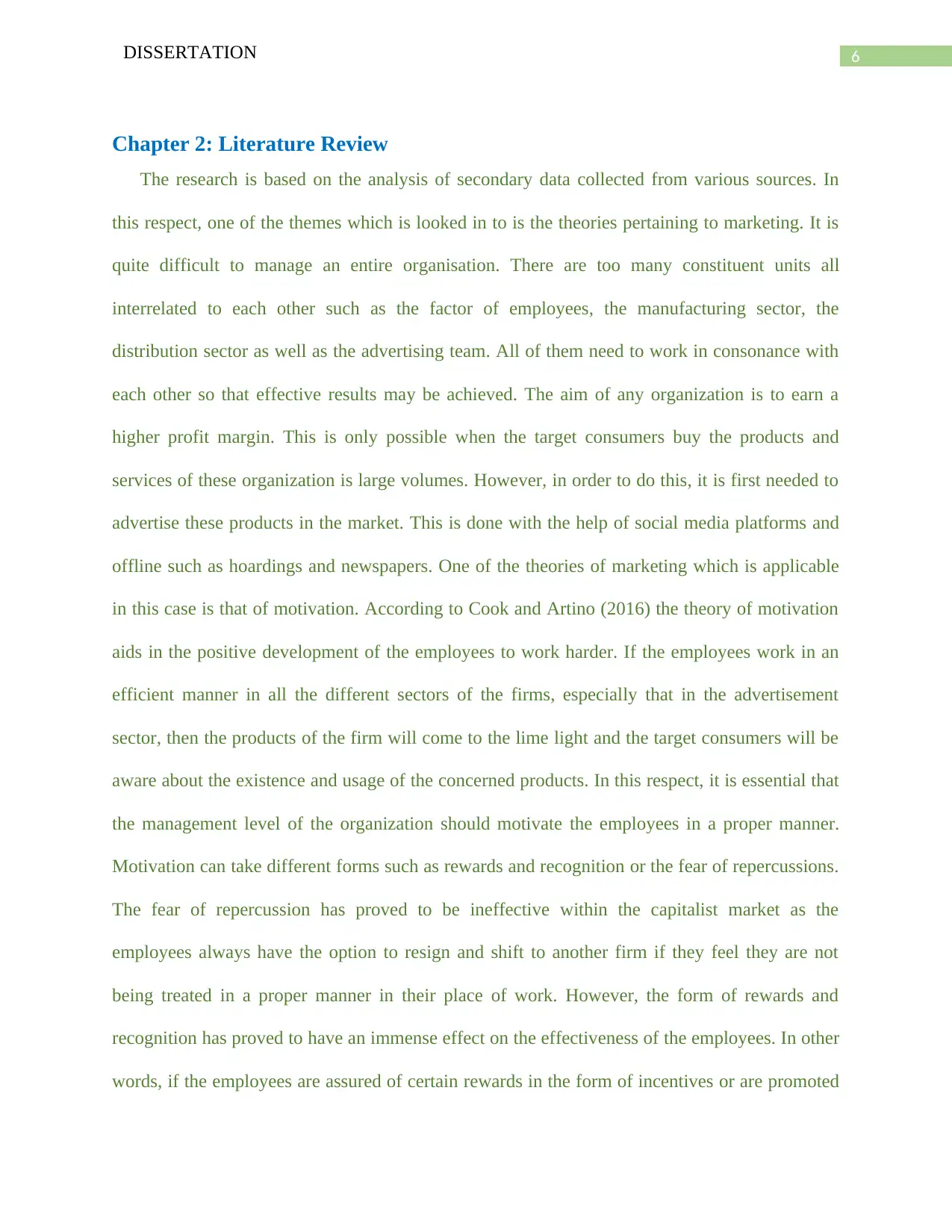
6DISSERTATION
Chapter 2: Literature Review
The research is based on the analysis of secondary data collected from various sources. In
this respect, one of the themes which is looked in to is the theories pertaining to marketing. It is
quite difficult to manage an entire organisation. There are too many constituent units all
interrelated to each other such as the factor of employees, the manufacturing sector, the
distribution sector as well as the advertising team. All of them need to work in consonance with
each other so that effective results may be achieved. The aim of any organization is to earn a
higher profit margin. This is only possible when the target consumers buy the products and
services of these organization is large volumes. However, in order to do this, it is first needed to
advertise these products in the market. This is done with the help of social media platforms and
offline such as hoardings and newspapers. One of the theories of marketing which is applicable
in this case is that of motivation. According to Cook and Artino (2016) the theory of motivation
aids in the positive development of the employees to work harder. If the employees work in an
efficient manner in all the different sectors of the firms, especially that in the advertisement
sector, then the products of the firm will come to the lime light and the target consumers will be
aware about the existence and usage of the concerned products. In this respect, it is essential that
the management level of the organization should motivate the employees in a proper manner.
Motivation can take different forms such as rewards and recognition or the fear of repercussions.
The fear of repercussion has proved to be ineffective within the capitalist market as the
employees always have the option to resign and shift to another firm if they feel they are not
being treated in a proper manner in their place of work. However, the form of rewards and
recognition has proved to have an immense effect on the effectiveness of the employees. In other
words, if the employees are assured of certain rewards in the form of incentives or are promoted
Chapter 2: Literature Review
The research is based on the analysis of secondary data collected from various sources. In
this respect, one of the themes which is looked in to is the theories pertaining to marketing. It is
quite difficult to manage an entire organisation. There are too many constituent units all
interrelated to each other such as the factor of employees, the manufacturing sector, the
distribution sector as well as the advertising team. All of them need to work in consonance with
each other so that effective results may be achieved. The aim of any organization is to earn a
higher profit margin. This is only possible when the target consumers buy the products and
services of these organization is large volumes. However, in order to do this, it is first needed to
advertise these products in the market. This is done with the help of social media platforms and
offline such as hoardings and newspapers. One of the theories of marketing which is applicable
in this case is that of motivation. According to Cook and Artino (2016) the theory of motivation
aids in the positive development of the employees to work harder. If the employees work in an
efficient manner in all the different sectors of the firms, especially that in the advertisement
sector, then the products of the firm will come to the lime light and the target consumers will be
aware about the existence and usage of the concerned products. In this respect, it is essential that
the management level of the organization should motivate the employees in a proper manner.
Motivation can take different forms such as rewards and recognition or the fear of repercussions.
The fear of repercussion has proved to be ineffective within the capitalist market as the
employees always have the option to resign and shift to another firm if they feel they are not
being treated in a proper manner in their place of work. However, the form of rewards and
recognition has proved to have an immense effect on the effectiveness of the employees. In other
words, if the employees are assured of certain rewards in the form of incentives or are promoted
Paraphrase This Document
Need a fresh take? Get an instant paraphrase of this document with our AI Paraphraser
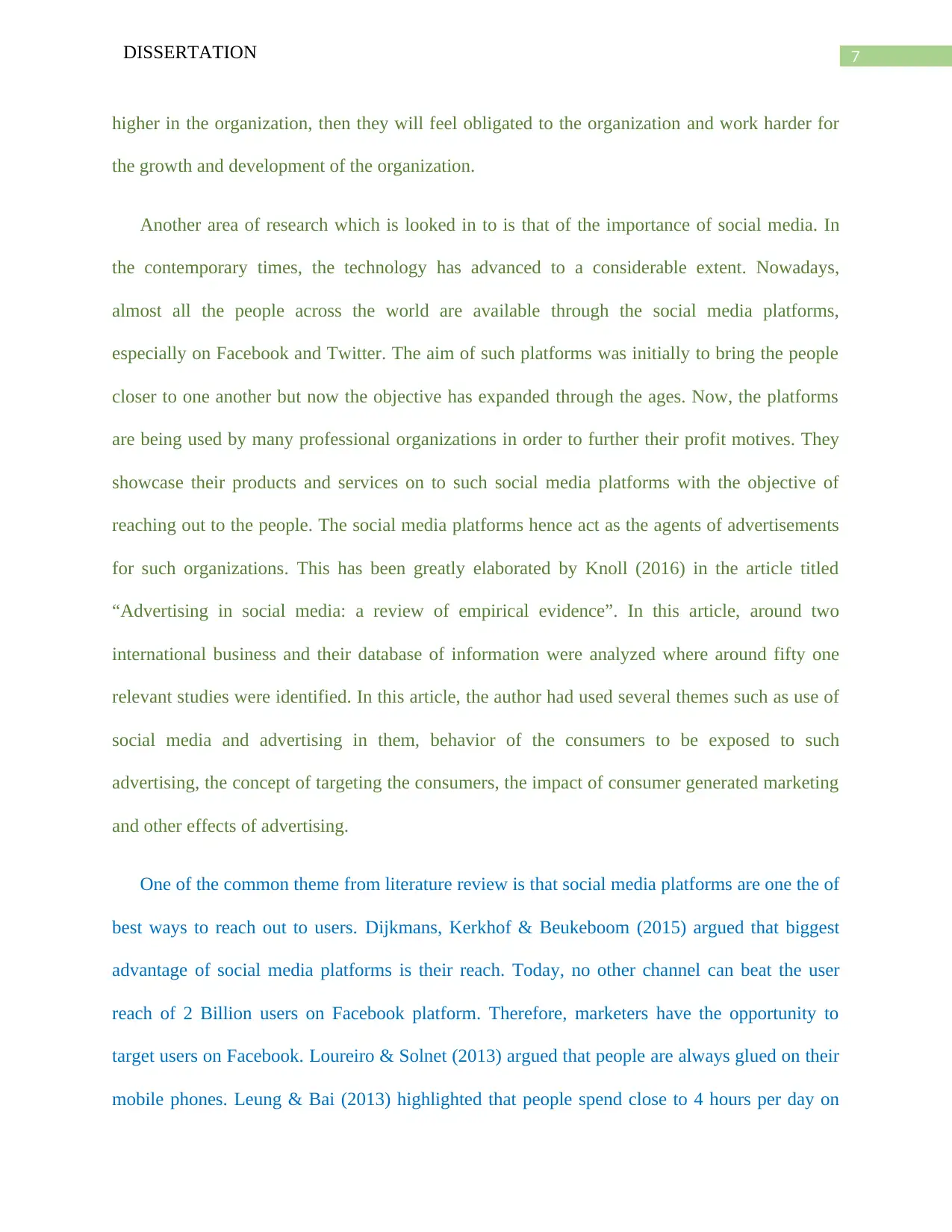
7DISSERTATION
higher in the organization, then they will feel obligated to the organization and work harder for
the growth and development of the organization.
Another area of research which is looked in to is that of the importance of social media. In
the contemporary times, the technology has advanced to a considerable extent. Nowadays,
almost all the people across the world are available through the social media platforms,
especially on Facebook and Twitter. The aim of such platforms was initially to bring the people
closer to one another but now the objective has expanded through the ages. Now, the platforms
are being used by many professional organizations in order to further their profit motives. They
showcase their products and services on to such social media platforms with the objective of
reaching out to the people. The social media platforms hence act as the agents of advertisements
for such organizations. This has been greatly elaborated by Knoll (2016) in the article titled
“Advertising in social media: a review of empirical evidence”. In this article, around two
international business and their database of information were analyzed where around fifty one
relevant studies were identified. In this article, the author had used several themes such as use of
social media and advertising in them, behavior of the consumers to be exposed to such
advertising, the concept of targeting the consumers, the impact of consumer generated marketing
and other effects of advertising.
One of the common theme from literature review is that social media platforms are one the of
best ways to reach out to users. Dijkmans, Kerkhof & Beukeboom (2015) argued that biggest
advantage of social media platforms is their reach. Today, no other channel can beat the user
reach of 2 Billion users on Facebook platform. Therefore, marketers have the opportunity to
target users on Facebook. Loureiro & Solnet (2013) argued that people are always glued on their
mobile phones. Leung & Bai (2013) highlighted that people spend close to 4 hours per day on
higher in the organization, then they will feel obligated to the organization and work harder for
the growth and development of the organization.
Another area of research which is looked in to is that of the importance of social media. In
the contemporary times, the technology has advanced to a considerable extent. Nowadays,
almost all the people across the world are available through the social media platforms,
especially on Facebook and Twitter. The aim of such platforms was initially to bring the people
closer to one another but now the objective has expanded through the ages. Now, the platforms
are being used by many professional organizations in order to further their profit motives. They
showcase their products and services on to such social media platforms with the objective of
reaching out to the people. The social media platforms hence act as the agents of advertisements
for such organizations. This has been greatly elaborated by Knoll (2016) in the article titled
“Advertising in social media: a review of empirical evidence”. In this article, around two
international business and their database of information were analyzed where around fifty one
relevant studies were identified. In this article, the author had used several themes such as use of
social media and advertising in them, behavior of the consumers to be exposed to such
advertising, the concept of targeting the consumers, the impact of consumer generated marketing
and other effects of advertising.
One of the common theme from literature review is that social media platforms are one the of
best ways to reach out to users. Dijkmans, Kerkhof & Beukeboom (2015) argued that biggest
advantage of social media platforms is their reach. Today, no other channel can beat the user
reach of 2 Billion users on Facebook platform. Therefore, marketers have the opportunity to
target users on Facebook. Loureiro & Solnet (2013) argued that people are always glued on their
mobile phones. Leung & Bai (2013) highlighted that people spend close to 4 hours per day on
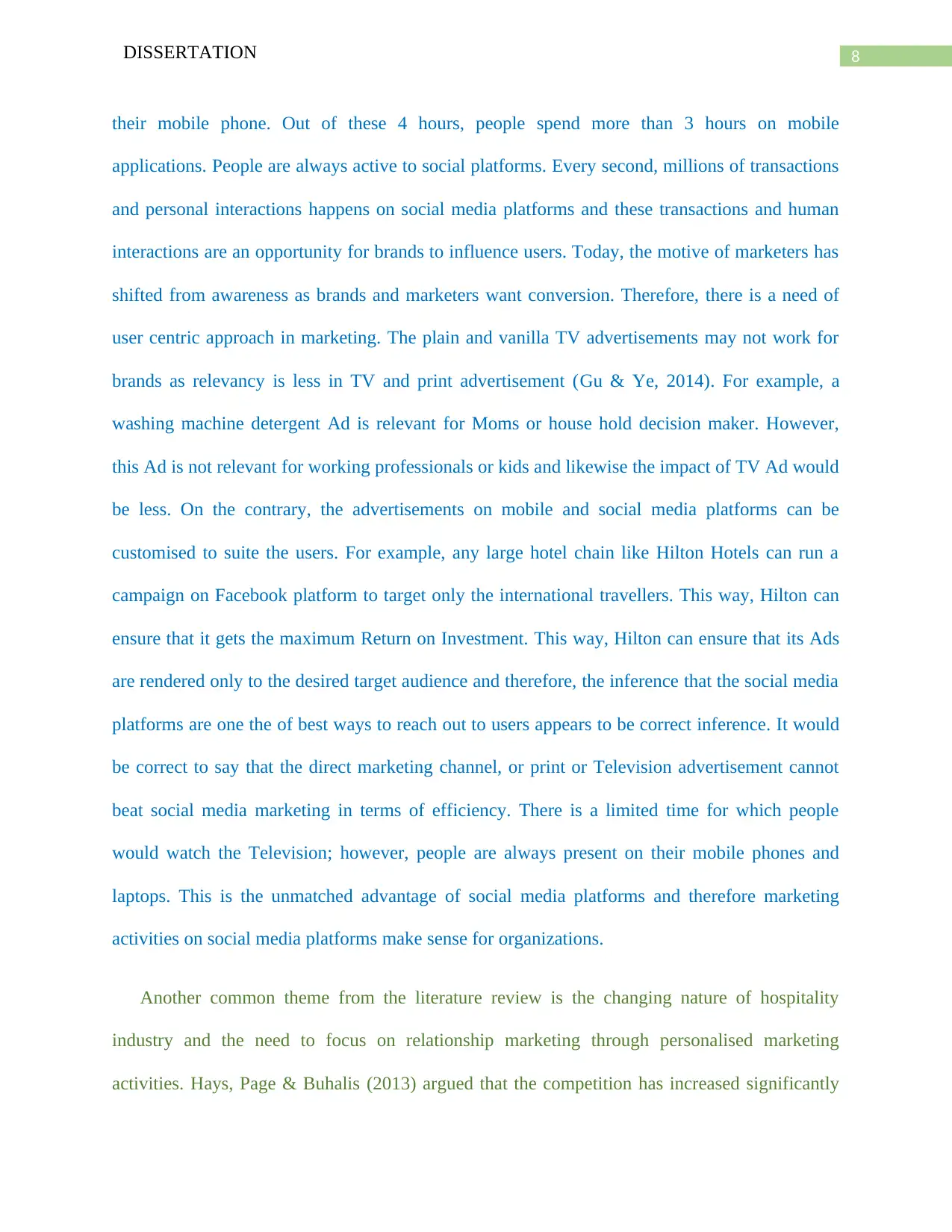
8DISSERTATION
their mobile phone. Out of these 4 hours, people spend more than 3 hours on mobile
applications. People are always active to social platforms. Every second, millions of transactions
and personal interactions happens on social media platforms and these transactions and human
interactions are an opportunity for brands to influence users. Today, the motive of marketers has
shifted from awareness as brands and marketers want conversion. Therefore, there is a need of
user centric approach in marketing. The plain and vanilla TV advertisements may not work for
brands as relevancy is less in TV and print advertisement (Gu & Ye, 2014). For example, a
washing machine detergent Ad is relevant for Moms or house hold decision maker. However,
this Ad is not relevant for working professionals or kids and likewise the impact of TV Ad would
be less. On the contrary, the advertisements on mobile and social media platforms can be
customised to suite the users. For example, any large hotel chain like Hilton Hotels can run a
campaign on Facebook platform to target only the international travellers. This way, Hilton can
ensure that it gets the maximum Return on Investment. This way, Hilton can ensure that its Ads
are rendered only to the desired target audience and therefore, the inference that the social media
platforms are one the of best ways to reach out to users appears to be correct inference. It would
be correct to say that the direct marketing channel, or print or Television advertisement cannot
beat social media marketing in terms of efficiency. There is a limited time for which people
would watch the Television; however, people are always present on their mobile phones and
laptops. This is the unmatched advantage of social media platforms and therefore marketing
activities on social media platforms make sense for organizations.
Another common theme from the literature review is the changing nature of hospitality
industry and the need to focus on relationship marketing through personalised marketing
activities. Hays, Page & Buhalis (2013) argued that the competition has increased significantly
their mobile phone. Out of these 4 hours, people spend more than 3 hours on mobile
applications. People are always active to social platforms. Every second, millions of transactions
and personal interactions happens on social media platforms and these transactions and human
interactions are an opportunity for brands to influence users. Today, the motive of marketers has
shifted from awareness as brands and marketers want conversion. Therefore, there is a need of
user centric approach in marketing. The plain and vanilla TV advertisements may not work for
brands as relevancy is less in TV and print advertisement (Gu & Ye, 2014). For example, a
washing machine detergent Ad is relevant for Moms or house hold decision maker. However,
this Ad is not relevant for working professionals or kids and likewise the impact of TV Ad would
be less. On the contrary, the advertisements on mobile and social media platforms can be
customised to suite the users. For example, any large hotel chain like Hilton Hotels can run a
campaign on Facebook platform to target only the international travellers. This way, Hilton can
ensure that it gets the maximum Return on Investment. This way, Hilton can ensure that its Ads
are rendered only to the desired target audience and therefore, the inference that the social media
platforms are one the of best ways to reach out to users appears to be correct inference. It would
be correct to say that the direct marketing channel, or print or Television advertisement cannot
beat social media marketing in terms of efficiency. There is a limited time for which people
would watch the Television; however, people are always present on their mobile phones and
laptops. This is the unmatched advantage of social media platforms and therefore marketing
activities on social media platforms make sense for organizations.
Another common theme from the literature review is the changing nature of hospitality
industry and the need to focus on relationship marketing through personalised marketing
activities. Hays, Page & Buhalis (2013) argued that the competition has increased significantly
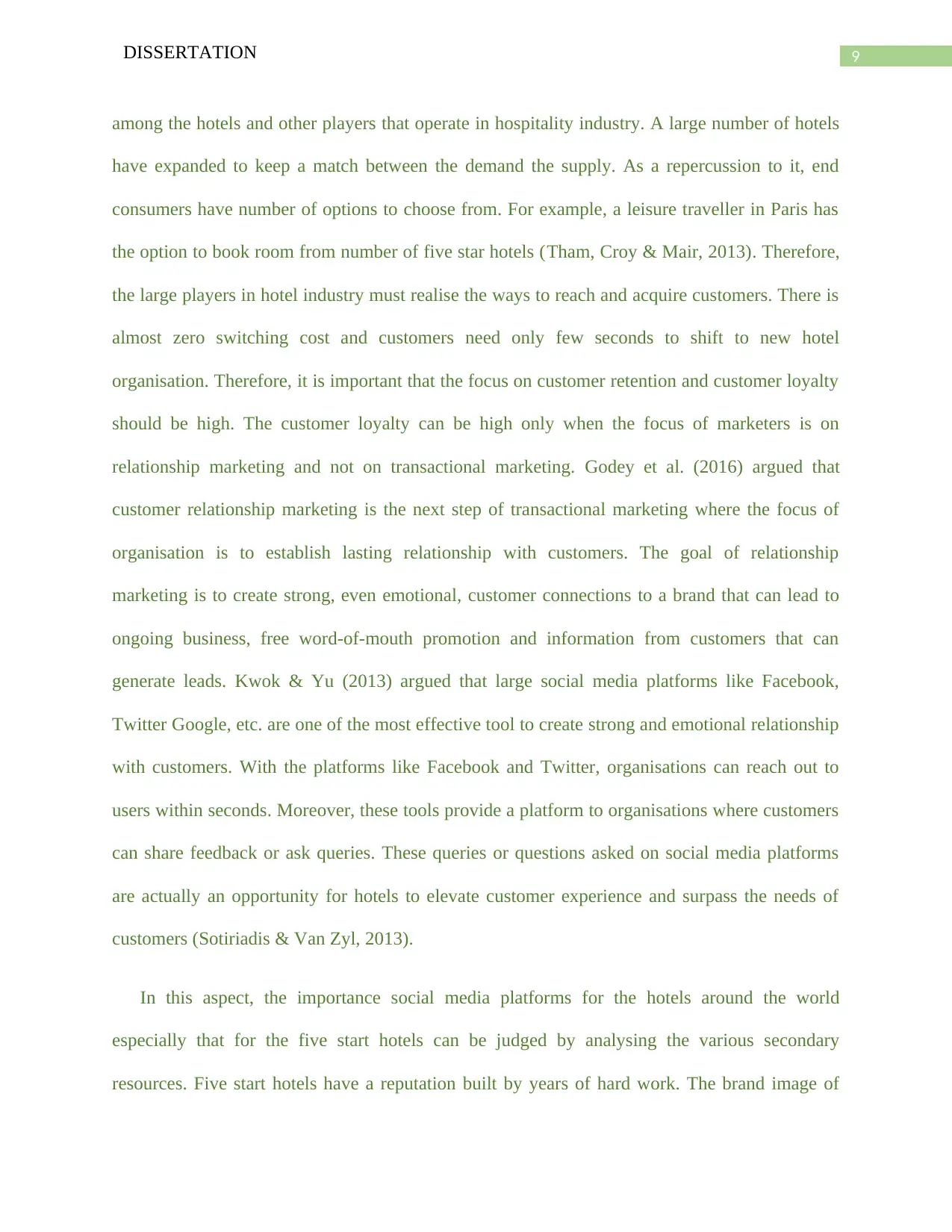
9DISSERTATION
among the hotels and other players that operate in hospitality industry. A large number of hotels
have expanded to keep a match between the demand the supply. As a repercussion to it, end
consumers have number of options to choose from. For example, a leisure traveller in Paris has
the option to book room from number of five star hotels (Tham, Croy & Mair, 2013). Therefore,
the large players in hotel industry must realise the ways to reach and acquire customers. There is
almost zero switching cost and customers need only few seconds to shift to new hotel
organisation. Therefore, it is important that the focus on customer retention and customer loyalty
should be high. The customer loyalty can be high only when the focus of marketers is on
relationship marketing and not on transactional marketing. Godey et al. (2016) argued that
customer relationship marketing is the next step of transactional marketing where the focus of
organisation is to establish lasting relationship with customers. The goal of relationship
marketing is to create strong, even emotional, customer connections to a brand that can lead to
ongoing business, free word-of-mouth promotion and information from customers that can
generate leads. Kwok & Yu (2013) argued that large social media platforms like Facebook,
Twitter Google, etc. are one of the most effective tool to create strong and emotional relationship
with customers. With the platforms like Facebook and Twitter, organisations can reach out to
users within seconds. Moreover, these tools provide a platform to organisations where customers
can share feedback or ask queries. These queries or questions asked on social media platforms
are actually an opportunity for hotels to elevate customer experience and surpass the needs of
customers (Sotiriadis & Van Zyl, 2013).
In this aspect, the importance social media platforms for the hotels around the world
especially that for the five start hotels can be judged by analysing the various secondary
resources. Five start hotels have a reputation built by years of hard work. The brand image of
among the hotels and other players that operate in hospitality industry. A large number of hotels
have expanded to keep a match between the demand the supply. As a repercussion to it, end
consumers have number of options to choose from. For example, a leisure traveller in Paris has
the option to book room from number of five star hotels (Tham, Croy & Mair, 2013). Therefore,
the large players in hotel industry must realise the ways to reach and acquire customers. There is
almost zero switching cost and customers need only few seconds to shift to new hotel
organisation. Therefore, it is important that the focus on customer retention and customer loyalty
should be high. The customer loyalty can be high only when the focus of marketers is on
relationship marketing and not on transactional marketing. Godey et al. (2016) argued that
customer relationship marketing is the next step of transactional marketing where the focus of
organisation is to establish lasting relationship with customers. The goal of relationship
marketing is to create strong, even emotional, customer connections to a brand that can lead to
ongoing business, free word-of-mouth promotion and information from customers that can
generate leads. Kwok & Yu (2013) argued that large social media platforms like Facebook,
Twitter Google, etc. are one of the most effective tool to create strong and emotional relationship
with customers. With the platforms like Facebook and Twitter, organisations can reach out to
users within seconds. Moreover, these tools provide a platform to organisations where customers
can share feedback or ask queries. These queries or questions asked on social media platforms
are actually an opportunity for hotels to elevate customer experience and surpass the needs of
customers (Sotiriadis & Van Zyl, 2013).
In this aspect, the importance social media platforms for the hotels around the world
especially that for the five start hotels can be judged by analysing the various secondary
resources. Five start hotels have a reputation built by years of hard work. The brand image of
Secure Best Marks with AI Grader
Need help grading? Try our AI Grader for instant feedback on your assignments.
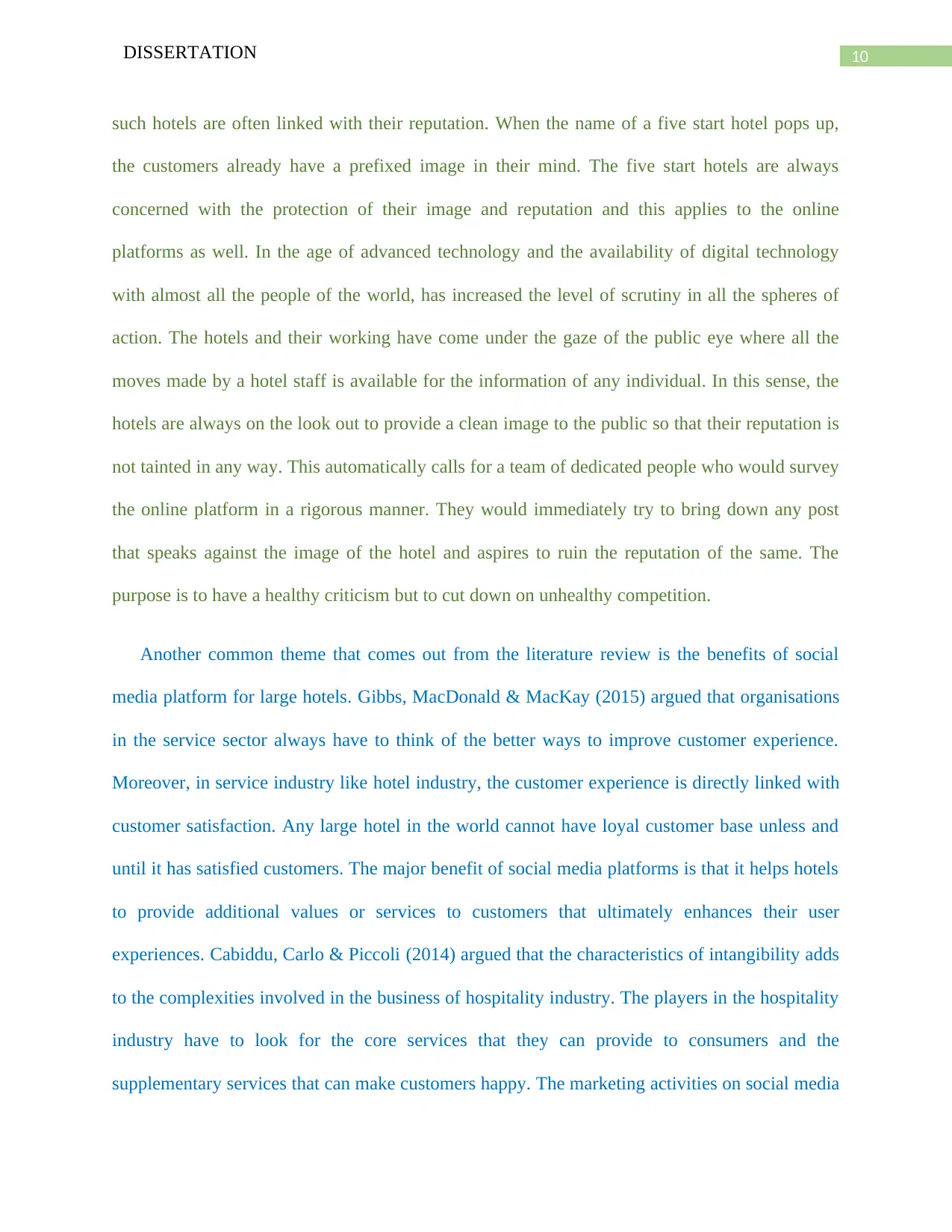
10DISSERTATION
such hotels are often linked with their reputation. When the name of a five start hotel pops up,
the customers already have a prefixed image in their mind. The five start hotels are always
concerned with the protection of their image and reputation and this applies to the online
platforms as well. In the age of advanced technology and the availability of digital technology
with almost all the people of the world, has increased the level of scrutiny in all the spheres of
action. The hotels and their working have come under the gaze of the public eye where all the
moves made by a hotel staff is available for the information of any individual. In this sense, the
hotels are always on the look out to provide a clean image to the public so that their reputation is
not tainted in any way. This automatically calls for a team of dedicated people who would survey
the online platform in a rigorous manner. They would immediately try to bring down any post
that speaks against the image of the hotel and aspires to ruin the reputation of the same. The
purpose is to have a healthy criticism but to cut down on unhealthy competition.
Another common theme that comes out from the literature review is the benefits of social
media platform for large hotels. Gibbs, MacDonald & MacKay (2015) argued that organisations
in the service sector always have to think of the better ways to improve customer experience.
Moreover, in service industry like hotel industry, the customer experience is directly linked with
customer satisfaction. Any large hotel in the world cannot have loyal customer base unless and
until it has satisfied customers. The major benefit of social media platforms is that it helps hotels
to provide additional values or services to customers that ultimately enhances their user
experiences. Cabiddu, Carlo & Piccoli (2014) argued that the characteristics of intangibility adds
to the complexities involved in the business of hospitality industry. The players in the hospitality
industry have to look for the core services that they can provide to consumers and the
supplementary services that can make customers happy. The marketing activities on social media
such hotels are often linked with their reputation. When the name of a five start hotel pops up,
the customers already have a prefixed image in their mind. The five start hotels are always
concerned with the protection of their image and reputation and this applies to the online
platforms as well. In the age of advanced technology and the availability of digital technology
with almost all the people of the world, has increased the level of scrutiny in all the spheres of
action. The hotels and their working have come under the gaze of the public eye where all the
moves made by a hotel staff is available for the information of any individual. In this sense, the
hotels are always on the look out to provide a clean image to the public so that their reputation is
not tainted in any way. This automatically calls for a team of dedicated people who would survey
the online platform in a rigorous manner. They would immediately try to bring down any post
that speaks against the image of the hotel and aspires to ruin the reputation of the same. The
purpose is to have a healthy criticism but to cut down on unhealthy competition.
Another common theme that comes out from the literature review is the benefits of social
media platform for large hotels. Gibbs, MacDonald & MacKay (2015) argued that organisations
in the service sector always have to think of the better ways to improve customer experience.
Moreover, in service industry like hotel industry, the customer experience is directly linked with
customer satisfaction. Any large hotel in the world cannot have loyal customer base unless and
until it has satisfied customers. The major benefit of social media platforms is that it helps hotels
to provide additional values or services to customers that ultimately enhances their user
experiences. Cabiddu, Carlo & Piccoli (2014) argued that the characteristics of intangibility adds
to the complexities involved in the business of hospitality industry. The players in the hospitality
industry have to look for the core services that they can provide to consumers and the
supplementary services that can make customers happy. The marketing activities on social media
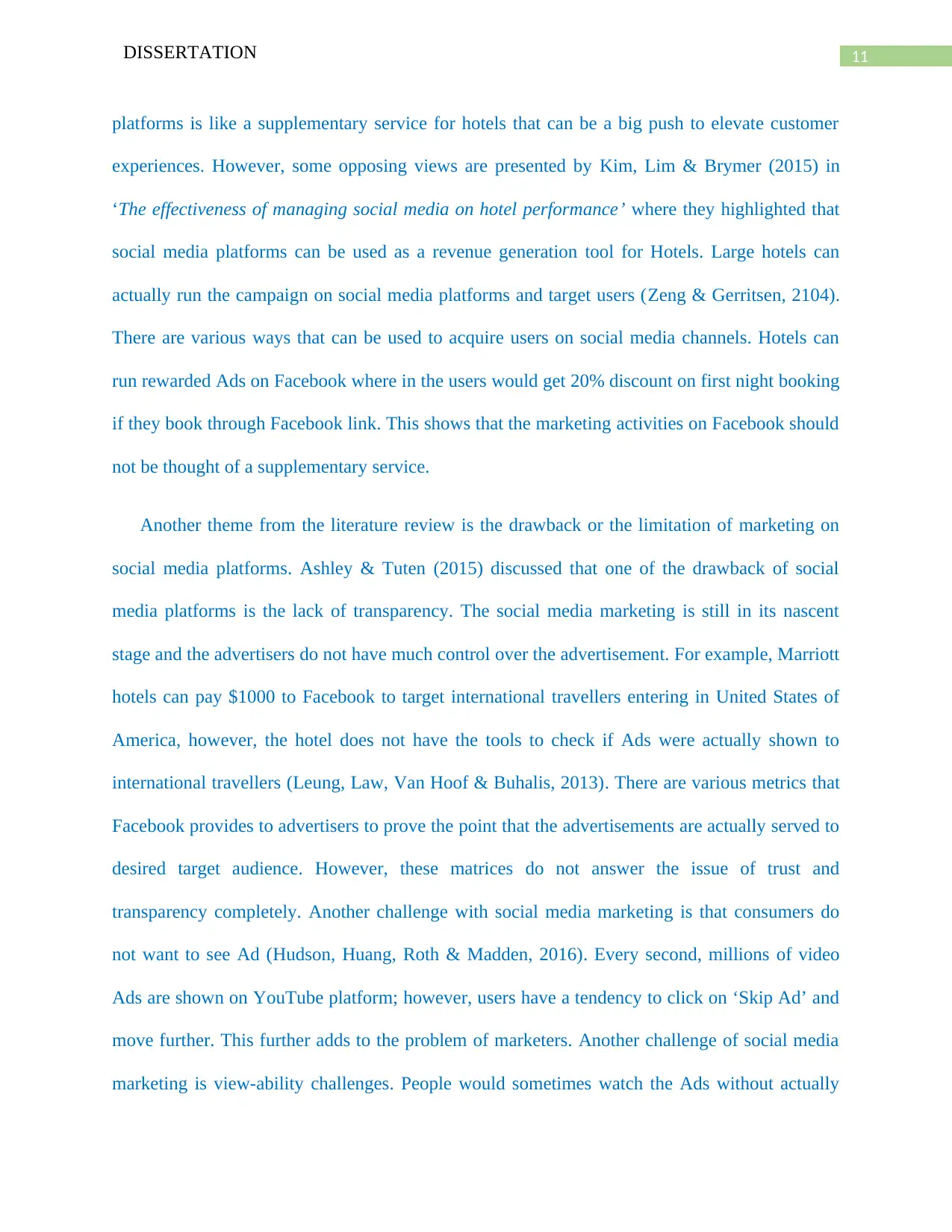
11DISSERTATION
platforms is like a supplementary service for hotels that can be a big push to elevate customer
experiences. However, some opposing views are presented by Kim, Lim & Brymer (2015) in
‘The effectiveness of managing social media on hotel performance’ where they highlighted that
social media platforms can be used as a revenue generation tool for Hotels. Large hotels can
actually run the campaign on social media platforms and target users (Zeng & Gerritsen, 2104).
There are various ways that can be used to acquire users on social media channels. Hotels can
run rewarded Ads on Facebook where in the users would get 20% discount on first night booking
if they book through Facebook link. This shows that the marketing activities on Facebook should
not be thought of a supplementary service.
Another theme from the literature review is the drawback or the limitation of marketing on
social media platforms. Ashley & Tuten (2015) discussed that one of the drawback of social
media platforms is the lack of transparency. The social media marketing is still in its nascent
stage and the advertisers do not have much control over the advertisement. For example, Marriott
hotels can pay $1000 to Facebook to target international travellers entering in United States of
America, however, the hotel does not have the tools to check if Ads were actually shown to
international travellers (Leung, Law, Van Hoof & Buhalis, 2013). There are various metrics that
Facebook provides to advertisers to prove the point that the advertisements are actually served to
desired target audience. However, these matrices do not answer the issue of trust and
transparency completely. Another challenge with social media marketing is that consumers do
not want to see Ad (Hudson, Huang, Roth & Madden, 2016). Every second, millions of video
Ads are shown on YouTube platform; however, users have a tendency to click on ‘Skip Ad’ and
move further. This further adds to the problem of marketers. Another challenge of social media
marketing is view-ability challenges. People would sometimes watch the Ads without actually
platforms is like a supplementary service for hotels that can be a big push to elevate customer
experiences. However, some opposing views are presented by Kim, Lim & Brymer (2015) in
‘The effectiveness of managing social media on hotel performance’ where they highlighted that
social media platforms can be used as a revenue generation tool for Hotels. Large hotels can
actually run the campaign on social media platforms and target users (Zeng & Gerritsen, 2104).
There are various ways that can be used to acquire users on social media channels. Hotels can
run rewarded Ads on Facebook where in the users would get 20% discount on first night booking
if they book through Facebook link. This shows that the marketing activities on Facebook should
not be thought of a supplementary service.
Another theme from the literature review is the drawback or the limitation of marketing on
social media platforms. Ashley & Tuten (2015) discussed that one of the drawback of social
media platforms is the lack of transparency. The social media marketing is still in its nascent
stage and the advertisers do not have much control over the advertisement. For example, Marriott
hotels can pay $1000 to Facebook to target international travellers entering in United States of
America, however, the hotel does not have the tools to check if Ads were actually shown to
international travellers (Leung, Law, Van Hoof & Buhalis, 2013). There are various metrics that
Facebook provides to advertisers to prove the point that the advertisements are actually served to
desired target audience. However, these matrices do not answer the issue of trust and
transparency completely. Another challenge with social media marketing is that consumers do
not want to see Ad (Hudson, Huang, Roth & Madden, 2016). Every second, millions of video
Ads are shown on YouTube platform; however, users have a tendency to click on ‘Skip Ad’ and
move further. This further adds to the problem of marketers. Another challenge of social media
marketing is view-ability challenges. People would sometimes watch the Ads without actually
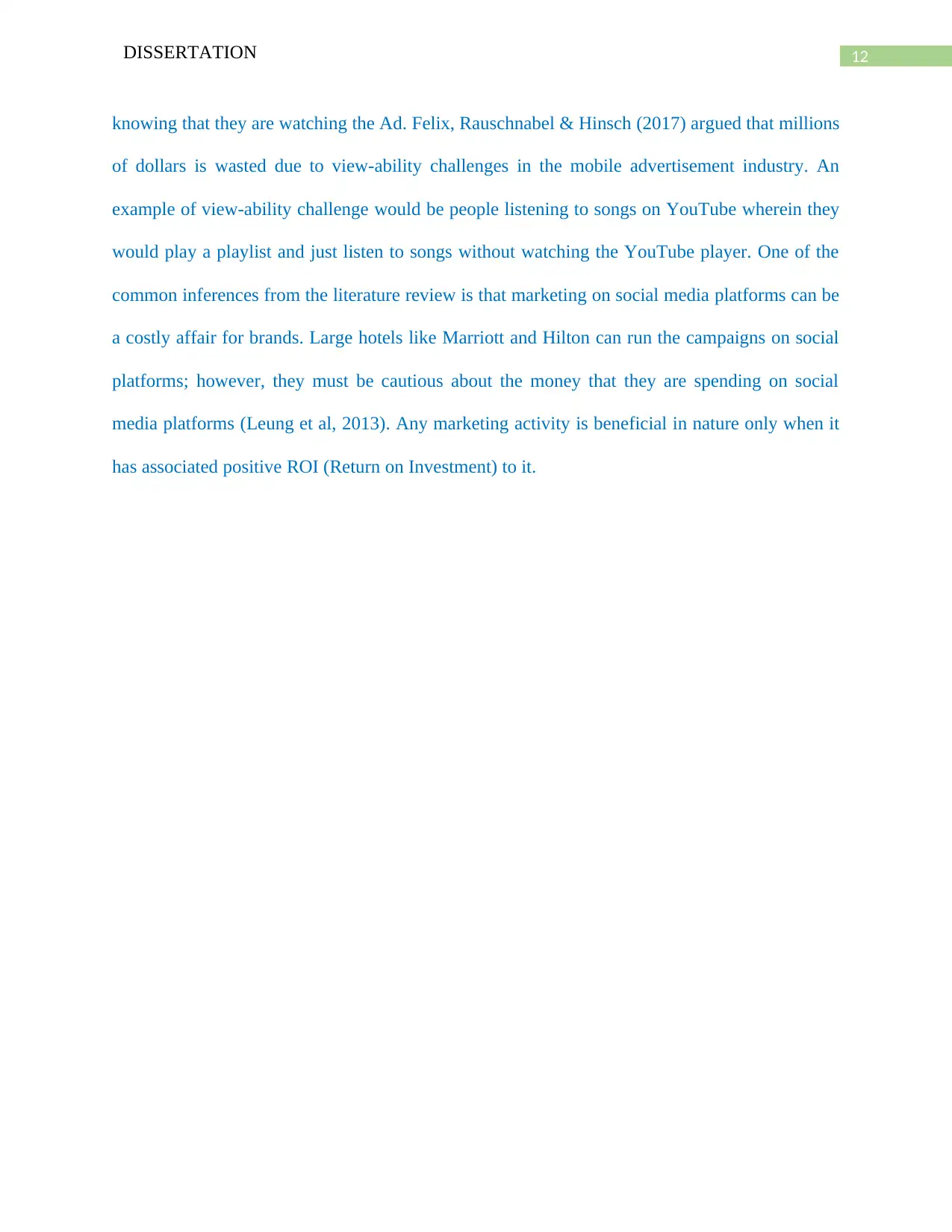
12DISSERTATION
knowing that they are watching the Ad. Felix, Rauschnabel & Hinsch (2017) argued that millions
of dollars is wasted due to view-ability challenges in the mobile advertisement industry. An
example of view-ability challenge would be people listening to songs on YouTube wherein they
would play a playlist and just listen to songs without watching the YouTube player. One of the
common inferences from the literature review is that marketing on social media platforms can be
a costly affair for brands. Large hotels like Marriott and Hilton can run the campaigns on social
platforms; however, they must be cautious about the money that they are spending on social
media platforms (Leung et al, 2013). Any marketing activity is beneficial in nature only when it
has associated positive ROI (Return on Investment) to it.
knowing that they are watching the Ad. Felix, Rauschnabel & Hinsch (2017) argued that millions
of dollars is wasted due to view-ability challenges in the mobile advertisement industry. An
example of view-ability challenge would be people listening to songs on YouTube wherein they
would play a playlist and just listen to songs without watching the YouTube player. One of the
common inferences from the literature review is that marketing on social media platforms can be
a costly affair for brands. Large hotels like Marriott and Hilton can run the campaigns on social
platforms; however, they must be cautious about the money that they are spending on social
media platforms (Leung et al, 2013). Any marketing activity is beneficial in nature only when it
has associated positive ROI (Return on Investment) to it.
Paraphrase This Document
Need a fresh take? Get an instant paraphrase of this document with our AI Paraphraser
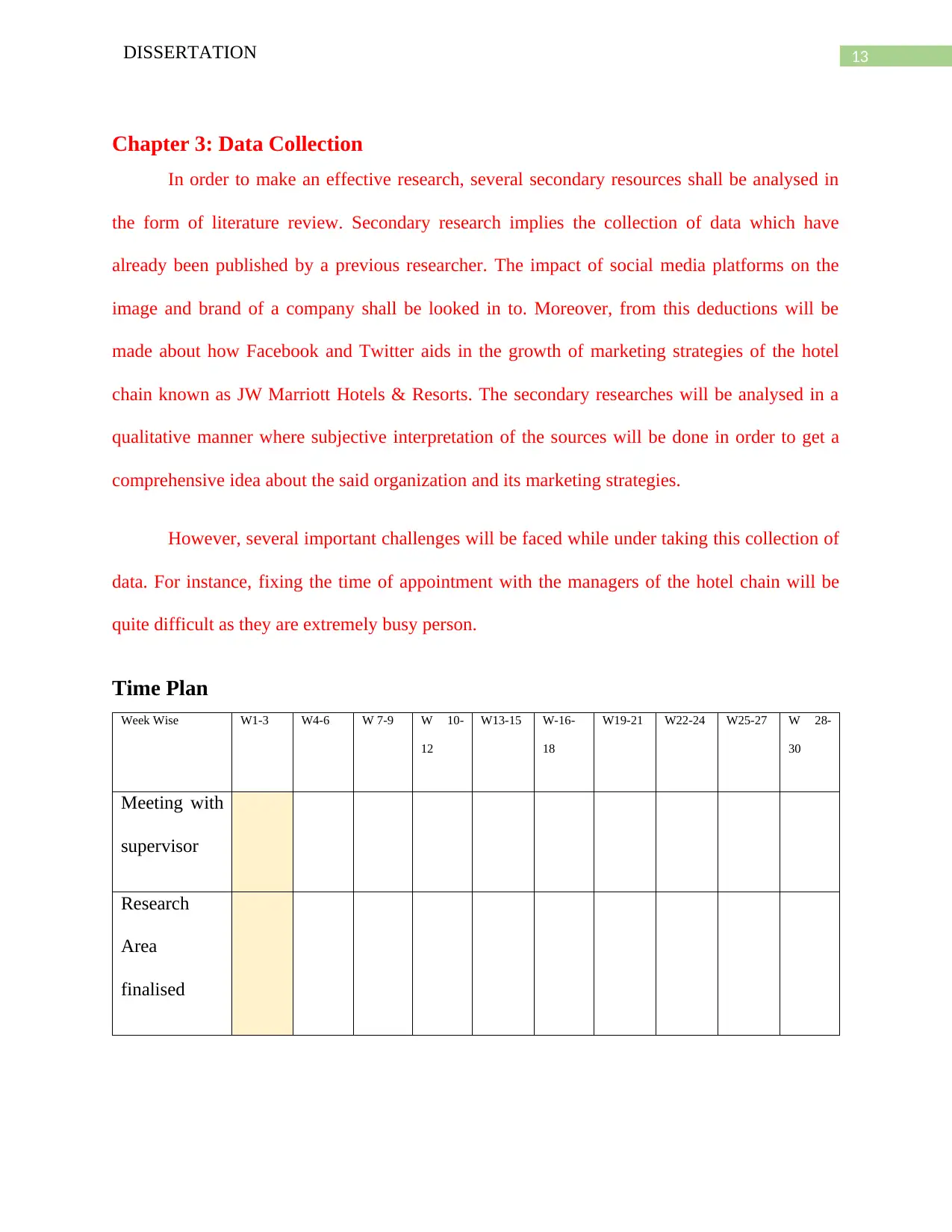
13DISSERTATION
Chapter 3: Data Collection
In order to make an effective research, several secondary resources shall be analysed in
the form of literature review. Secondary research implies the collection of data which have
already been published by a previous researcher. The impact of social media platforms on the
image and brand of a company shall be looked in to. Moreover, from this deductions will be
made about how Facebook and Twitter aids in the growth of marketing strategies of the hotel
chain known as JW Marriott Hotels & Resorts. The secondary researches will be analysed in a
qualitative manner where subjective interpretation of the sources will be done in order to get a
comprehensive idea about the said organization and its marketing strategies.
However, several important challenges will be faced while under taking this collection of
data. For instance, fixing the time of appointment with the managers of the hotel chain will be
quite difficult as they are extremely busy person.
Time Plan
Week Wise W1-3 W4-6 W 7-9 W 10-
12
W13-15 W-16-
18
W19-21 W22-24 W25-27 W 28-
30
Meeting with
supervisor
Research
Area
finalised
Chapter 3: Data Collection
In order to make an effective research, several secondary resources shall be analysed in
the form of literature review. Secondary research implies the collection of data which have
already been published by a previous researcher. The impact of social media platforms on the
image and brand of a company shall be looked in to. Moreover, from this deductions will be
made about how Facebook and Twitter aids in the growth of marketing strategies of the hotel
chain known as JW Marriott Hotels & Resorts. The secondary researches will be analysed in a
qualitative manner where subjective interpretation of the sources will be done in order to get a
comprehensive idea about the said organization and its marketing strategies.
However, several important challenges will be faced while under taking this collection of
data. For instance, fixing the time of appointment with the managers of the hotel chain will be
quite difficult as they are extremely busy person.
Time Plan
Week Wise W1-3 W4-6 W 7-9 W 10-
12
W13-15 W-16-
18
W19-21 W22-24 W25-27 W 28-
30
Meeting with
supervisor
Research
Area
finalised
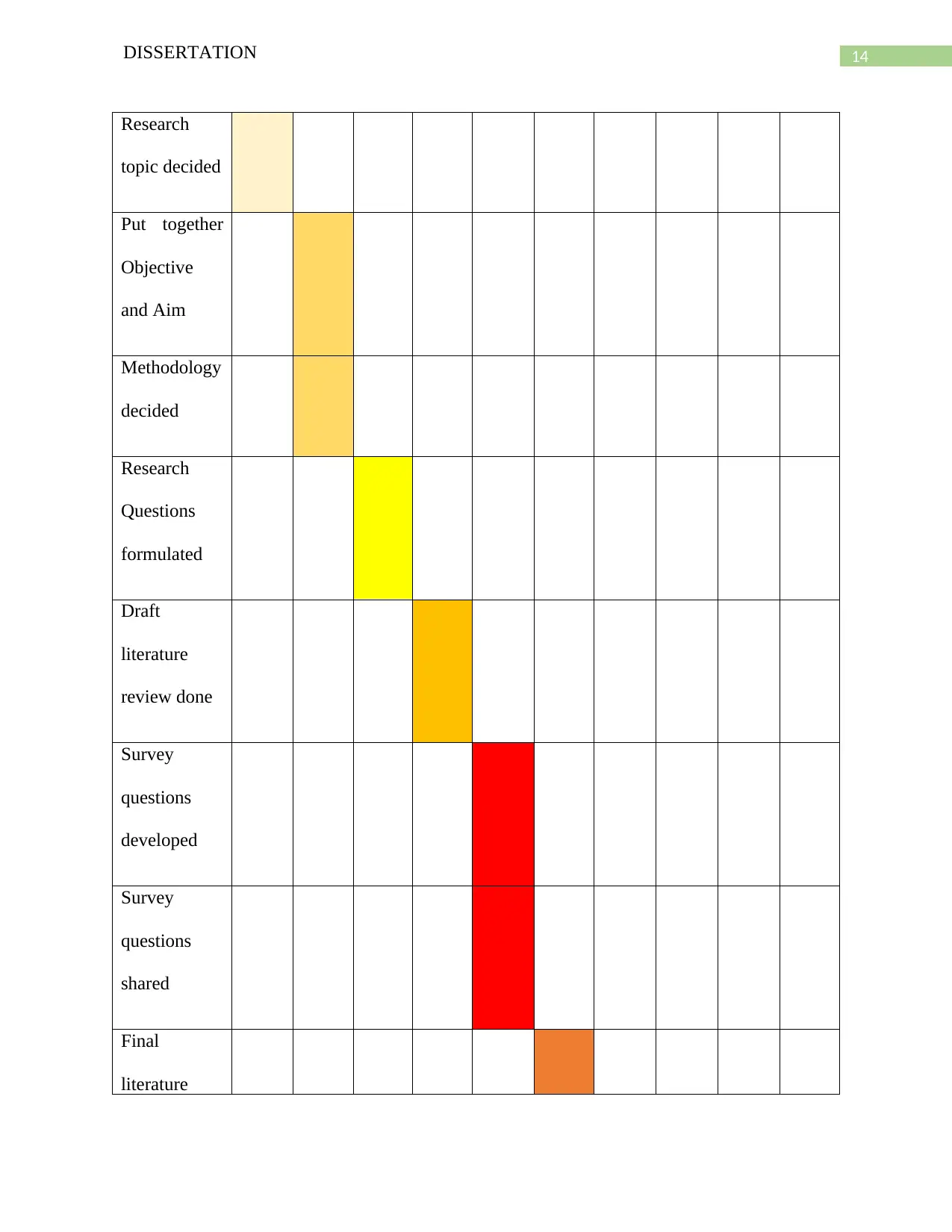
14DISSERTATION
Research
topic decided
Put together
Objective
and Aim
Methodology
decided
Research
Questions
formulated
Draft
literature
review done
Survey
questions
developed
Survey
questions
shared
Final
literature
Research
topic decided
Put together
Objective
and Aim
Methodology
decided
Research
Questions
formulated
Draft
literature
review done
Survey
questions
developed
Survey
questions
shared
Final
literature
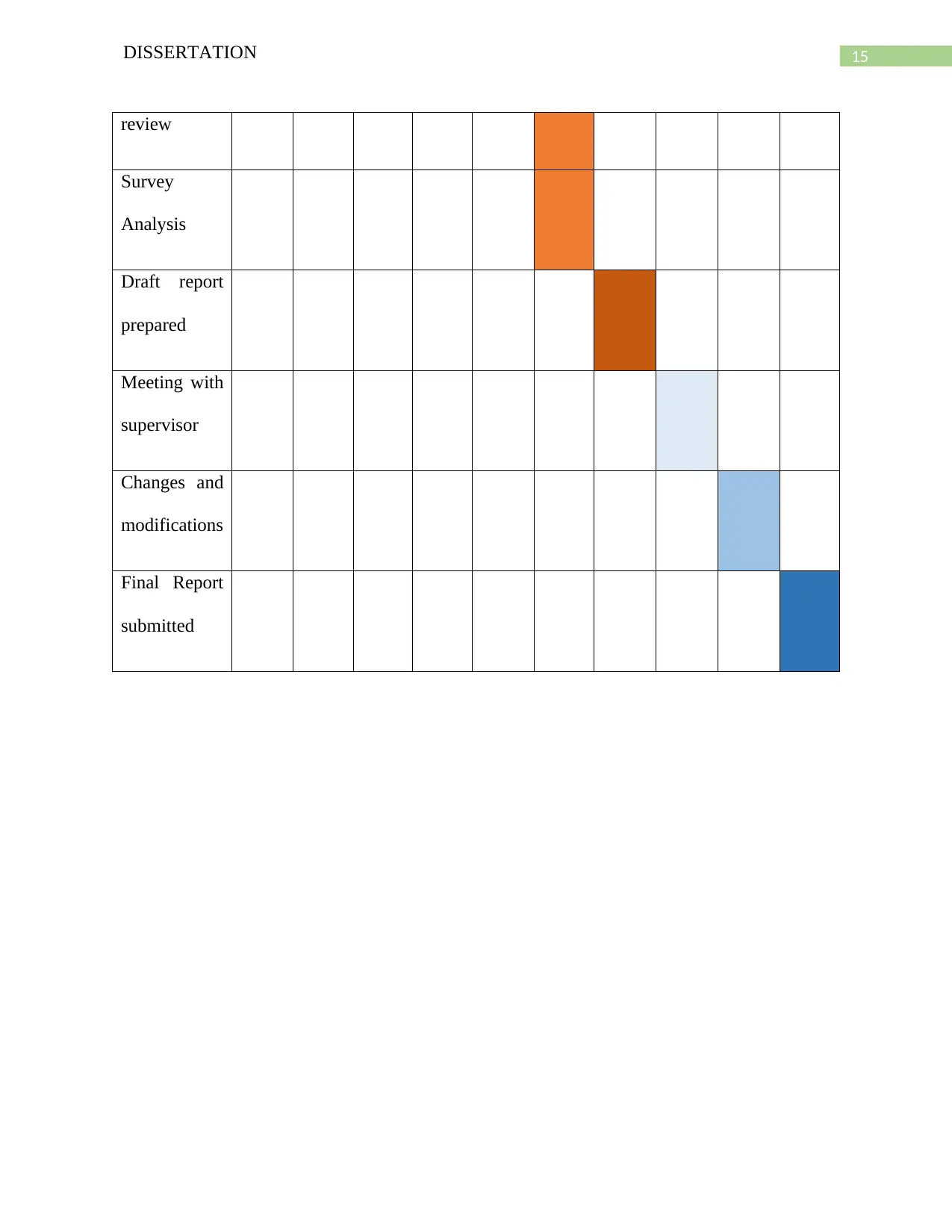
15DISSERTATION
review
Survey
Analysis
Draft report
prepared
Meeting with
supervisor
Changes and
modifications
Final Report
submitted
review
Survey
Analysis
Draft report
prepared
Meeting with
supervisor
Changes and
modifications
Final Report
submitted
Secure Best Marks with AI Grader
Need help grading? Try our AI Grader for instant feedback on your assignments.
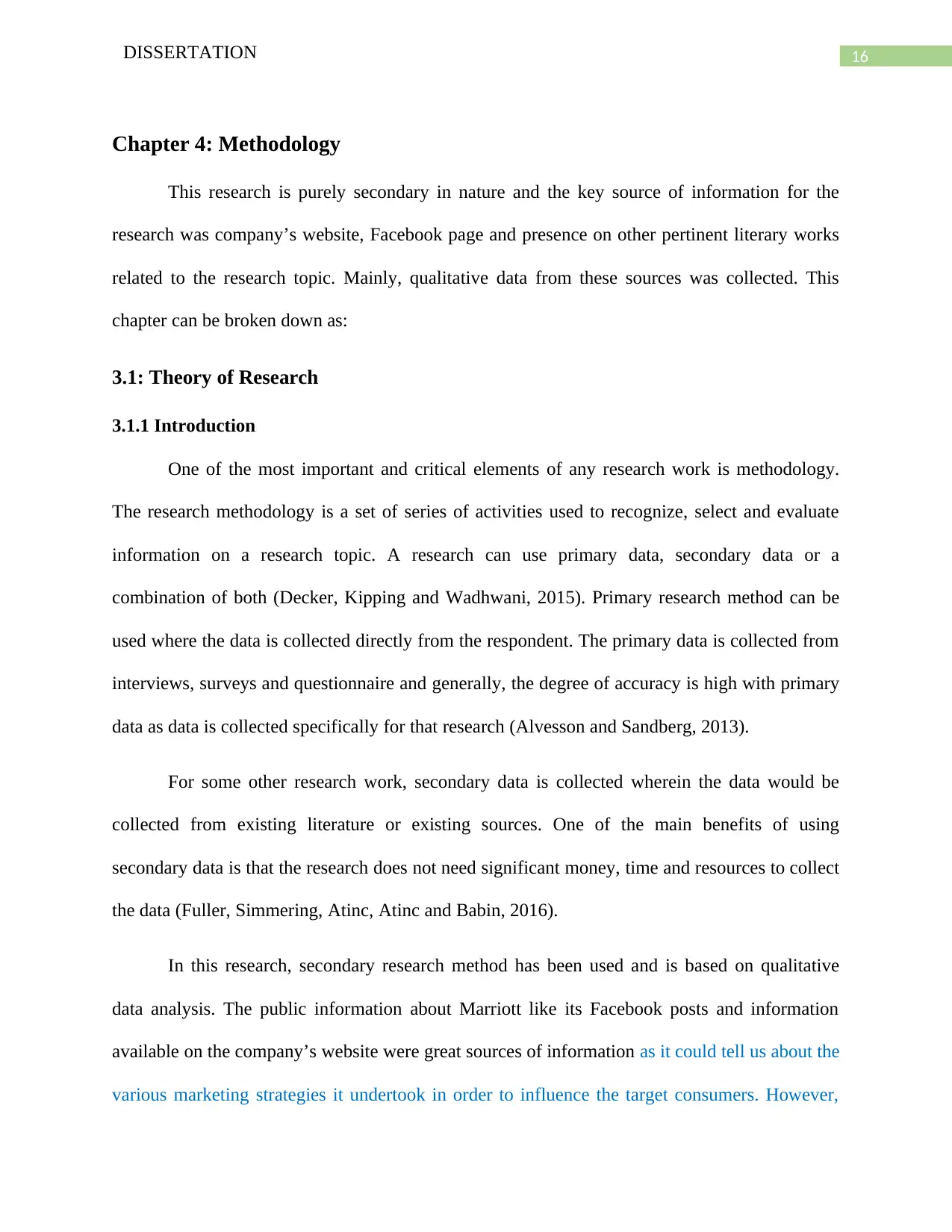
16DISSERTATION
Chapter 4: Methodology
This research is purely secondary in nature and the key source of information for the
research was company’s website, Facebook page and presence on other pertinent literary works
related to the research topic. Mainly, qualitative data from these sources was collected. This
chapter can be broken down as:
3.1: Theory of Research
3.1.1 Introduction
One of the most important and critical elements of any research work is methodology.
The research methodology is a set of series of activities used to recognize, select and evaluate
information on a research topic. A research can use primary data, secondary data or a
combination of both (Decker, Kipping and Wadhwani, 2015). Primary research method can be
used where the data is collected directly from the respondent. The primary data is collected from
interviews, surveys and questionnaire and generally, the degree of accuracy is high with primary
data as data is collected specifically for that research (Alvesson and Sandberg, 2013).
For some other research work, secondary data is collected wherein the data would be
collected from existing literature or existing sources. One of the main benefits of using
secondary data is that the research does not need significant money, time and resources to collect
the data (Fuller, Simmering, Atinc, Atinc and Babin, 2016).
In this research, secondary research method has been used and is based on qualitative
data analysis. The public information about Marriott like its Facebook posts and information
available on the company’s website were great sources of information as it could tell us about the
various marketing strategies it undertook in order to influence the target consumers. However,
Chapter 4: Methodology
This research is purely secondary in nature and the key source of information for the
research was company’s website, Facebook page and presence on other pertinent literary works
related to the research topic. Mainly, qualitative data from these sources was collected. This
chapter can be broken down as:
3.1: Theory of Research
3.1.1 Introduction
One of the most important and critical elements of any research work is methodology.
The research methodology is a set of series of activities used to recognize, select and evaluate
information on a research topic. A research can use primary data, secondary data or a
combination of both (Decker, Kipping and Wadhwani, 2015). Primary research method can be
used where the data is collected directly from the respondent. The primary data is collected from
interviews, surveys and questionnaire and generally, the degree of accuracy is high with primary
data as data is collected specifically for that research (Alvesson and Sandberg, 2013).
For some other research work, secondary data is collected wherein the data would be
collected from existing literature or existing sources. One of the main benefits of using
secondary data is that the research does not need significant money, time and resources to collect
the data (Fuller, Simmering, Atinc, Atinc and Babin, 2016).
In this research, secondary research method has been used and is based on qualitative
data analysis. The public information about Marriott like its Facebook posts and information
available on the company’s website were great sources of information as it could tell us about the
various marketing strategies it undertook in order to influence the target consumers. However,
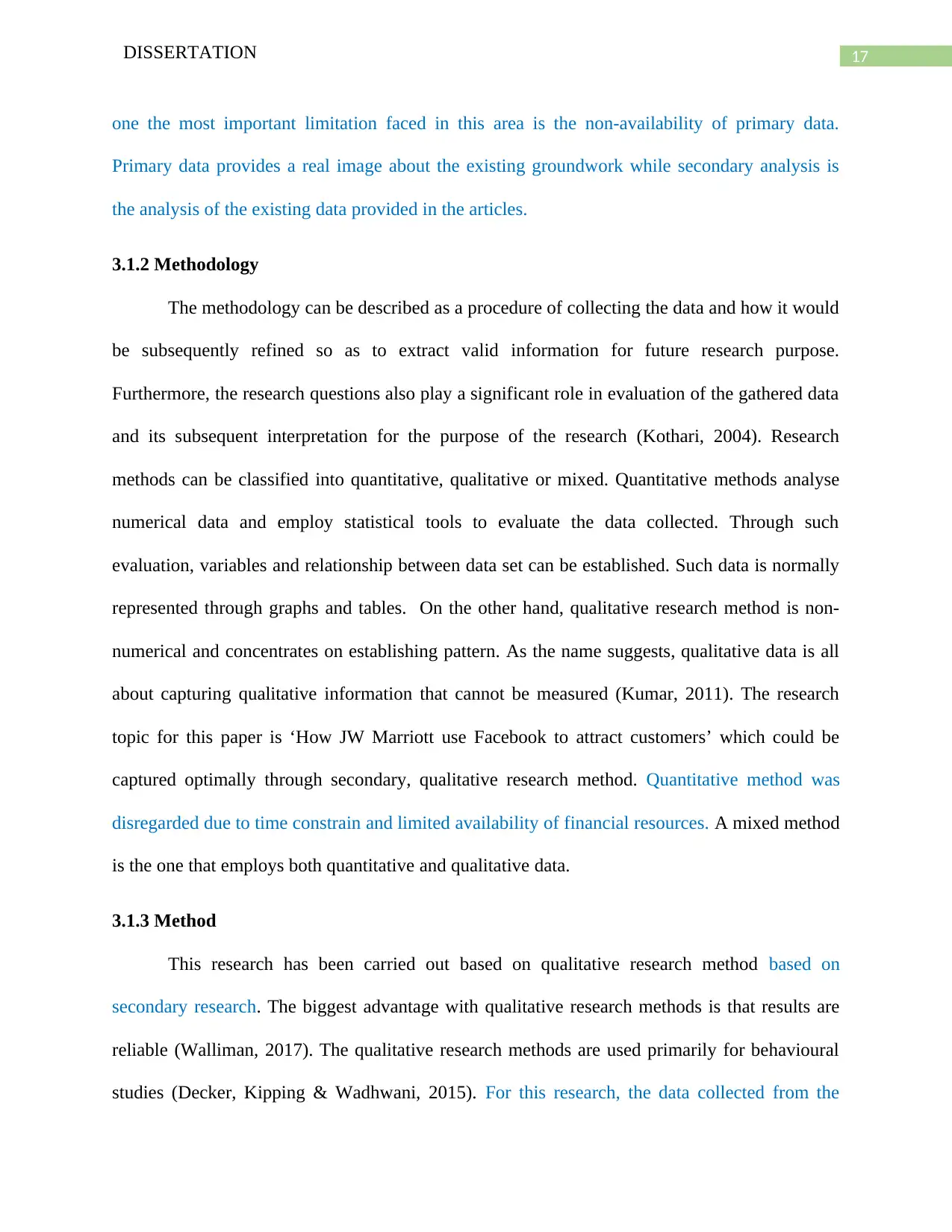
17DISSERTATION
one the most important limitation faced in this area is the non-availability of primary data.
Primary data provides a real image about the existing groundwork while secondary analysis is
the analysis of the existing data provided in the articles.
3.1.2 Methodology
The methodology can be described as a procedure of collecting the data and how it would
be subsequently refined so as to extract valid information for future research purpose.
Furthermore, the research questions also play a significant role in evaluation of the gathered data
and its subsequent interpretation for the purpose of the research (Kothari, 2004). Research
methods can be classified into quantitative, qualitative or mixed. Quantitative methods analyse
numerical data and employ statistical tools to evaluate the data collected. Through such
evaluation, variables and relationship between data set can be established. Such data is normally
represented through graphs and tables. On the other hand, qualitative research method is non-
numerical and concentrates on establishing pattern. As the name suggests, qualitative data is all
about capturing qualitative information that cannot be measured (Kumar, 2011). The research
topic for this paper is ‘How JW Marriott use Facebook to attract customers’ which could be
captured optimally through secondary, qualitative research method. Quantitative method was
disregarded due to time constrain and limited availability of financial resources. A mixed method
is the one that employs both quantitative and qualitative data.
3.1.3 Method
This research has been carried out based on qualitative research method based on
secondary research. The biggest advantage with qualitative research methods is that results are
reliable (Walliman, 2017). The qualitative research methods are used primarily for behavioural
studies (Decker, Kipping & Wadhwani, 2015). For this research, the data collected from the
one the most important limitation faced in this area is the non-availability of primary data.
Primary data provides a real image about the existing groundwork while secondary analysis is
the analysis of the existing data provided in the articles.
3.1.2 Methodology
The methodology can be described as a procedure of collecting the data and how it would
be subsequently refined so as to extract valid information for future research purpose.
Furthermore, the research questions also play a significant role in evaluation of the gathered data
and its subsequent interpretation for the purpose of the research (Kothari, 2004). Research
methods can be classified into quantitative, qualitative or mixed. Quantitative methods analyse
numerical data and employ statistical tools to evaluate the data collected. Through such
evaluation, variables and relationship between data set can be established. Such data is normally
represented through graphs and tables. On the other hand, qualitative research method is non-
numerical and concentrates on establishing pattern. As the name suggests, qualitative data is all
about capturing qualitative information that cannot be measured (Kumar, 2011). The research
topic for this paper is ‘How JW Marriott use Facebook to attract customers’ which could be
captured optimally through secondary, qualitative research method. Quantitative method was
disregarded due to time constrain and limited availability of financial resources. A mixed method
is the one that employs both quantitative and qualitative data.
3.1.3 Method
This research has been carried out based on qualitative research method based on
secondary research. The biggest advantage with qualitative research methods is that results are
reliable (Walliman, 2017). The qualitative research methods are used primarily for behavioural
studies (Decker, Kipping & Wadhwani, 2015). For this research, the data collected from the
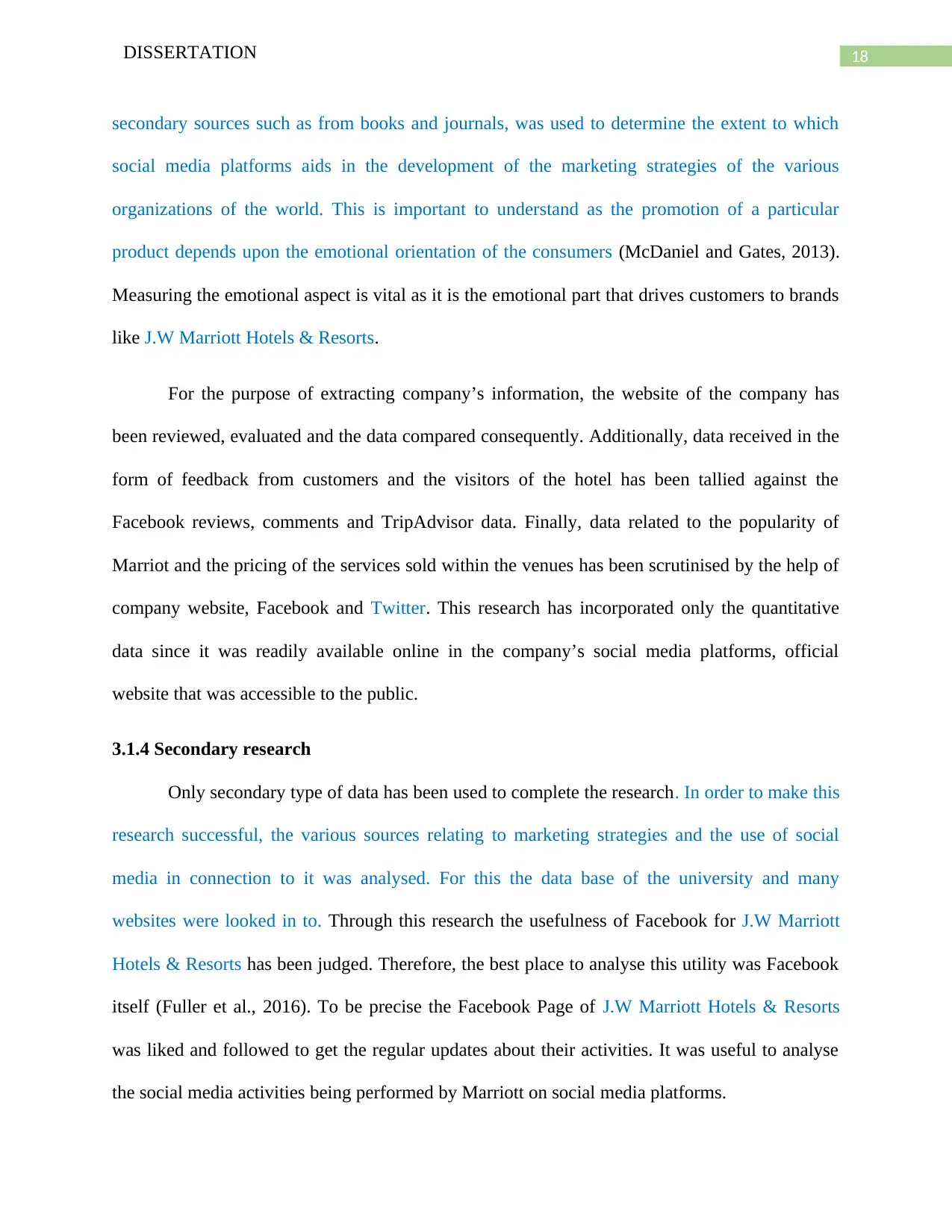
18DISSERTATION
secondary sources such as from books and journals, was used to determine the extent to which
social media platforms aids in the development of the marketing strategies of the various
organizations of the world. This is important to understand as the promotion of a particular
product depends upon the emotional orientation of the consumers (McDaniel and Gates, 2013).
Measuring the emotional aspect is vital as it is the emotional part that drives customers to brands
like J.W Marriott Hotels & Resorts.
For the purpose of extracting company’s information, the website of the company has
been reviewed, evaluated and the data compared consequently. Additionally, data received in the
form of feedback from customers and the visitors of the hotel has been tallied against the
Facebook reviews, comments and TripAdvisor data. Finally, data related to the popularity of
Marriot and the pricing of the services sold within the venues has been scrutinised by the help of
company website, Facebook and Twitter. This research has incorporated only the quantitative
data since it was readily available online in the company’s social media platforms, official
website that was accessible to the public.
3.1.4 Secondary research
Only secondary type of data has been used to complete the research. In order to make this
research successful, the various sources relating to marketing strategies and the use of social
media in connection to it was analysed. For this the data base of the university and many
websites were looked in to. Through this research the usefulness of Facebook for J.W Marriott
Hotels & Resorts has been judged. Therefore, the best place to analyse this utility was Facebook
itself (Fuller et al., 2016). To be precise the Facebook Page of J.W Marriott Hotels & Resorts
was liked and followed to get the regular updates about their activities. It was useful to analyse
the social media activities being performed by Marriott on social media platforms.
secondary sources such as from books and journals, was used to determine the extent to which
social media platforms aids in the development of the marketing strategies of the various
organizations of the world. This is important to understand as the promotion of a particular
product depends upon the emotional orientation of the consumers (McDaniel and Gates, 2013).
Measuring the emotional aspect is vital as it is the emotional part that drives customers to brands
like J.W Marriott Hotels & Resorts.
For the purpose of extracting company’s information, the website of the company has
been reviewed, evaluated and the data compared consequently. Additionally, data received in the
form of feedback from customers and the visitors of the hotel has been tallied against the
Facebook reviews, comments and TripAdvisor data. Finally, data related to the popularity of
Marriot and the pricing of the services sold within the venues has been scrutinised by the help of
company website, Facebook and Twitter. This research has incorporated only the quantitative
data since it was readily available online in the company’s social media platforms, official
website that was accessible to the public.
3.1.4 Secondary research
Only secondary type of data has been used to complete the research. In order to make this
research successful, the various sources relating to marketing strategies and the use of social
media in connection to it was analysed. For this the data base of the university and many
websites were looked in to. Through this research the usefulness of Facebook for J.W Marriott
Hotels & Resorts has been judged. Therefore, the best place to analyse this utility was Facebook
itself (Fuller et al., 2016). To be precise the Facebook Page of J.W Marriott Hotels & Resorts
was liked and followed to get the regular updates about their activities. It was useful to analyse
the social media activities being performed by Marriott on social media platforms.
Paraphrase This Document
Need a fresh take? Get an instant paraphrase of this document with our AI Paraphraser
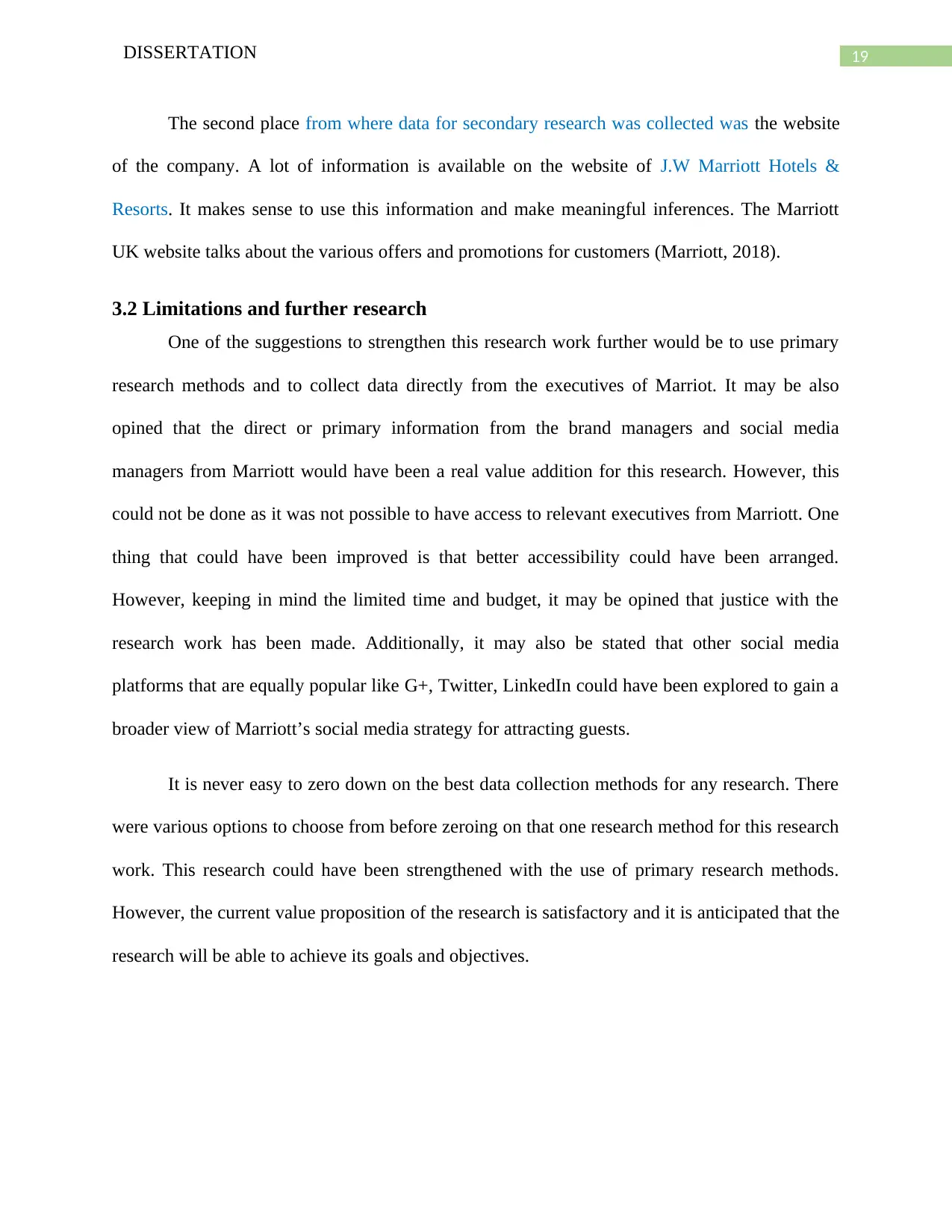
19DISSERTATION
The second place from where data for secondary research was collected was the website
of the company. A lot of information is available on the website of J.W Marriott Hotels &
Resorts. It makes sense to use this information and make meaningful inferences. The Marriott
UK website talks about the various offers and promotions for customers (Marriott, 2018).
3.2 Limitations and further research
One of the suggestions to strengthen this research work further would be to use primary
research methods and to collect data directly from the executives of Marriot. It may be also
opined that the direct or primary information from the brand managers and social media
managers from Marriott would have been a real value addition for this research. However, this
could not be done as it was not possible to have access to relevant executives from Marriott. One
thing that could have been improved is that better accessibility could have been arranged.
However, keeping in mind the limited time and budget, it may be opined that justice with the
research work has been made. Additionally, it may also be stated that other social media
platforms that are equally popular like G+, Twitter, LinkedIn could have been explored to gain a
broader view of Marriott’s social media strategy for attracting guests.
It is never easy to zero down on the best data collection methods for any research. There
were various options to choose from before zeroing on that one research method for this research
work. This research could have been strengthened with the use of primary research methods.
However, the current value proposition of the research is satisfactory and it is anticipated that the
research will be able to achieve its goals and objectives.
The second place from where data for secondary research was collected was the website
of the company. A lot of information is available on the website of J.W Marriott Hotels &
Resorts. It makes sense to use this information and make meaningful inferences. The Marriott
UK website talks about the various offers and promotions for customers (Marriott, 2018).
3.2 Limitations and further research
One of the suggestions to strengthen this research work further would be to use primary
research methods and to collect data directly from the executives of Marriot. It may be also
opined that the direct or primary information from the brand managers and social media
managers from Marriott would have been a real value addition for this research. However, this
could not be done as it was not possible to have access to relevant executives from Marriott. One
thing that could have been improved is that better accessibility could have been arranged.
However, keeping in mind the limited time and budget, it may be opined that justice with the
research work has been made. Additionally, it may also be stated that other social media
platforms that are equally popular like G+, Twitter, LinkedIn could have been explored to gain a
broader view of Marriott’s social media strategy for attracting guests.
It is never easy to zero down on the best data collection methods for any research. There
were various options to choose from before zeroing on that one research method for this research
work. This research could have been strengthened with the use of primary research methods.
However, the current value proposition of the research is satisfactory and it is anticipated that the
research will be able to achieve its goals and objectives.
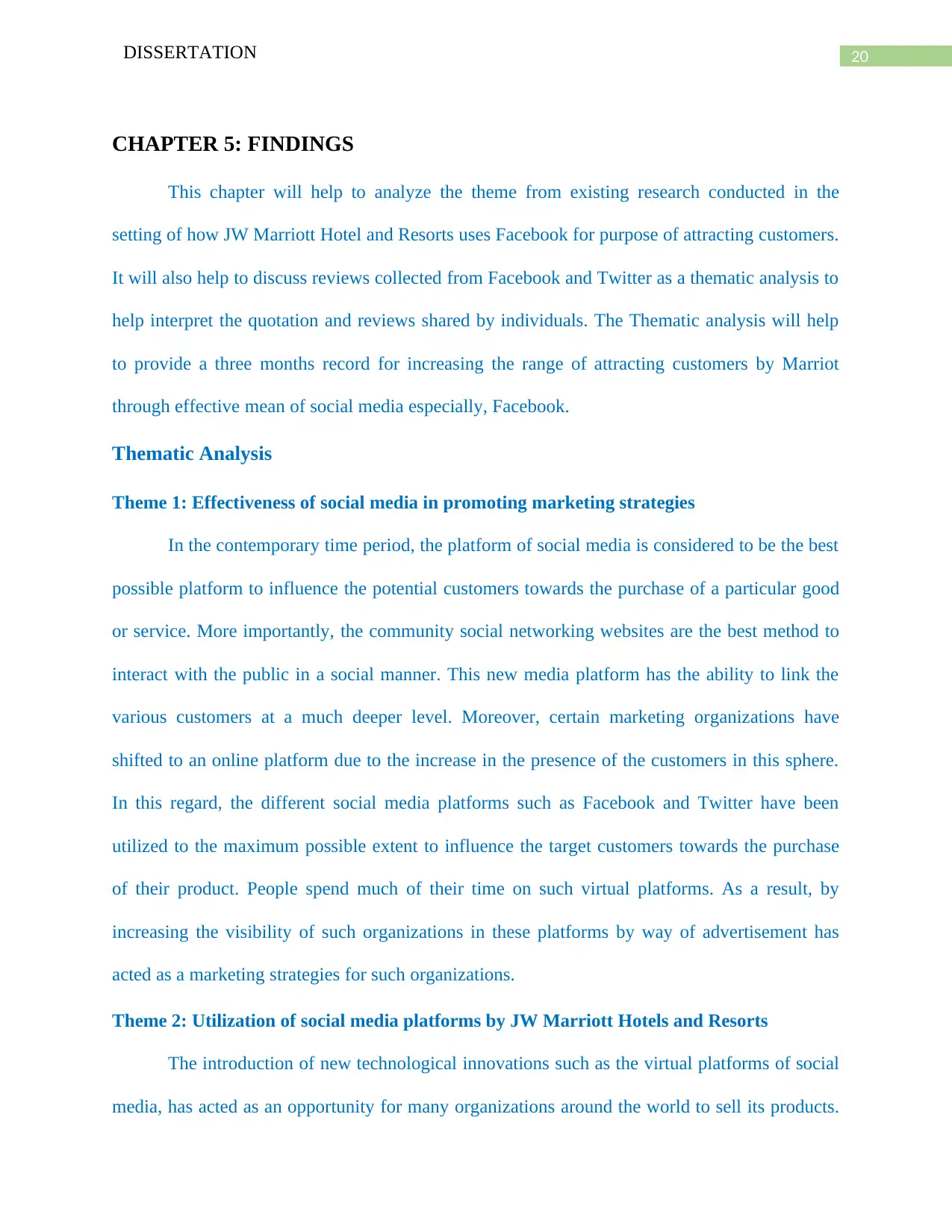
20DISSERTATION
CHAPTER 5: FINDINGS
This chapter will help to analyze the theme from existing research conducted in the
setting of how JW Marriott Hotel and Resorts uses Facebook for purpose of attracting customers.
It will also help to discuss reviews collected from Facebook and Twitter as a thematic analysis to
help interpret the quotation and reviews shared by individuals. The Thematic analysis will help
to provide a three months record for increasing the range of attracting customers by Marriot
through effective mean of social media especially, Facebook.
Thematic Analysis
Theme 1: Effectiveness of social media in promoting marketing strategies
In the contemporary time period, the platform of social media is considered to be the best
possible platform to influence the potential customers towards the purchase of a particular good
or service. More importantly, the community social networking websites are the best method to
interact with the public in a social manner. This new media platform has the ability to link the
various customers at a much deeper level. Moreover, certain marketing organizations have
shifted to an online platform due to the increase in the presence of the customers in this sphere.
In this regard, the different social media platforms such as Facebook and Twitter have been
utilized to the maximum possible extent to influence the target customers towards the purchase
of their product. People spend much of their time on such virtual platforms. As a result, by
increasing the visibility of such organizations in these platforms by way of advertisement has
acted as a marketing strategies for such organizations.
Theme 2: Utilization of social media platforms by JW Marriott Hotels and Resorts
The introduction of new technological innovations such as the virtual platforms of social
media, has acted as an opportunity for many organizations around the world to sell its products.
CHAPTER 5: FINDINGS
This chapter will help to analyze the theme from existing research conducted in the
setting of how JW Marriott Hotel and Resorts uses Facebook for purpose of attracting customers.
It will also help to discuss reviews collected from Facebook and Twitter as a thematic analysis to
help interpret the quotation and reviews shared by individuals. The Thematic analysis will help
to provide a three months record for increasing the range of attracting customers by Marriot
through effective mean of social media especially, Facebook.
Thematic Analysis
Theme 1: Effectiveness of social media in promoting marketing strategies
In the contemporary time period, the platform of social media is considered to be the best
possible platform to influence the potential customers towards the purchase of a particular good
or service. More importantly, the community social networking websites are the best method to
interact with the public in a social manner. This new media platform has the ability to link the
various customers at a much deeper level. Moreover, certain marketing organizations have
shifted to an online platform due to the increase in the presence of the customers in this sphere.
In this regard, the different social media platforms such as Facebook and Twitter have been
utilized to the maximum possible extent to influence the target customers towards the purchase
of their product. People spend much of their time on such virtual platforms. As a result, by
increasing the visibility of such organizations in these platforms by way of advertisement has
acted as a marketing strategies for such organizations.
Theme 2: Utilization of social media platforms by JW Marriott Hotels and Resorts
The introduction of new technological innovations such as the virtual platforms of social
media, has acted as an opportunity for many organizations around the world to sell its products.
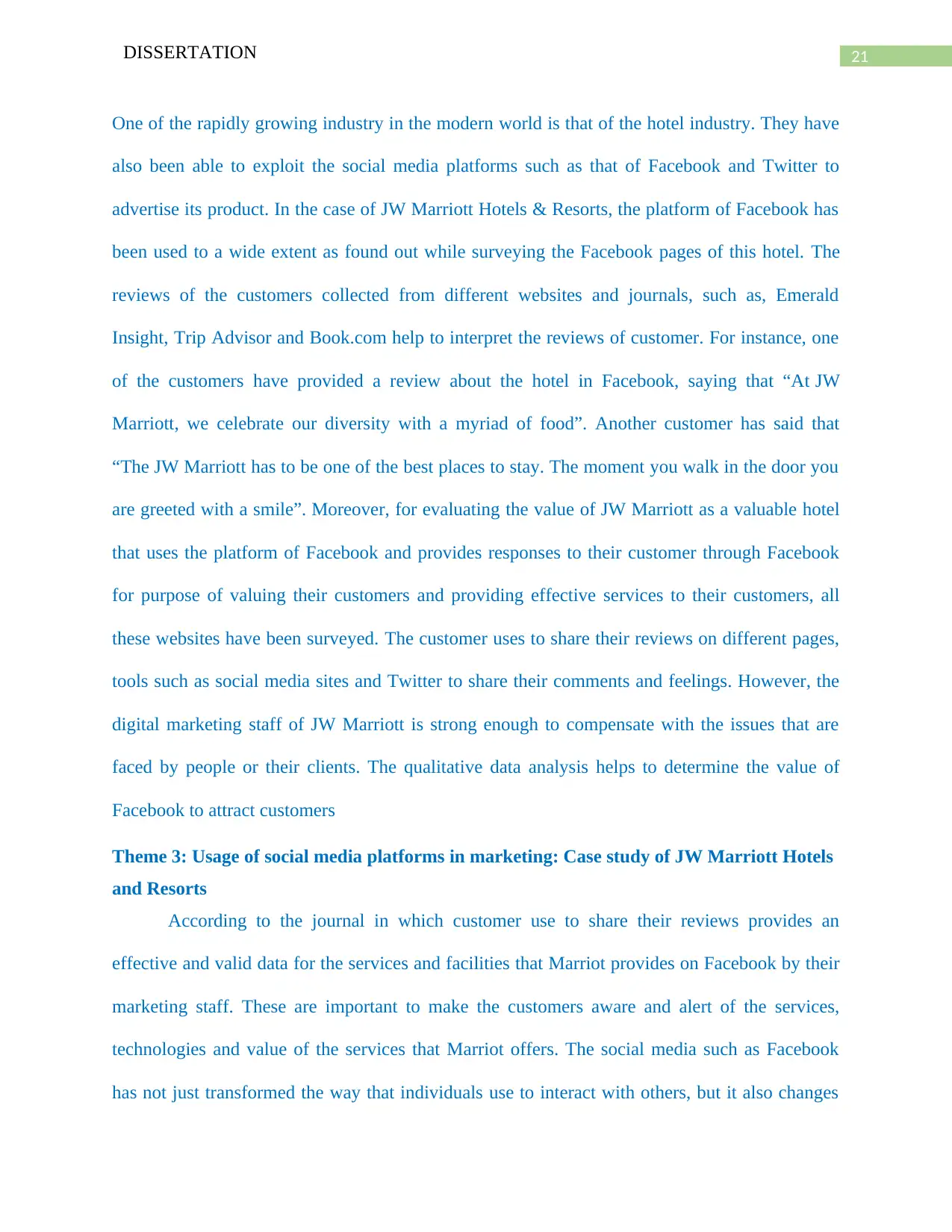
21DISSERTATION
One of the rapidly growing industry in the modern world is that of the hotel industry. They have
also been able to exploit the social media platforms such as that of Facebook and Twitter to
advertise its product. In the case of JW Marriott Hotels & Resorts, the platform of Facebook has
been used to a wide extent as found out while surveying the Facebook pages of this hotel. The
reviews of the customers collected from different websites and journals, such as, Emerald
Insight, Trip Advisor and Book.com help to interpret the reviews of customer. For instance, one
of the customers have provided a review about the hotel in Facebook, saying that “At JW
Marriott, we celebrate our diversity with a myriad of food”. Another customer has said that
“The JW Marriott has to be one of the best places to stay. The moment you walk in the door you
are greeted with a smile”. Moreover, for evaluating the value of JW Marriott as a valuable hotel
that uses the platform of Facebook and provides responses to their customer through Facebook
for purpose of valuing their customers and providing effective services to their customers, all
these websites have been surveyed. The customer uses to share their reviews on different pages,
tools such as social media sites and Twitter to share their comments and feelings. However, the
digital marketing staff of JW Marriott is strong enough to compensate with the issues that are
faced by people or their clients. The qualitative data analysis helps to determine the value of
Facebook to attract customers
Theme 3: Usage of social media platforms in marketing: Case study of JW Marriott Hotels
and Resorts
According to the journal in which customer use to share their reviews provides an
effective and valid data for the services and facilities that Marriot provides on Facebook by their
marketing staff. These are important to make the customers aware and alert of the services,
technologies and value of the services that Marriot offers. The social media such as Facebook
has not just transformed the way that individuals use to interact with others, but it also changes
One of the rapidly growing industry in the modern world is that of the hotel industry. They have
also been able to exploit the social media platforms such as that of Facebook and Twitter to
advertise its product. In the case of JW Marriott Hotels & Resorts, the platform of Facebook has
been used to a wide extent as found out while surveying the Facebook pages of this hotel. The
reviews of the customers collected from different websites and journals, such as, Emerald
Insight, Trip Advisor and Book.com help to interpret the reviews of customer. For instance, one
of the customers have provided a review about the hotel in Facebook, saying that “At JW
Marriott, we celebrate our diversity with a myriad of food”. Another customer has said that
“The JW Marriott has to be one of the best places to stay. The moment you walk in the door you
are greeted with a smile”. Moreover, for evaluating the value of JW Marriott as a valuable hotel
that uses the platform of Facebook and provides responses to their customer through Facebook
for purpose of valuing their customers and providing effective services to their customers, all
these websites have been surveyed. The customer uses to share their reviews on different pages,
tools such as social media sites and Twitter to share their comments and feelings. However, the
digital marketing staff of JW Marriott is strong enough to compensate with the issues that are
faced by people or their clients. The qualitative data analysis helps to determine the value of
Facebook to attract customers
Theme 3: Usage of social media platforms in marketing: Case study of JW Marriott Hotels
and Resorts
According to the journal in which customer use to share their reviews provides an
effective and valid data for the services and facilities that Marriot provides on Facebook by their
marketing staff. These are important to make the customers aware and alert of the services,
technologies and value of the services that Marriot offers. The social media such as Facebook
has not just transformed the way that individuals use to interact with others, but it also changes
Secure Best Marks with AI Grader
Need help grading? Try our AI Grader for instant feedback on your assignments.
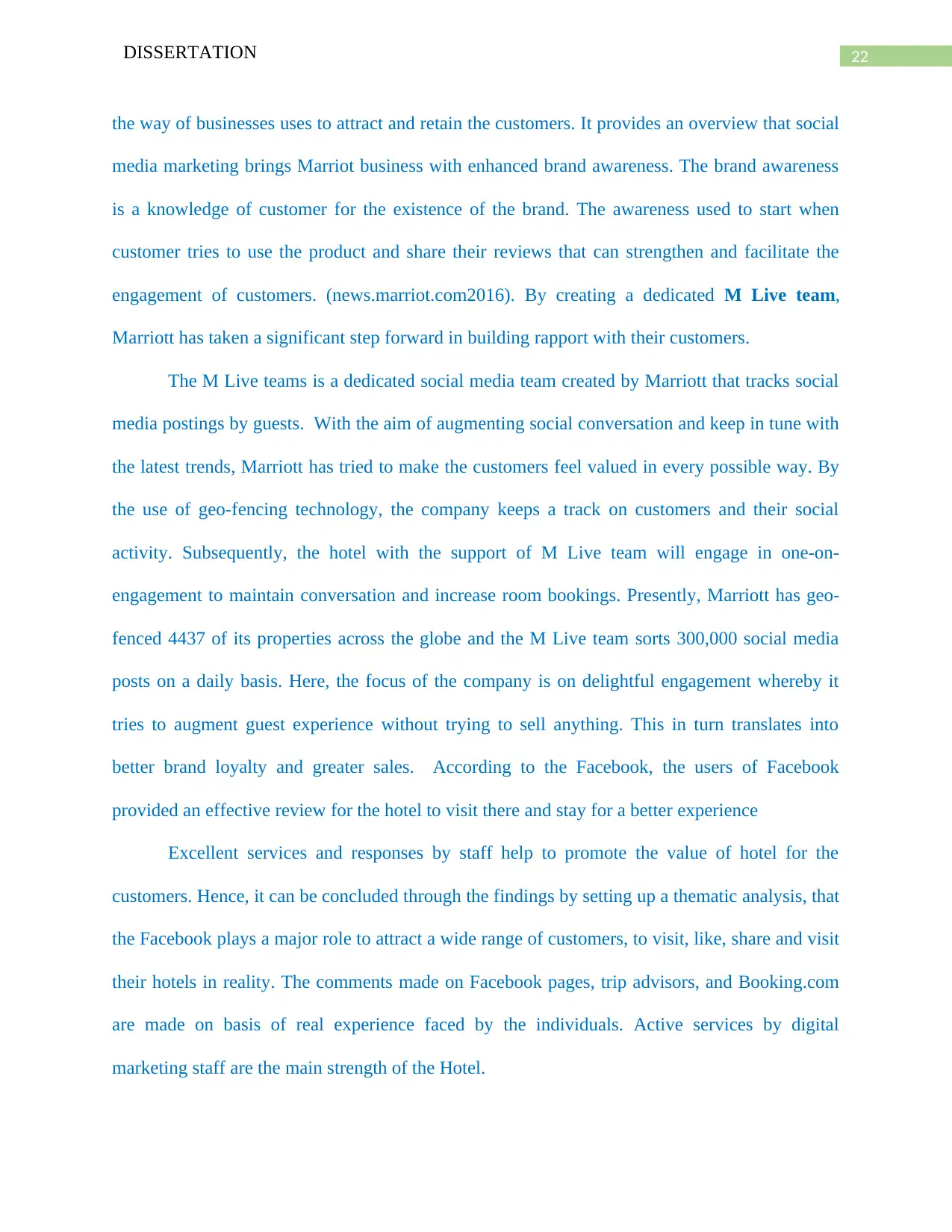
22DISSERTATION
the way of businesses uses to attract and retain the customers. It provides an overview that social
media marketing brings Marriot business with enhanced brand awareness. The brand awareness
is a knowledge of customer for the existence of the brand. The awareness used to start when
customer tries to use the product and share their reviews that can strengthen and facilitate the
engagement of customers. (news.marriot.com2016). By creating a dedicated M Live team,
Marriott has taken a significant step forward in building rapport with their customers.
The M Live teams is a dedicated social media team created by Marriott that tracks social
media postings by guests. With the aim of augmenting social conversation and keep in tune with
the latest trends, Marriott has tried to make the customers feel valued in every possible way. By
the use of geo-fencing technology, the company keeps a track on customers and their social
activity. Subsequently, the hotel with the support of M Live team will engage in one-on-
engagement to maintain conversation and increase room bookings. Presently, Marriott has geo-
fenced 4437 of its properties across the globe and the M Live team sorts 300,000 social media
posts on a daily basis. Here, the focus of the company is on delightful engagement whereby it
tries to augment guest experience without trying to sell anything. This in turn translates into
better brand loyalty and greater sales. According to the Facebook, the users of Facebook
provided an effective review for the hotel to visit there and stay for a better experience
Excellent services and responses by staff help to promote the value of hotel for the
customers. Hence, it can be concluded through the findings by setting up a thematic analysis, that
the Facebook plays a major role to attract a wide range of customers, to visit, like, share and visit
their hotels in reality. The comments made on Facebook pages, trip advisors, and Booking.com
are made on basis of real experience faced by the individuals. Active services by digital
marketing staff are the main strength of the Hotel.
the way of businesses uses to attract and retain the customers. It provides an overview that social
media marketing brings Marriot business with enhanced brand awareness. The brand awareness
is a knowledge of customer for the existence of the brand. The awareness used to start when
customer tries to use the product and share their reviews that can strengthen and facilitate the
engagement of customers. (news.marriot.com2016). By creating a dedicated M Live team,
Marriott has taken a significant step forward in building rapport with their customers.
The M Live teams is a dedicated social media team created by Marriott that tracks social
media postings by guests. With the aim of augmenting social conversation and keep in tune with
the latest trends, Marriott has tried to make the customers feel valued in every possible way. By
the use of geo-fencing technology, the company keeps a track on customers and their social
activity. Subsequently, the hotel with the support of M Live team will engage in one-on-
engagement to maintain conversation and increase room bookings. Presently, Marriott has geo-
fenced 4437 of its properties across the globe and the M Live team sorts 300,000 social media
posts on a daily basis. Here, the focus of the company is on delightful engagement whereby it
tries to augment guest experience without trying to sell anything. This in turn translates into
better brand loyalty and greater sales. According to the Facebook, the users of Facebook
provided an effective review for the hotel to visit there and stay for a better experience
Excellent services and responses by staff help to promote the value of hotel for the
customers. Hence, it can be concluded through the findings by setting up a thematic analysis, that
the Facebook plays a major role to attract a wide range of customers, to visit, like, share and visit
their hotels in reality. The comments made on Facebook pages, trip advisors, and Booking.com
are made on basis of real experience faced by the individuals. Active services by digital
marketing staff are the main strength of the Hotel.
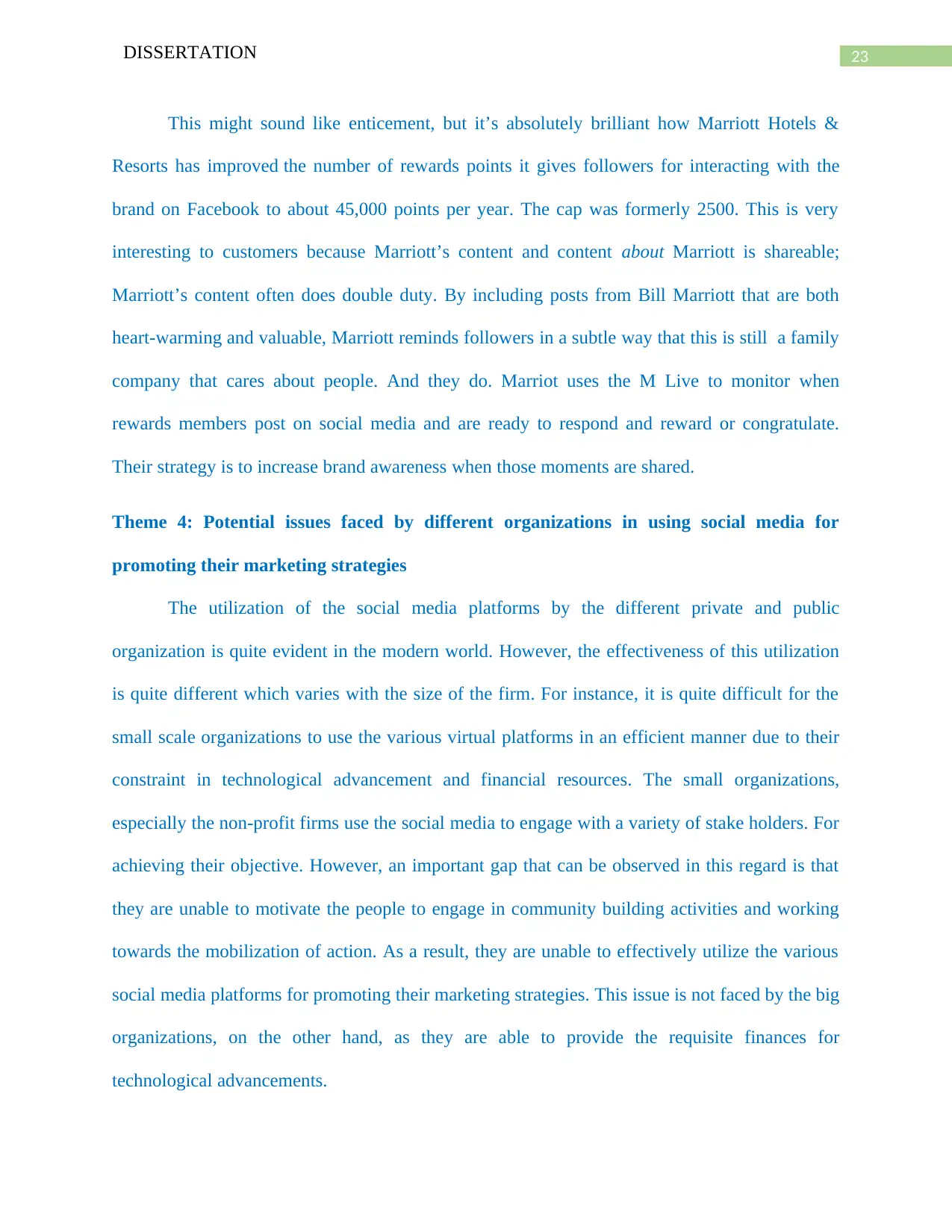
23DISSERTATION
This might sound like enticement, but it’s absolutely brilliant how Marriott Hotels &
Resorts has improved the number of rewards points it gives followers for interacting with the
brand on Facebook to about 45,000 points per year. The cap was formerly 2500. This is very
interesting to customers because Marriott’s content and content about Marriott is shareable;
Marriott’s content often does double duty. By including posts from Bill Marriott that are both
heart-warming and valuable, Marriott reminds followers in a subtle way that this is still a family
company that cares about people. And they do. Marriot uses the M Live to monitor when
rewards members post on social media and are ready to respond and reward or congratulate.
Their strategy is to increase brand awareness when those moments are shared.
Theme 4: Potential issues faced by different organizations in using social media for
promoting their marketing strategies
The utilization of the social media platforms by the different private and public
organization is quite evident in the modern world. However, the effectiveness of this utilization
is quite different which varies with the size of the firm. For instance, it is quite difficult for the
small scale organizations to use the various virtual platforms in an efficient manner due to their
constraint in technological advancement and financial resources. The small organizations,
especially the non-profit firms use the social media to engage with a variety of stake holders. For
achieving their objective. However, an important gap that can be observed in this regard is that
they are unable to motivate the people to engage in community building activities and working
towards the mobilization of action. As a result, they are unable to effectively utilize the various
social media platforms for promoting their marketing strategies. This issue is not faced by the big
organizations, on the other hand, as they are able to provide the requisite finances for
technological advancements.
This might sound like enticement, but it’s absolutely brilliant how Marriott Hotels &
Resorts has improved the number of rewards points it gives followers for interacting with the
brand on Facebook to about 45,000 points per year. The cap was formerly 2500. This is very
interesting to customers because Marriott’s content and content about Marriott is shareable;
Marriott’s content often does double duty. By including posts from Bill Marriott that are both
heart-warming and valuable, Marriott reminds followers in a subtle way that this is still a family
company that cares about people. And they do. Marriot uses the M Live to monitor when
rewards members post on social media and are ready to respond and reward or congratulate.
Their strategy is to increase brand awareness when those moments are shared.
Theme 4: Potential issues faced by different organizations in using social media for
promoting their marketing strategies
The utilization of the social media platforms by the different private and public
organization is quite evident in the modern world. However, the effectiveness of this utilization
is quite different which varies with the size of the firm. For instance, it is quite difficult for the
small scale organizations to use the various virtual platforms in an efficient manner due to their
constraint in technological advancement and financial resources. The small organizations,
especially the non-profit firms use the social media to engage with a variety of stake holders. For
achieving their objective. However, an important gap that can be observed in this regard is that
they are unable to motivate the people to engage in community building activities and working
towards the mobilization of action. As a result, they are unable to effectively utilize the various
social media platforms for promoting their marketing strategies. This issue is not faced by the big
organizations, on the other hand, as they are able to provide the requisite finances for
technological advancements.
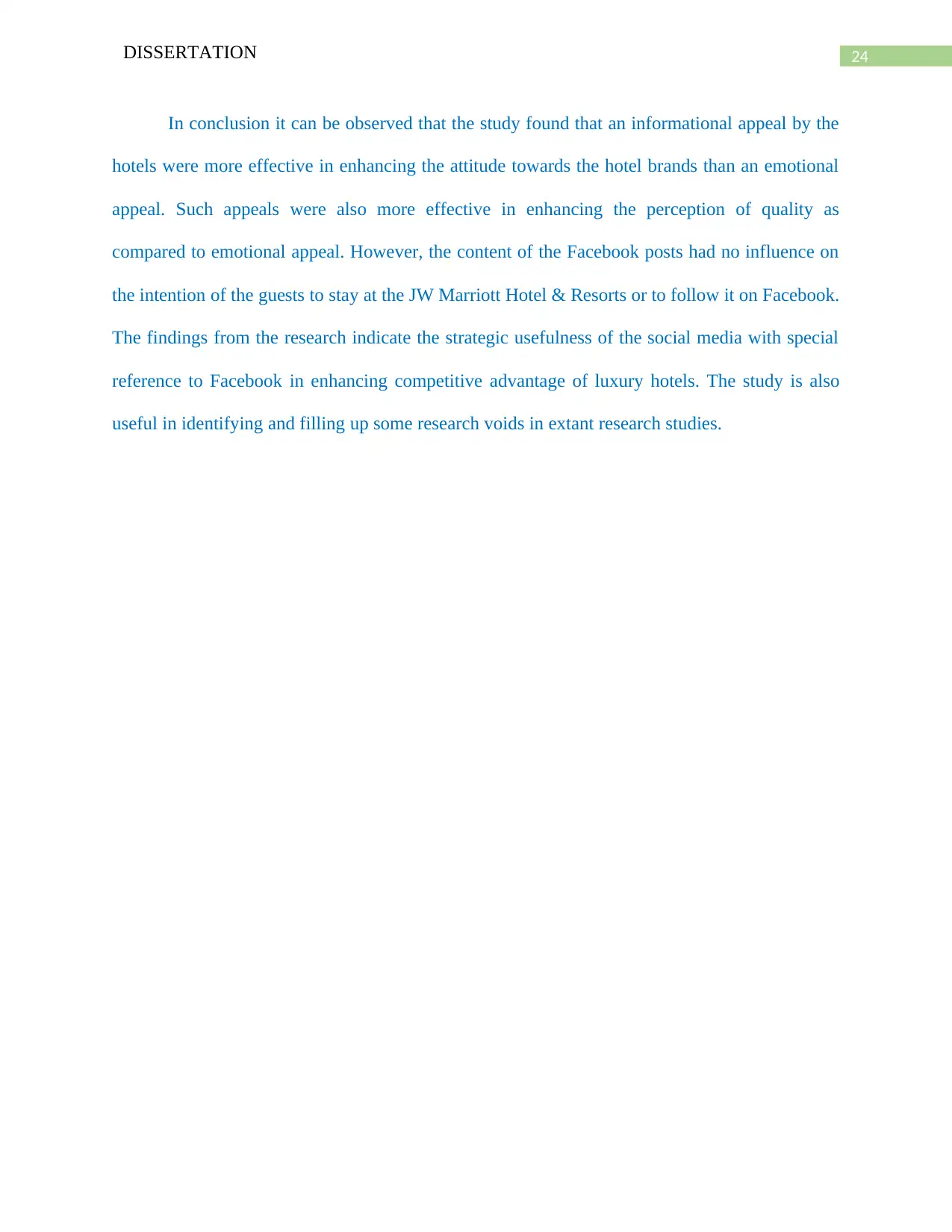
24DISSERTATION
In conclusion it can be observed that the study found that an informational appeal by the
hotels were more effective in enhancing the attitude towards the hotel brands than an emotional
appeal. Such appeals were also more effective in enhancing the perception of quality as
compared to emotional appeal. However, the content of the Facebook posts had no influence on
the intention of the guests to stay at the JW Marriott Hotel & Resorts or to follow it on Facebook.
The findings from the research indicate the strategic usefulness of the social media with special
reference to Facebook in enhancing competitive advantage of luxury hotels. The study is also
useful in identifying and filling up some research voids in extant research studies.
In conclusion it can be observed that the study found that an informational appeal by the
hotels were more effective in enhancing the attitude towards the hotel brands than an emotional
appeal. Such appeals were also more effective in enhancing the perception of quality as
compared to emotional appeal. However, the content of the Facebook posts had no influence on
the intention of the guests to stay at the JW Marriott Hotel & Resorts or to follow it on Facebook.
The findings from the research indicate the strategic usefulness of the social media with special
reference to Facebook in enhancing competitive advantage of luxury hotels. The study is also
useful in identifying and filling up some research voids in extant research studies.
Paraphrase This Document
Need a fresh take? Get an instant paraphrase of this document with our AI Paraphraser
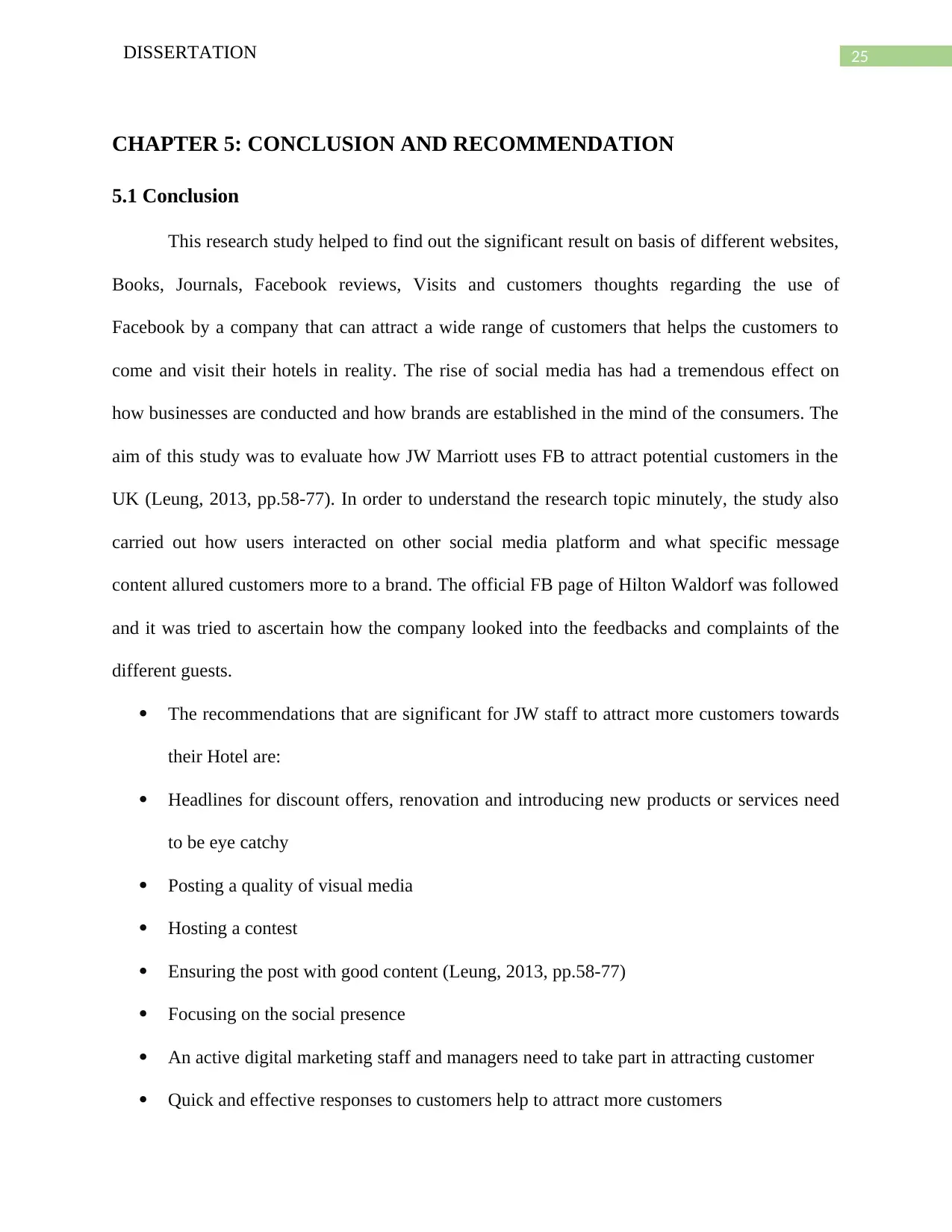
25DISSERTATION
CHAPTER 5: CONCLUSION AND RECOMMENDATION
5.1 Conclusion
This research study helped to find out the significant result on basis of different websites,
Books, Journals, Facebook reviews, Visits and customers thoughts regarding the use of
Facebook by a company that can attract a wide range of customers that helps the customers to
come and visit their hotels in reality. The rise of social media has had a tremendous effect on
how businesses are conducted and how brands are established in the mind of the consumers. The
aim of this study was to evaluate how JW Marriott uses FB to attract potential customers in the
UK (Leung, 2013, pp.58-77). In order to understand the research topic minutely, the study also
carried out how users interacted on other social media platform and what specific message
content allured customers more to a brand. The official FB page of Hilton Waldorf was followed
and it was tried to ascertain how the company looked into the feedbacks and complaints of the
different guests.
The recommendations that are significant for JW staff to attract more customers towards
their Hotel are:
Headlines for discount offers, renovation and introducing new products or services need
to be eye catchy
Posting a quality of visual media
Hosting a contest
Ensuring the post with good content (Leung, 2013, pp.58-77)
Focusing on the social presence
An active digital marketing staff and managers need to take part in attracting customer
Quick and effective responses to customers help to attract more customers
CHAPTER 5: CONCLUSION AND RECOMMENDATION
5.1 Conclusion
This research study helped to find out the significant result on basis of different websites,
Books, Journals, Facebook reviews, Visits and customers thoughts regarding the use of
Facebook by a company that can attract a wide range of customers that helps the customers to
come and visit their hotels in reality. The rise of social media has had a tremendous effect on
how businesses are conducted and how brands are established in the mind of the consumers. The
aim of this study was to evaluate how JW Marriott uses FB to attract potential customers in the
UK (Leung, 2013, pp.58-77). In order to understand the research topic minutely, the study also
carried out how users interacted on other social media platform and what specific message
content allured customers more to a brand. The official FB page of Hilton Waldorf was followed
and it was tried to ascertain how the company looked into the feedbacks and complaints of the
different guests.
The recommendations that are significant for JW staff to attract more customers towards
their Hotel are:
Headlines for discount offers, renovation and introducing new products or services need
to be eye catchy
Posting a quality of visual media
Hosting a contest
Ensuring the post with good content (Leung, 2013, pp.58-77)
Focusing on the social presence
An active digital marketing staff and managers need to take part in attracting customer
Quick and effective responses to customers help to attract more customers
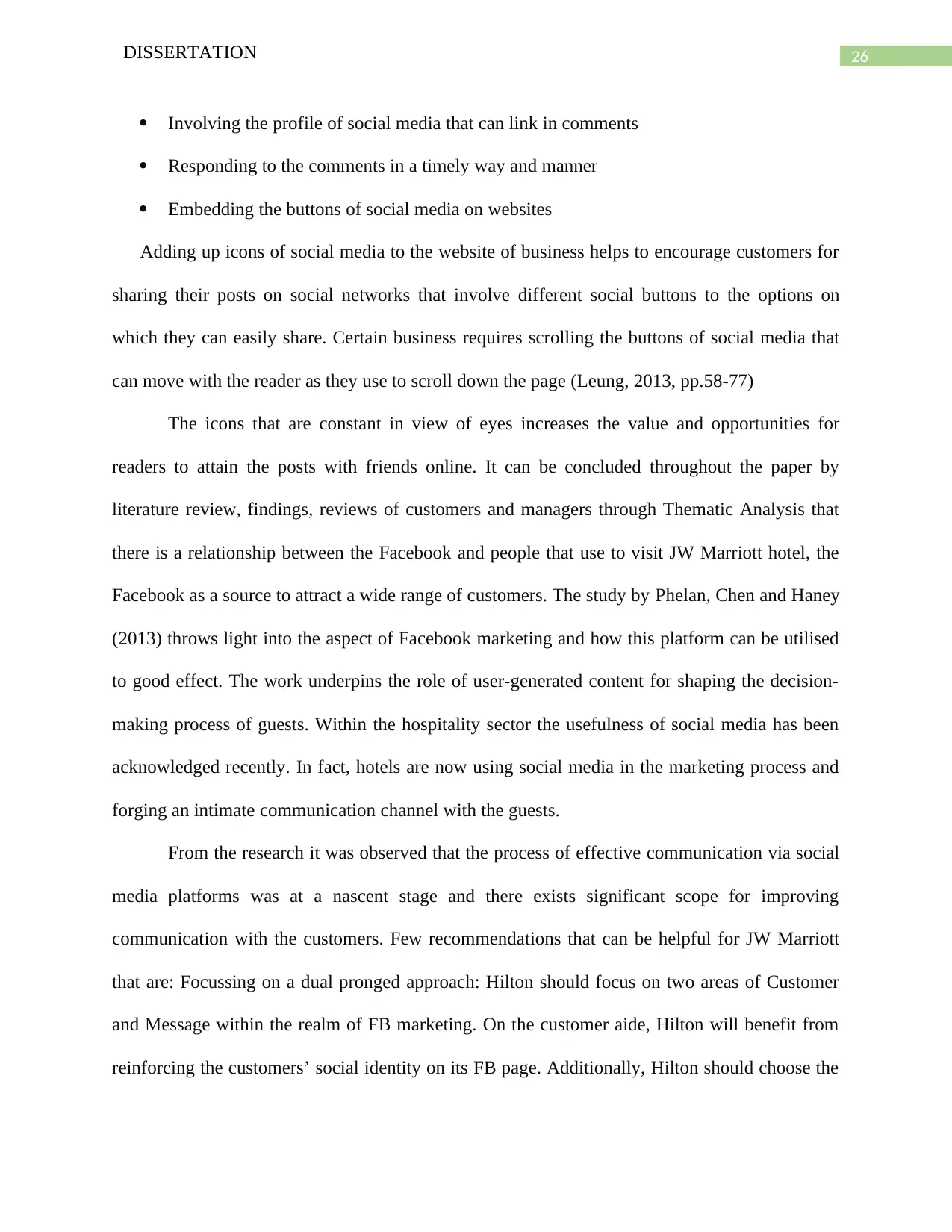
26DISSERTATION
Involving the profile of social media that can link in comments
Responding to the comments in a timely way and manner
Embedding the buttons of social media on websites
Adding up icons of social media to the website of business helps to encourage customers for
sharing their posts on social networks that involve different social buttons to the options on
which they can easily share. Certain business requires scrolling the buttons of social media that
can move with the reader as they use to scroll down the page (Leung, 2013, pp.58-77)
The icons that are constant in view of eyes increases the value and opportunities for
readers to attain the posts with friends online. It can be concluded throughout the paper by
literature review, findings, reviews of customers and managers through Thematic Analysis that
there is a relationship between the Facebook and people that use to visit JW Marriott hotel, the
Facebook as a source to attract a wide range of customers. The study by Phelan, Chen and Haney
(2013) throws light into the aspect of Facebook marketing and how this platform can be utilised
to good effect. The work underpins the role of user-generated content for shaping the decision-
making process of guests. Within the hospitality sector the usefulness of social media has been
acknowledged recently. In fact, hotels are now using social media in the marketing process and
forging an intimate communication channel with the guests.
From the research it was observed that the process of effective communication via social
media platforms was at a nascent stage and there exists significant scope for improving
communication with the customers. Few recommendations that can be helpful for JW Marriott
that are: Focussing on a dual pronged approach: Hilton should focus on two areas of Customer
and Message within the realm of FB marketing. On the customer aide, Hilton will benefit from
reinforcing the customers’ social identity on its FB page. Additionally, Hilton should choose the
Involving the profile of social media that can link in comments
Responding to the comments in a timely way and manner
Embedding the buttons of social media on websites
Adding up icons of social media to the website of business helps to encourage customers for
sharing their posts on social networks that involve different social buttons to the options on
which they can easily share. Certain business requires scrolling the buttons of social media that
can move with the reader as they use to scroll down the page (Leung, 2013, pp.58-77)
The icons that are constant in view of eyes increases the value and opportunities for
readers to attain the posts with friends online. It can be concluded throughout the paper by
literature review, findings, reviews of customers and managers through Thematic Analysis that
there is a relationship between the Facebook and people that use to visit JW Marriott hotel, the
Facebook as a source to attract a wide range of customers. The study by Phelan, Chen and Haney
(2013) throws light into the aspect of Facebook marketing and how this platform can be utilised
to good effect. The work underpins the role of user-generated content for shaping the decision-
making process of guests. Within the hospitality sector the usefulness of social media has been
acknowledged recently. In fact, hotels are now using social media in the marketing process and
forging an intimate communication channel with the guests.
From the research it was observed that the process of effective communication via social
media platforms was at a nascent stage and there exists significant scope for improving
communication with the customers. Few recommendations that can be helpful for JW Marriott
that are: Focussing on a dual pronged approach: Hilton should focus on two areas of Customer
and Message within the realm of FB marketing. On the customer aide, Hilton will benefit from
reinforcing the customers’ social identity on its FB page. Additionally, Hilton should choose the
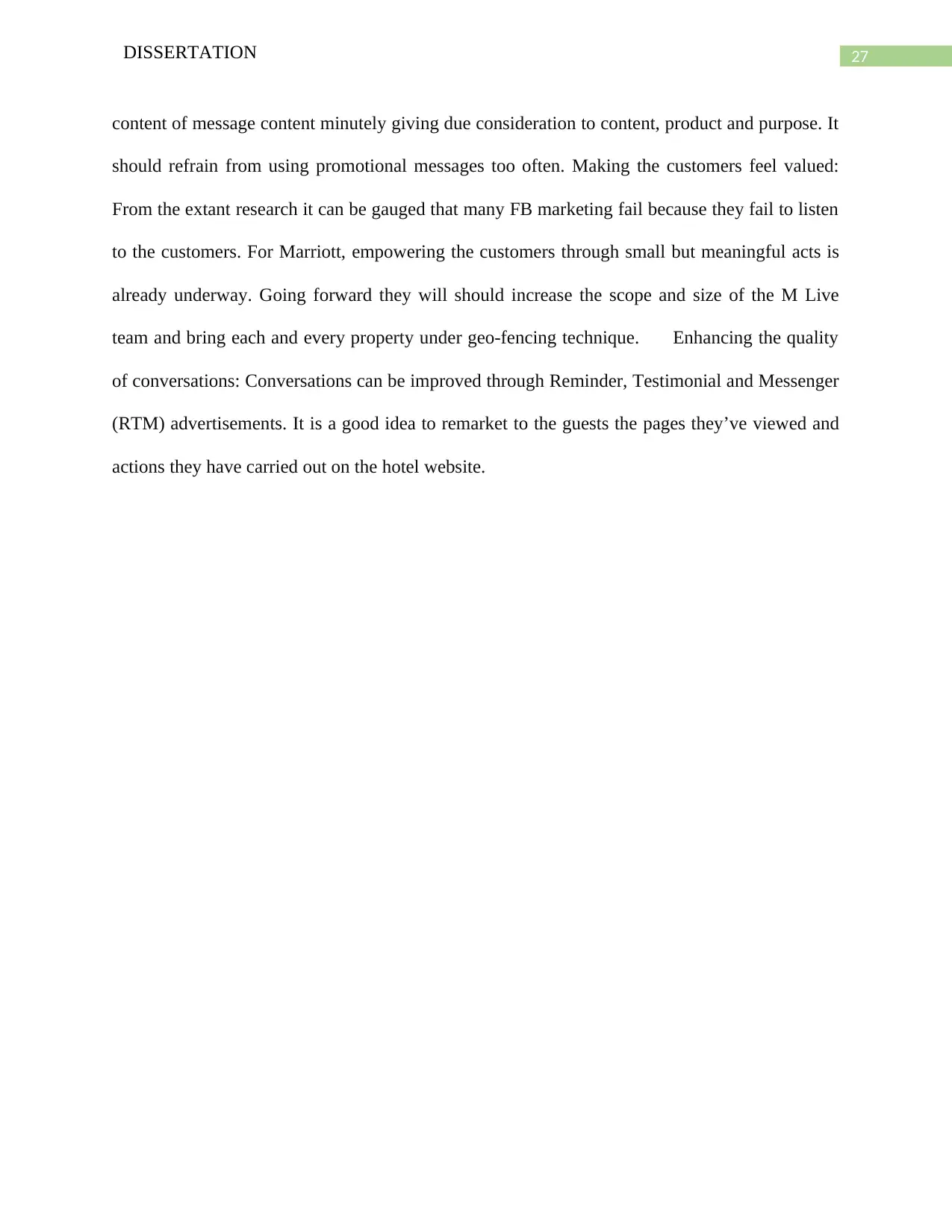
27DISSERTATION
content of message content minutely giving due consideration to content, product and purpose. It
should refrain from using promotional messages too often. Making the customers feel valued:
From the extant research it can be gauged that many FB marketing fail because they fail to listen
to the customers. For Marriott, empowering the customers through small but meaningful acts is
already underway. Going forward they will should increase the scope and size of the M Live
team and bring each and every property under geo-fencing technique. Enhancing the quality
of conversations: Conversations can be improved through Reminder, Testimonial and Messenger
(RTM) advertisements. It is a good idea to remarket to the guests the pages they’ve viewed and
actions they have carried out on the hotel website.
content of message content minutely giving due consideration to content, product and purpose. It
should refrain from using promotional messages too often. Making the customers feel valued:
From the extant research it can be gauged that many FB marketing fail because they fail to listen
to the customers. For Marriott, empowering the customers through small but meaningful acts is
already underway. Going forward they will should increase the scope and size of the M Live
team and bring each and every property under geo-fencing technique. Enhancing the quality
of conversations: Conversations can be improved through Reminder, Testimonial and Messenger
(RTM) advertisements. It is a good idea to remarket to the guests the pages they’ve viewed and
actions they have carried out on the hotel website.
Secure Best Marks with AI Grader
Need help grading? Try our AI Grader for instant feedback on your assignments.
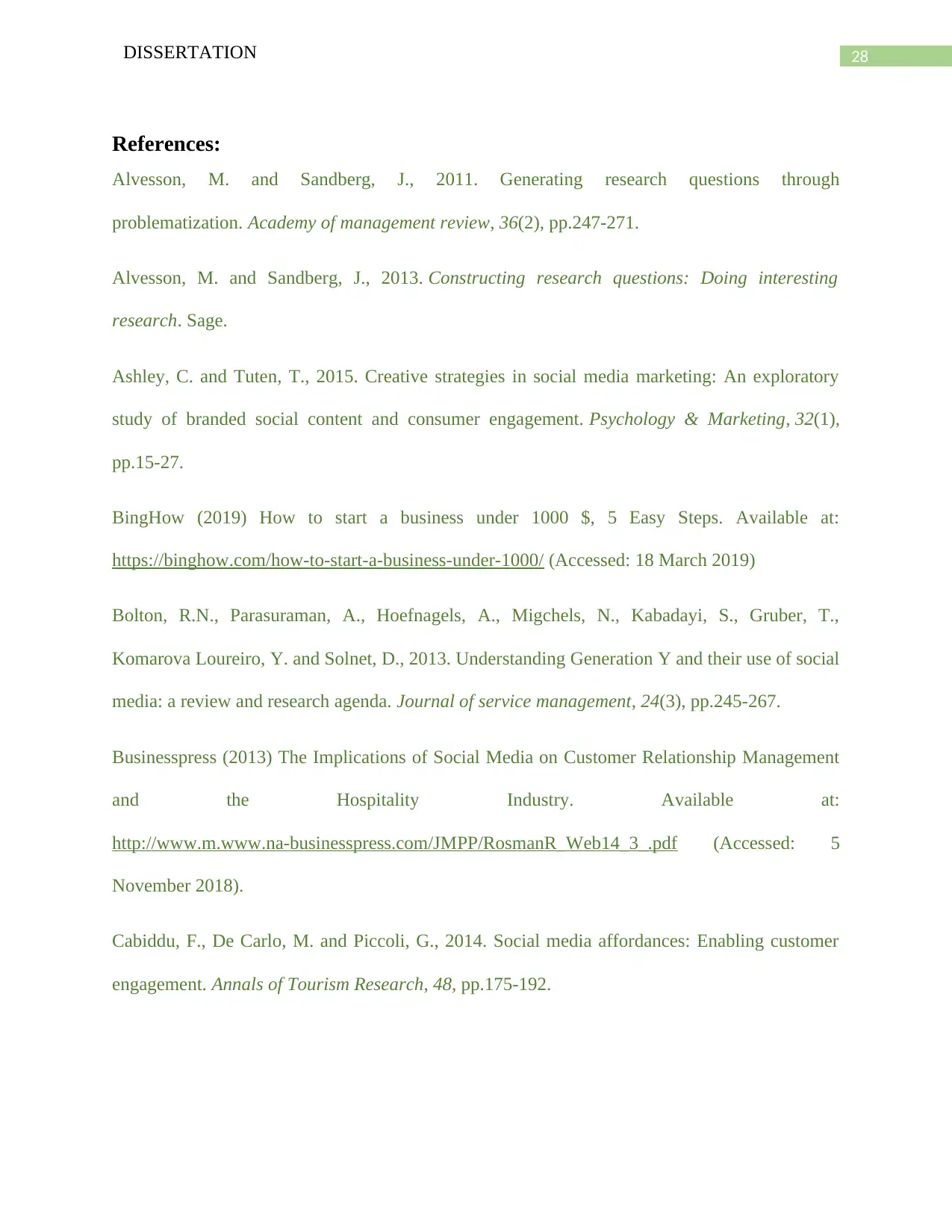
28DISSERTATION
References:
Alvesson, M. and Sandberg, J., 2011. Generating research questions through
problematization. Academy of management review, 36(2), pp.247-271.
Alvesson, M. and Sandberg, J., 2013. Constructing research questions: Doing interesting
research. Sage.
Ashley, C. and Tuten, T., 2015. Creative strategies in social media marketing: An exploratory
study of branded social content and consumer engagement. Psychology & Marketing, 32(1),
pp.15-27.
BingHow (2019) How to start a business under 1000 $, 5 Easy Steps. Available at:
https://binghow.com/how-to-start-a-business-under-1000/ (Accessed: 18 March 2019)
Bolton, R.N., Parasuraman, A., Hoefnagels, A., Migchels, N., Kabadayi, S., Gruber, T.,
Komarova Loureiro, Y. and Solnet, D., 2013. Understanding Generation Y and their use of social
media: a review and research agenda. Journal of service management, 24(3), pp.245-267.
Businesspress (2013) The Implications of Social Media on Customer Relationship Management
and the Hospitality Industry. Available at:
http://www.m.www.na-businesspress.com/JMPP/RosmanR_Web14_3_.pdf (Accessed: 5
November 2018).
Cabiddu, F., De Carlo, M. and Piccoli, G., 2014. Social media affordances: Enabling customer
engagement. Annals of Tourism Research, 48, pp.175-192.
References:
Alvesson, M. and Sandberg, J., 2011. Generating research questions through
problematization. Academy of management review, 36(2), pp.247-271.
Alvesson, M. and Sandberg, J., 2013. Constructing research questions: Doing interesting
research. Sage.
Ashley, C. and Tuten, T., 2015. Creative strategies in social media marketing: An exploratory
study of branded social content and consumer engagement. Psychology & Marketing, 32(1),
pp.15-27.
BingHow (2019) How to start a business under 1000 $, 5 Easy Steps. Available at:
https://binghow.com/how-to-start-a-business-under-1000/ (Accessed: 18 March 2019)
Bolton, R.N., Parasuraman, A., Hoefnagels, A., Migchels, N., Kabadayi, S., Gruber, T.,
Komarova Loureiro, Y. and Solnet, D., 2013. Understanding Generation Y and their use of social
media: a review and research agenda. Journal of service management, 24(3), pp.245-267.
Businesspress (2013) The Implications of Social Media on Customer Relationship Management
and the Hospitality Industry. Available at:
http://www.m.www.na-businesspress.com/JMPP/RosmanR_Web14_3_.pdf (Accessed: 5
November 2018).
Cabiddu, F., De Carlo, M. and Piccoli, G., 2014. Social media affordances: Enabling customer
engagement. Annals of Tourism Research, 48, pp.175-192.
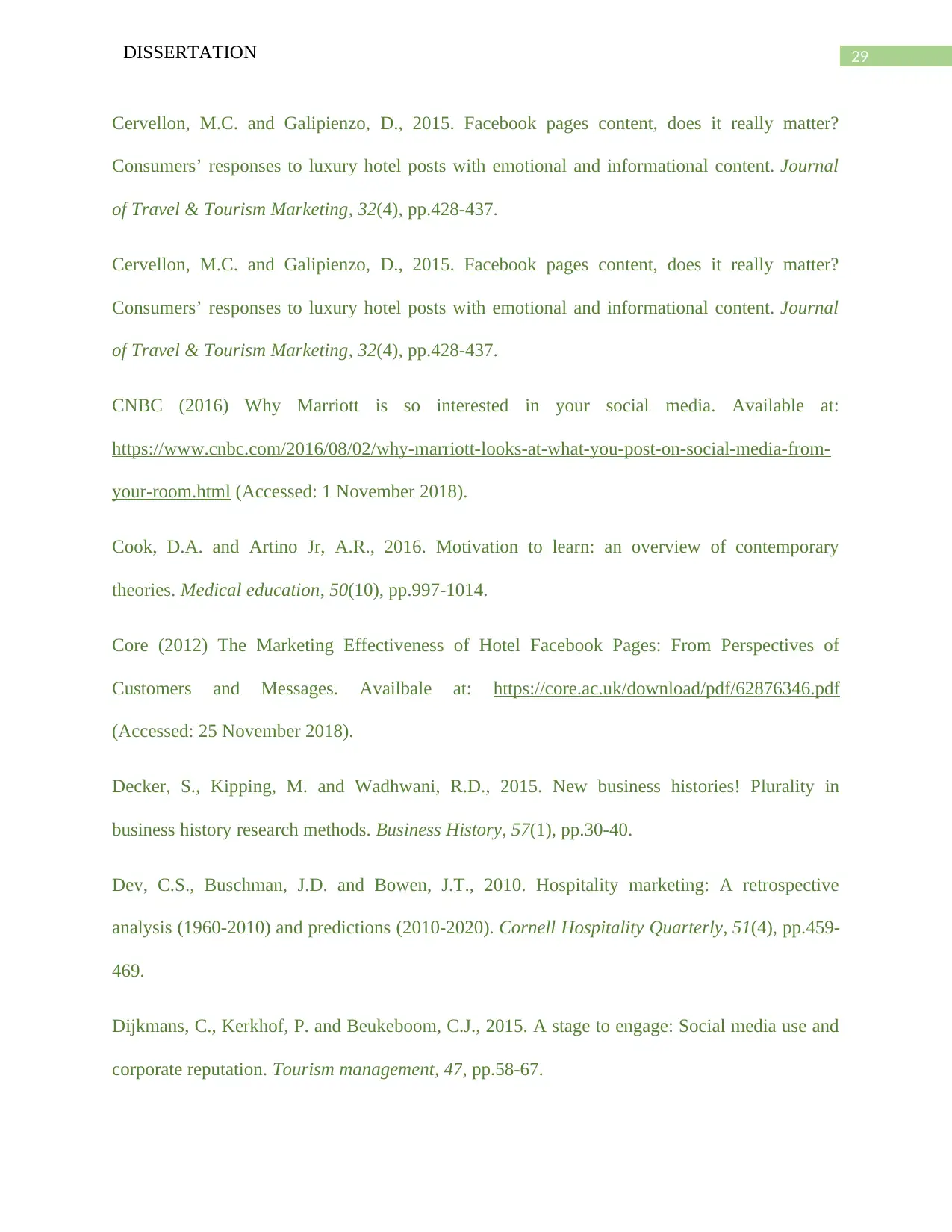
29DISSERTATION
Cervellon, M.C. and Galipienzo, D., 2015. Facebook pages content, does it really matter?
Consumers’ responses to luxury hotel posts with emotional and informational content. Journal
of Travel & Tourism Marketing, 32(4), pp.428-437.
Cervellon, M.C. and Galipienzo, D., 2015. Facebook pages content, does it really matter?
Consumers’ responses to luxury hotel posts with emotional and informational content. Journal
of Travel & Tourism Marketing, 32(4), pp.428-437.
CNBC (2016) Why Marriott is so interested in your social media. Available at:
https://www.cnbc.com/2016/08/02/why-marriott-looks-at-what-you-post-on-social-media-from-
your-room.html (Accessed: 1 November 2018).
Cook, D.A. and Artino Jr, A.R., 2016. Motivation to learn: an overview of contemporary
theories. Medical education, 50(10), pp.997-1014.
Core (2012) The Marketing Effectiveness of Hotel Facebook Pages: From Perspectives of
Customers and Messages. Availbale at: https://core.ac.uk/download/pdf/62876346.pdf
(Accessed: 25 November 2018).
Decker, S., Kipping, M. and Wadhwani, R.D., 2015. New business histories! Plurality in
business history research methods. Business History, 57(1), pp.30-40.
Dev, C.S., Buschman, J.D. and Bowen, J.T., 2010. Hospitality marketing: A retrospective
analysis (1960-2010) and predictions (2010-2020). Cornell Hospitality Quarterly, 51(4), pp.459-
469.
Dijkmans, C., Kerkhof, P. and Beukeboom, C.J., 2015. A stage to engage: Social media use and
corporate reputation. Tourism management, 47, pp.58-67.
Cervellon, M.C. and Galipienzo, D., 2015. Facebook pages content, does it really matter?
Consumers’ responses to luxury hotel posts with emotional and informational content. Journal
of Travel & Tourism Marketing, 32(4), pp.428-437.
Cervellon, M.C. and Galipienzo, D., 2015. Facebook pages content, does it really matter?
Consumers’ responses to luxury hotel posts with emotional and informational content. Journal
of Travel & Tourism Marketing, 32(4), pp.428-437.
CNBC (2016) Why Marriott is so interested in your social media. Available at:
https://www.cnbc.com/2016/08/02/why-marriott-looks-at-what-you-post-on-social-media-from-
your-room.html (Accessed: 1 November 2018).
Cook, D.A. and Artino Jr, A.R., 2016. Motivation to learn: an overview of contemporary
theories. Medical education, 50(10), pp.997-1014.
Core (2012) The Marketing Effectiveness of Hotel Facebook Pages: From Perspectives of
Customers and Messages. Availbale at: https://core.ac.uk/download/pdf/62876346.pdf
(Accessed: 25 November 2018).
Decker, S., Kipping, M. and Wadhwani, R.D., 2015. New business histories! Plurality in
business history research methods. Business History, 57(1), pp.30-40.
Dev, C.S., Buschman, J.D. and Bowen, J.T., 2010. Hospitality marketing: A retrospective
analysis (1960-2010) and predictions (2010-2020). Cornell Hospitality Quarterly, 51(4), pp.459-
469.
Dijkmans, C., Kerkhof, P. and Beukeboom, C.J., 2015. A stage to engage: Social media use and
corporate reputation. Tourism management, 47, pp.58-67.
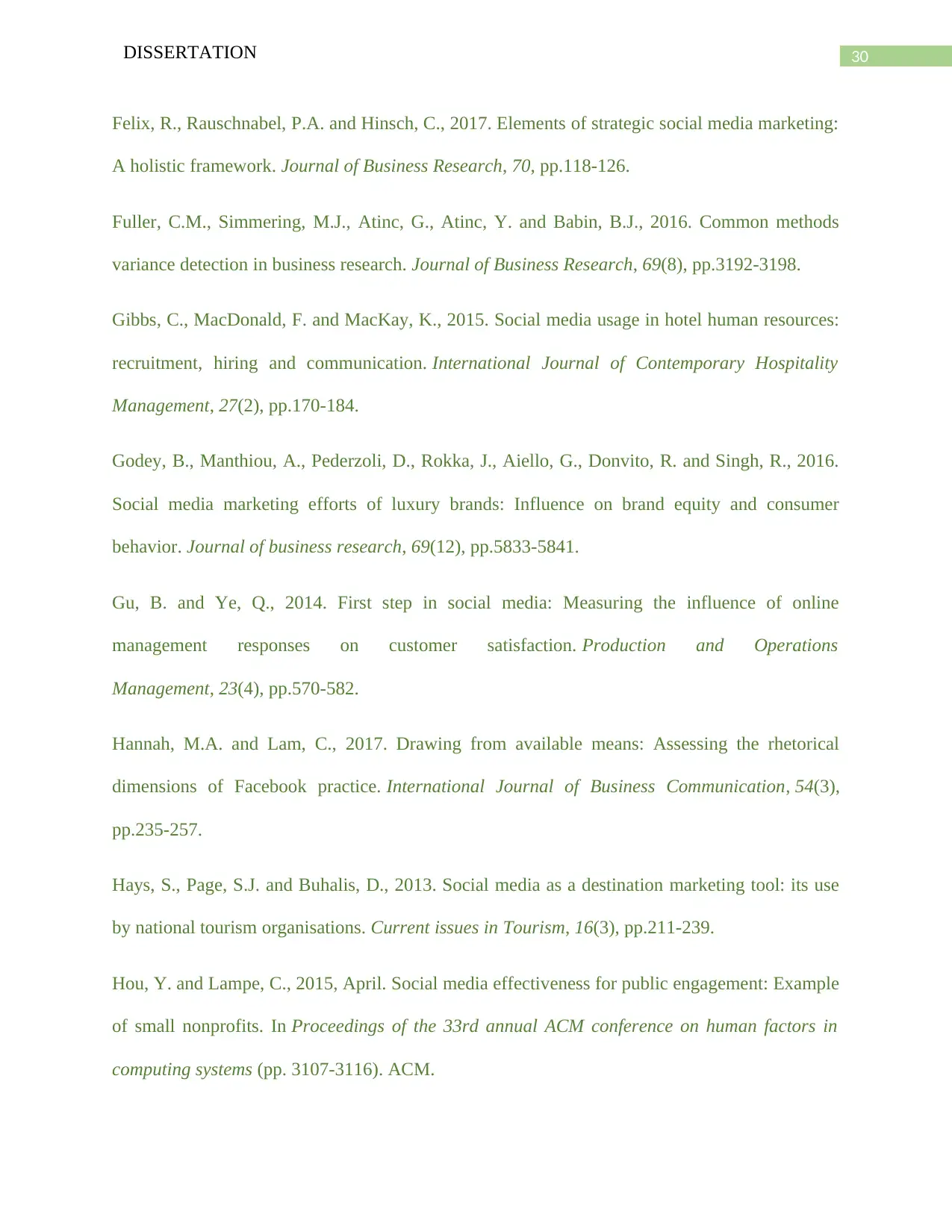
30DISSERTATION
Felix, R., Rauschnabel, P.A. and Hinsch, C., 2017. Elements of strategic social media marketing:
A holistic framework. Journal of Business Research, 70, pp.118-126.
Fuller, C.M., Simmering, M.J., Atinc, G., Atinc, Y. and Babin, B.J., 2016. Common methods
variance detection in business research. Journal of Business Research, 69(8), pp.3192-3198.
Gibbs, C., MacDonald, F. and MacKay, K., 2015. Social media usage in hotel human resources:
recruitment, hiring and communication. International Journal of Contemporary Hospitality
Management, 27(2), pp.170-184.
Godey, B., Manthiou, A., Pederzoli, D., Rokka, J., Aiello, G., Donvito, R. and Singh, R., 2016.
Social media marketing efforts of luxury brands: Influence on brand equity and consumer
behavior. Journal of business research, 69(12), pp.5833-5841.
Gu, B. and Ye, Q., 2014. First step in social media: Measuring the influence of online
management responses on customer satisfaction. Production and Operations
Management, 23(4), pp.570-582.
Hannah, M.A. and Lam, C., 2017. Drawing from available means: Assessing the rhetorical
dimensions of Facebook practice. International Journal of Business Communication, 54(3),
pp.235-257.
Hays, S., Page, S.J. and Buhalis, D., 2013. Social media as a destination marketing tool: its use
by national tourism organisations. Current issues in Tourism, 16(3), pp.211-239.
Hou, Y. and Lampe, C., 2015, April. Social media effectiveness for public engagement: Example
of small nonprofits. In Proceedings of the 33rd annual ACM conference on human factors in
computing systems (pp. 3107-3116). ACM.
Felix, R., Rauschnabel, P.A. and Hinsch, C., 2017. Elements of strategic social media marketing:
A holistic framework. Journal of Business Research, 70, pp.118-126.
Fuller, C.M., Simmering, M.J., Atinc, G., Atinc, Y. and Babin, B.J., 2016. Common methods
variance detection in business research. Journal of Business Research, 69(8), pp.3192-3198.
Gibbs, C., MacDonald, F. and MacKay, K., 2015. Social media usage in hotel human resources:
recruitment, hiring and communication. International Journal of Contemporary Hospitality
Management, 27(2), pp.170-184.
Godey, B., Manthiou, A., Pederzoli, D., Rokka, J., Aiello, G., Donvito, R. and Singh, R., 2016.
Social media marketing efforts of luxury brands: Influence on brand equity and consumer
behavior. Journal of business research, 69(12), pp.5833-5841.
Gu, B. and Ye, Q., 2014. First step in social media: Measuring the influence of online
management responses on customer satisfaction. Production and Operations
Management, 23(4), pp.570-582.
Hannah, M.A. and Lam, C., 2017. Drawing from available means: Assessing the rhetorical
dimensions of Facebook practice. International Journal of Business Communication, 54(3),
pp.235-257.
Hays, S., Page, S.J. and Buhalis, D., 2013. Social media as a destination marketing tool: its use
by national tourism organisations. Current issues in Tourism, 16(3), pp.211-239.
Hou, Y. and Lampe, C., 2015, April. Social media effectiveness for public engagement: Example
of small nonprofits. In Proceedings of the 33rd annual ACM conference on human factors in
computing systems (pp. 3107-3116). ACM.
Paraphrase This Document
Need a fresh take? Get an instant paraphrase of this document with our AI Paraphraser
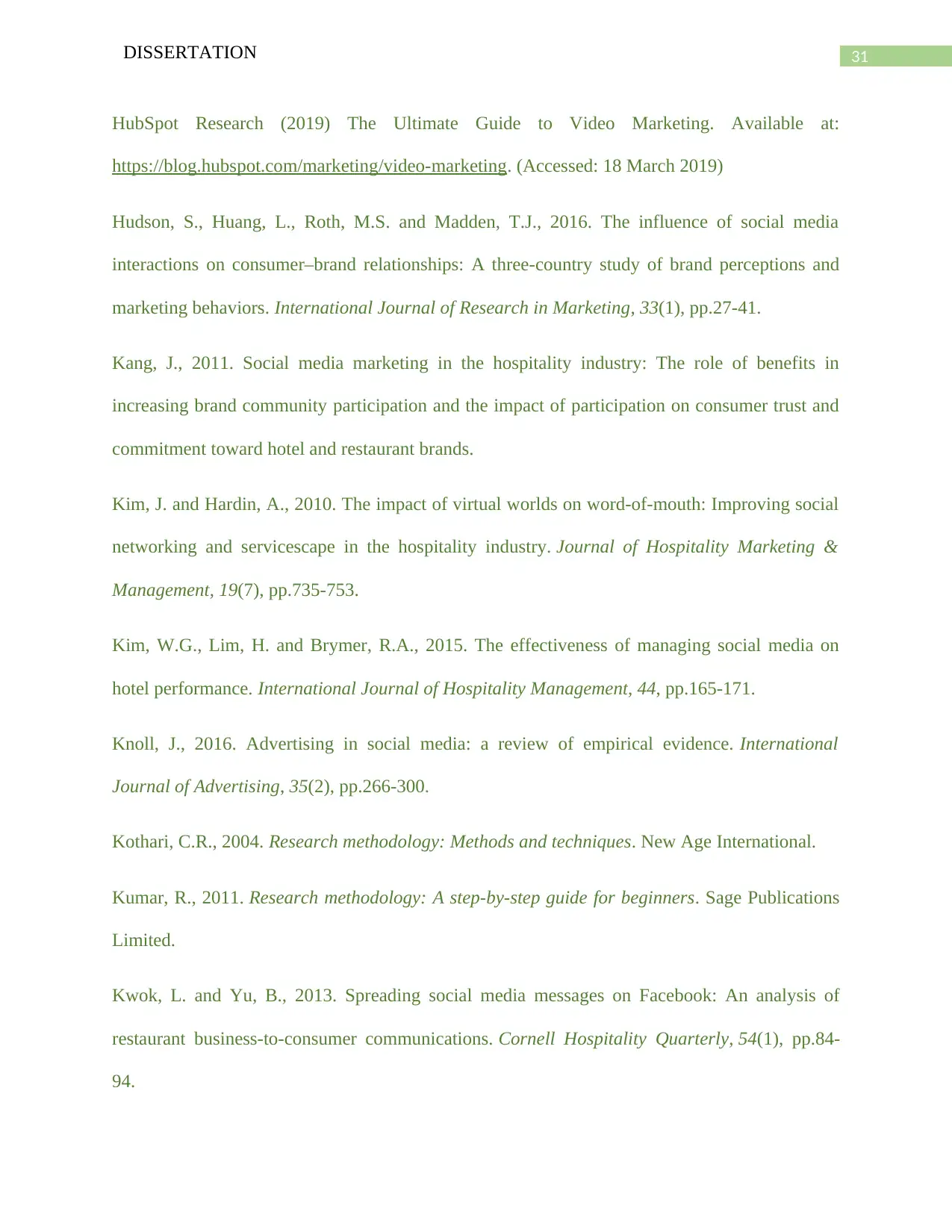
31DISSERTATION
HubSpot Research (2019) The Ultimate Guide to Video Marketing. Available at:
https://blog.hubspot.com/marketing/video-marketing. (Accessed: 18 March 2019)
Hudson, S., Huang, L., Roth, M.S. and Madden, T.J., 2016. The influence of social media
interactions on consumer–brand relationships: A three-country study of brand perceptions and
marketing behaviors. International Journal of Research in Marketing, 33(1), pp.27-41.
Kang, J., 2011. Social media marketing in the hospitality industry: The role of benefits in
increasing brand community participation and the impact of participation on consumer trust and
commitment toward hotel and restaurant brands.
Kim, J. and Hardin, A., 2010. The impact of virtual worlds on word-of-mouth: Improving social
networking and servicescape in the hospitality industry. Journal of Hospitality Marketing &
Management, 19(7), pp.735-753.
Kim, W.G., Lim, H. and Brymer, R.A., 2015. The effectiveness of managing social media on
hotel performance. International Journal of Hospitality Management, 44, pp.165-171.
Knoll, J., 2016. Advertising in social media: a review of empirical evidence. International
Journal of Advertising, 35(2), pp.266-300.
Kothari, C.R., 2004. Research methodology: Methods and techniques. New Age International.
Kumar, R., 2011. Research methodology: A step-by-step guide for beginners. Sage Publications
Limited.
Kwok, L. and Yu, B., 2013. Spreading social media messages on Facebook: An analysis of
restaurant business-to-consumer communications. Cornell Hospitality Quarterly, 54(1), pp.84-
94.
HubSpot Research (2019) The Ultimate Guide to Video Marketing. Available at:
https://blog.hubspot.com/marketing/video-marketing. (Accessed: 18 March 2019)
Hudson, S., Huang, L., Roth, M.S. and Madden, T.J., 2016. The influence of social media
interactions on consumer–brand relationships: A three-country study of brand perceptions and
marketing behaviors. International Journal of Research in Marketing, 33(1), pp.27-41.
Kang, J., 2011. Social media marketing in the hospitality industry: The role of benefits in
increasing brand community participation and the impact of participation on consumer trust and
commitment toward hotel and restaurant brands.
Kim, J. and Hardin, A., 2010. The impact of virtual worlds on word-of-mouth: Improving social
networking and servicescape in the hospitality industry. Journal of Hospitality Marketing &
Management, 19(7), pp.735-753.
Kim, W.G., Lim, H. and Brymer, R.A., 2015. The effectiveness of managing social media on
hotel performance. International Journal of Hospitality Management, 44, pp.165-171.
Knoll, J., 2016. Advertising in social media: a review of empirical evidence. International
Journal of Advertising, 35(2), pp.266-300.
Kothari, C.R., 2004. Research methodology: Methods and techniques. New Age International.
Kumar, R., 2011. Research methodology: A step-by-step guide for beginners. Sage Publications
Limited.
Kwok, L. and Yu, B., 2013. Spreading social media messages on Facebook: An analysis of
restaurant business-to-consumer communications. Cornell Hospitality Quarterly, 54(1), pp.84-
94.
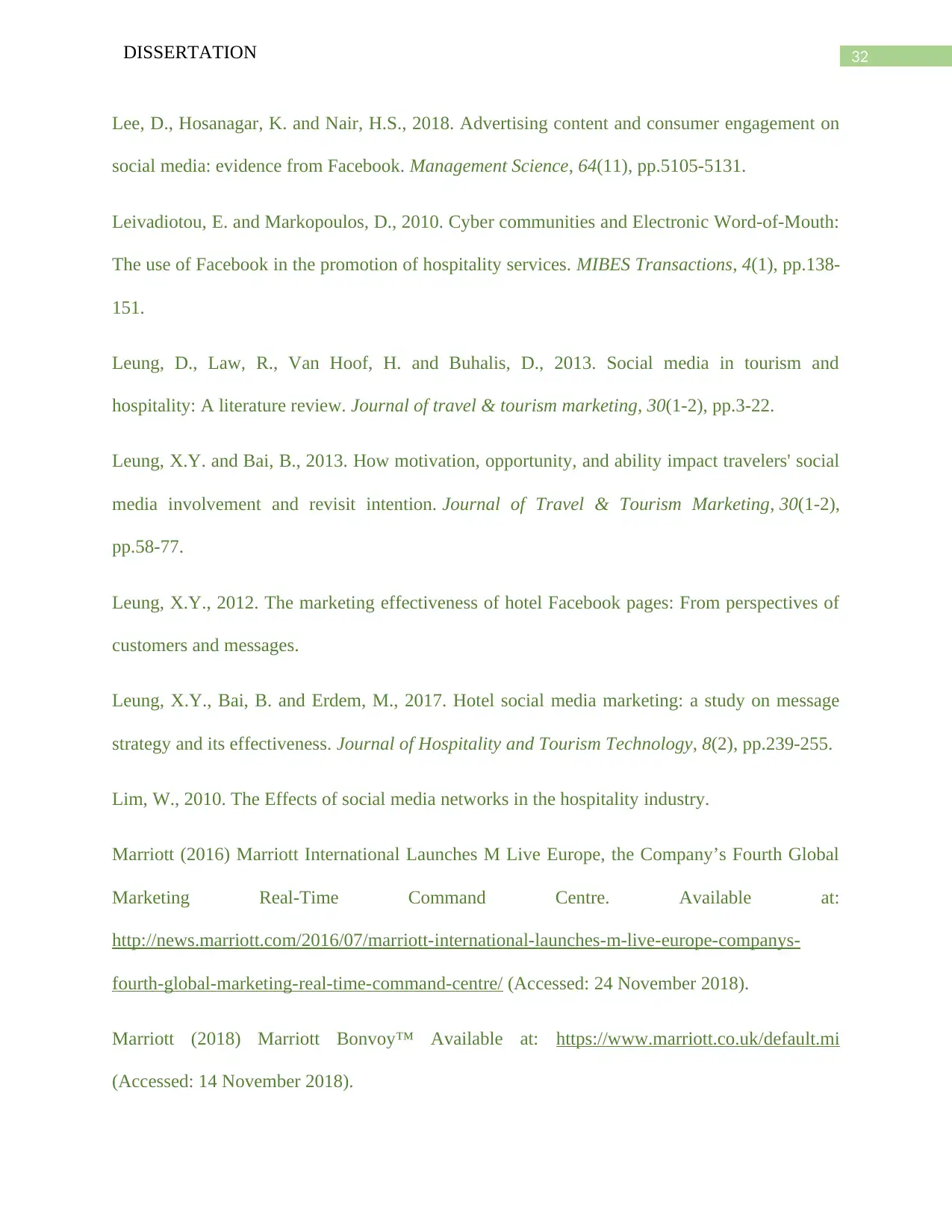
32DISSERTATION
Lee, D., Hosanagar, K. and Nair, H.S., 2018. Advertising content and consumer engagement on
social media: evidence from Facebook. Management Science, 64(11), pp.5105-5131.
Leivadiotou, E. and Markopoulos, D., 2010. Cyber communities and Electronic Word-of-Mouth:
The use of Facebook in the promotion of hospitality services. MIBES Transactions, 4(1), pp.138-
151.
Leung, D., Law, R., Van Hoof, H. and Buhalis, D., 2013. Social media in tourism and
hospitality: A literature review. Journal of travel & tourism marketing, 30(1-2), pp.3-22.
Leung, X.Y. and Bai, B., 2013. How motivation, opportunity, and ability impact travelers' social
media involvement and revisit intention. Journal of Travel & Tourism Marketing, 30(1-2),
pp.58-77.
Leung, X.Y., 2012. The marketing effectiveness of hotel Facebook pages: From perspectives of
customers and messages.
Leung, X.Y., Bai, B. and Erdem, M., 2017. Hotel social media marketing: a study on message
strategy and its effectiveness. Journal of Hospitality and Tourism Technology, 8(2), pp.239-255.
Lim, W., 2010. The Effects of social media networks in the hospitality industry.
Marriott (2016) Marriott International Launches M Live Europe, the Company’s Fourth Global
Marketing Real-Time Command Centre. Available at:
http://news.marriott.com/2016/07/marriott-international-launches-m-live-europe-companys-
fourth-global-marketing-real-time-command-centre/ (Accessed: 24 November 2018).
Marriott (2018) Marriott Bonvoy™ Available at: https://www.marriott.co.uk/default.mi
(Accessed: 14 November 2018).
Lee, D., Hosanagar, K. and Nair, H.S., 2018. Advertising content and consumer engagement on
social media: evidence from Facebook. Management Science, 64(11), pp.5105-5131.
Leivadiotou, E. and Markopoulos, D., 2010. Cyber communities and Electronic Word-of-Mouth:
The use of Facebook in the promotion of hospitality services. MIBES Transactions, 4(1), pp.138-
151.
Leung, D., Law, R., Van Hoof, H. and Buhalis, D., 2013. Social media in tourism and
hospitality: A literature review. Journal of travel & tourism marketing, 30(1-2), pp.3-22.
Leung, X.Y. and Bai, B., 2013. How motivation, opportunity, and ability impact travelers' social
media involvement and revisit intention. Journal of Travel & Tourism Marketing, 30(1-2),
pp.58-77.
Leung, X.Y., 2012. The marketing effectiveness of hotel Facebook pages: From perspectives of
customers and messages.
Leung, X.Y., Bai, B. and Erdem, M., 2017. Hotel social media marketing: a study on message
strategy and its effectiveness. Journal of Hospitality and Tourism Technology, 8(2), pp.239-255.
Lim, W., 2010. The Effects of social media networks in the hospitality industry.
Marriott (2016) Marriott International Launches M Live Europe, the Company’s Fourth Global
Marketing Real-Time Command Centre. Available at:
http://news.marriott.com/2016/07/marriott-international-launches-m-live-europe-companys-
fourth-global-marketing-real-time-command-centre/ (Accessed: 24 November 2018).
Marriott (2018) Marriott Bonvoy™ Available at: https://www.marriott.co.uk/default.mi
(Accessed: 14 November 2018).
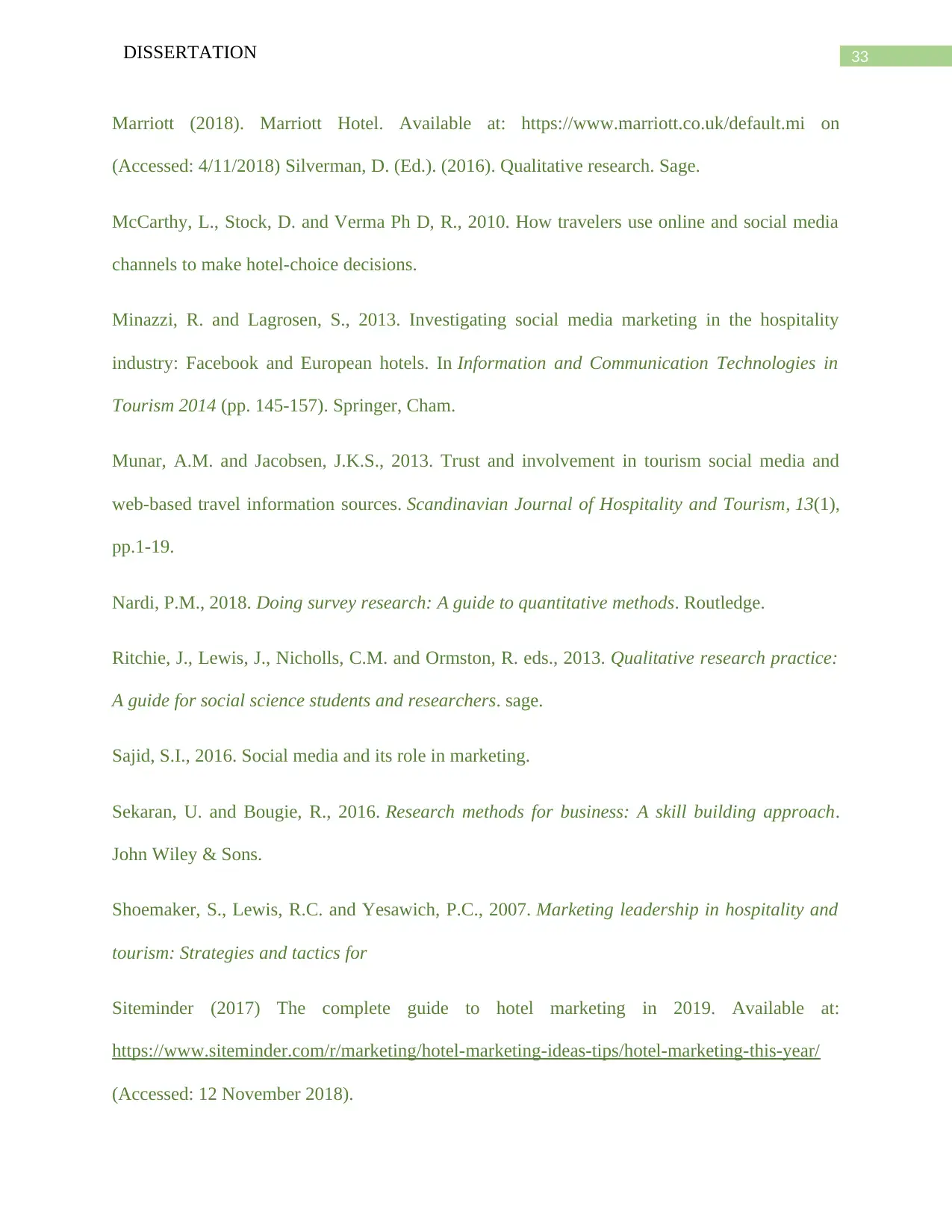
33DISSERTATION
Marriott (2018). Marriott Hotel. Available at: https://www.marriott.co.uk/default.mi on
(Accessed: 4/11/2018) Silverman, D. (Ed.). (2016). Qualitative research. Sage.
McCarthy, L., Stock, D. and Verma Ph D, R., 2010. How travelers use online and social media
channels to make hotel-choice decisions.
Minazzi, R. and Lagrosen, S., 2013. Investigating social media marketing in the hospitality
industry: Facebook and European hotels. In Information and Communication Technologies in
Tourism 2014 (pp. 145-157). Springer, Cham.
Munar, A.M. and Jacobsen, J.K.S., 2013. Trust and involvement in tourism social media and
web-based travel information sources. Scandinavian Journal of Hospitality and Tourism, 13(1),
pp.1-19.
Nardi, P.M., 2018. Doing survey research: A guide to quantitative methods. Routledge.
Ritchie, J., Lewis, J., Nicholls, C.M. and Ormston, R. eds., 2013. Qualitative research practice:
A guide for social science students and researchers. sage.
Sajid, S.I., 2016. Social media and its role in marketing.
Sekaran, U. and Bougie, R., 2016. Research methods for business: A skill building approach.
John Wiley & Sons.
Shoemaker, S., Lewis, R.C. and Yesawich, P.C., 2007. Marketing leadership in hospitality and
tourism: Strategies and tactics for
Siteminder (2017) The complete guide to hotel marketing in 2019. Available at:
https://www.siteminder.com/r/marketing/hotel-marketing-ideas-tips/hotel-marketing-this-year/
(Accessed: 12 November 2018).
Marriott (2018). Marriott Hotel. Available at: https://www.marriott.co.uk/default.mi on
(Accessed: 4/11/2018) Silverman, D. (Ed.). (2016). Qualitative research. Sage.
McCarthy, L., Stock, D. and Verma Ph D, R., 2010. How travelers use online and social media
channels to make hotel-choice decisions.
Minazzi, R. and Lagrosen, S., 2013. Investigating social media marketing in the hospitality
industry: Facebook and European hotels. In Information and Communication Technologies in
Tourism 2014 (pp. 145-157). Springer, Cham.
Munar, A.M. and Jacobsen, J.K.S., 2013. Trust and involvement in tourism social media and
web-based travel information sources. Scandinavian Journal of Hospitality and Tourism, 13(1),
pp.1-19.
Nardi, P.M., 2018. Doing survey research: A guide to quantitative methods. Routledge.
Ritchie, J., Lewis, J., Nicholls, C.M. and Ormston, R. eds., 2013. Qualitative research practice:
A guide for social science students and researchers. sage.
Sajid, S.I., 2016. Social media and its role in marketing.
Sekaran, U. and Bougie, R., 2016. Research methods for business: A skill building approach.
John Wiley & Sons.
Shoemaker, S., Lewis, R.C. and Yesawich, P.C., 2007. Marketing leadership in hospitality and
tourism: Strategies and tactics for
Siteminder (2017) The complete guide to hotel marketing in 2019. Available at:
https://www.siteminder.com/r/marketing/hotel-marketing-ideas-tips/hotel-marketing-this-year/
(Accessed: 12 November 2018).
Secure Best Marks with AI Grader
Need help grading? Try our AI Grader for instant feedback on your assignments.
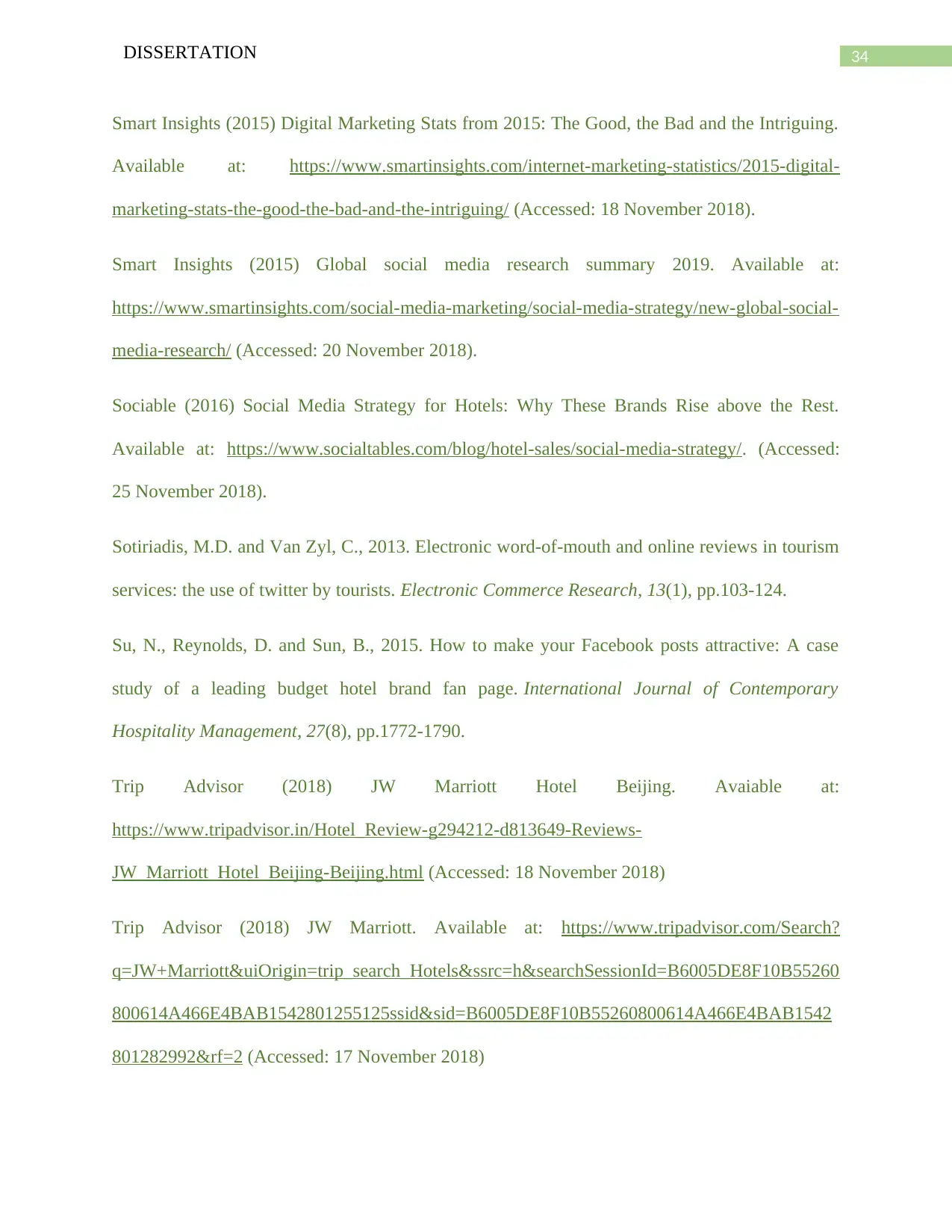
34DISSERTATION
Smart Insights (2015) Digital Marketing Stats from 2015: The Good, the Bad and the Intriguing.
Available at: https://www.smartinsights.com/internet-marketing-statistics/2015-digital-
marketing-stats-the-good-the-bad-and-the-intriguing/ (Accessed: 18 November 2018).
Smart Insights (2015) Global social media research summary 2019. Available at:
https://www.smartinsights.com/social-media-marketing/social-media-strategy/new-global-social-
media-research/ (Accessed: 20 November 2018).
Sociable (2016) Social Media Strategy for Hotels: Why These Brands Rise above the Rest.
Available at: https://www.socialtables.com/blog/hotel-sales/social-media-strategy/. (Accessed:
25 November 2018).
Sotiriadis, M.D. and Van Zyl, C., 2013. Electronic word-of-mouth and online reviews in tourism
services: the use of twitter by tourists. Electronic Commerce Research, 13(1), pp.103-124.
Su, N., Reynolds, D. and Sun, B., 2015. How to make your Facebook posts attractive: A case
study of a leading budget hotel brand fan page. International Journal of Contemporary
Hospitality Management, 27(8), pp.1772-1790.
Trip Advisor (2018) JW Marriott Hotel Beijing. Avaiable at:
https://www.tripadvisor.in/Hotel_Review-g294212-d813649-Reviews-
JW_Marriott_Hotel_Beijing-Beijing.html (Accessed: 18 November 2018)
Trip Advisor (2018) JW Marriott. Available at: https://www.tripadvisor.com/Search?
q=JW+Marriott&uiOrigin=trip_search_Hotels&ssrc=h&searchSessionId=B6005DE8F10B55260
800614A466E4BAB1542801255125ssid&sid=B6005DE8F10B55260800614A466E4BAB1542
801282992&rf=2 (Accessed: 17 November 2018)
Smart Insights (2015) Digital Marketing Stats from 2015: The Good, the Bad and the Intriguing.
Available at: https://www.smartinsights.com/internet-marketing-statistics/2015-digital-
marketing-stats-the-good-the-bad-and-the-intriguing/ (Accessed: 18 November 2018).
Smart Insights (2015) Global social media research summary 2019. Available at:
https://www.smartinsights.com/social-media-marketing/social-media-strategy/new-global-social-
media-research/ (Accessed: 20 November 2018).
Sociable (2016) Social Media Strategy for Hotels: Why These Brands Rise above the Rest.
Available at: https://www.socialtables.com/blog/hotel-sales/social-media-strategy/. (Accessed:
25 November 2018).
Sotiriadis, M.D. and Van Zyl, C., 2013. Electronic word-of-mouth and online reviews in tourism
services: the use of twitter by tourists. Electronic Commerce Research, 13(1), pp.103-124.
Su, N., Reynolds, D. and Sun, B., 2015. How to make your Facebook posts attractive: A case
study of a leading budget hotel brand fan page. International Journal of Contemporary
Hospitality Management, 27(8), pp.1772-1790.
Trip Advisor (2018) JW Marriott Hotel Beijing. Avaiable at:
https://www.tripadvisor.in/Hotel_Review-g294212-d813649-Reviews-
JW_Marriott_Hotel_Beijing-Beijing.html (Accessed: 18 November 2018)
Trip Advisor (2018) JW Marriott. Available at: https://www.tripadvisor.com/Search?
q=JW+Marriott&uiOrigin=trip_search_Hotels&ssrc=h&searchSessionId=B6005DE8F10B55260
800614A466E4BAB1542801255125ssid&sid=B6005DE8F10B55260800614A466E4BAB1542
801282992&rf=2 (Accessed: 17 November 2018)
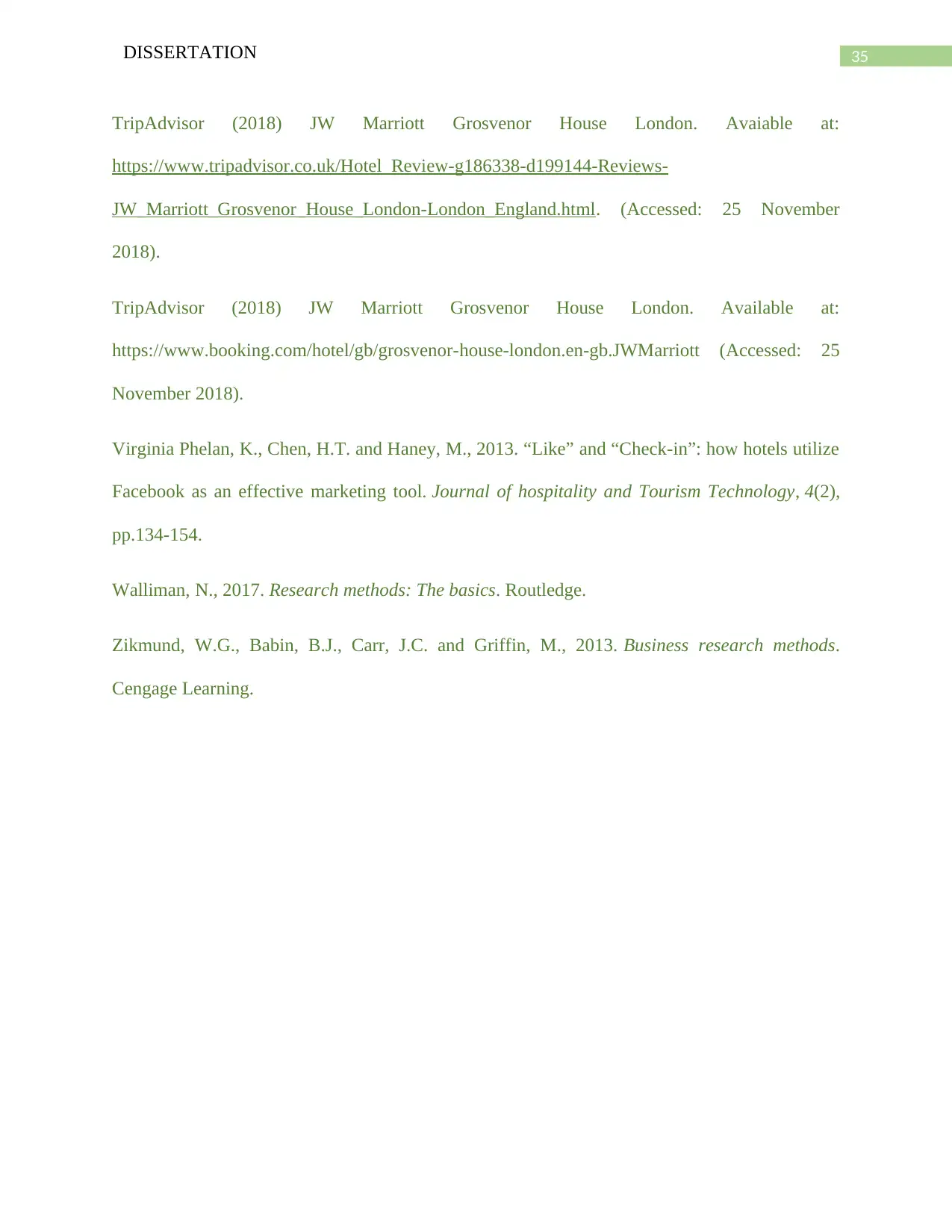
35DISSERTATION
TripAdvisor (2018) JW Marriott Grosvenor House London. Avaiable at:
https://www.tripadvisor.co.uk/Hotel_Review-g186338-d199144-Reviews-
JW_Marriott_Grosvenor_House_London-London_England.html. (Accessed: 25 November
2018).
TripAdvisor (2018) JW Marriott Grosvenor House London. Available at:
https://www.booking.com/hotel/gb/grosvenor-house-london.en-gb.JWMarriott (Accessed: 25
November 2018).
Virginia Phelan, K., Chen, H.T. and Haney, M., 2013. “Like” and “Check-in”: how hotels utilize
Facebook as an effective marketing tool. Journal of hospitality and Tourism Technology, 4(2),
pp.134-154.
Walliman, N., 2017. Research methods: The basics. Routledge.
Zikmund, W.G., Babin, B.J., Carr, J.C. and Griffin, M., 2013. Business research methods.
Cengage Learning.
TripAdvisor (2018) JW Marriott Grosvenor House London. Avaiable at:
https://www.tripadvisor.co.uk/Hotel_Review-g186338-d199144-Reviews-
JW_Marriott_Grosvenor_House_London-London_England.html. (Accessed: 25 November
2018).
TripAdvisor (2018) JW Marriott Grosvenor House London. Available at:
https://www.booking.com/hotel/gb/grosvenor-house-london.en-gb.JWMarriott (Accessed: 25
November 2018).
Virginia Phelan, K., Chen, H.T. and Haney, M., 2013. “Like” and “Check-in”: how hotels utilize
Facebook as an effective marketing tool. Journal of hospitality and Tourism Technology, 4(2),
pp.134-154.
Walliman, N., 2017. Research methods: The basics. Routledge.
Zikmund, W.G., Babin, B.J., Carr, J.C. and Griffin, M., 2013. Business research methods.
Cengage Learning.
1 out of 36
Related Documents
Your All-in-One AI-Powered Toolkit for Academic Success.
+13062052269
info@desklib.com
Available 24*7 on WhatsApp / Email
![[object Object]](/_next/static/media/star-bottom.7253800d.svg)
Unlock your academic potential
© 2024 | Zucol Services PVT LTD | All rights reserved.




